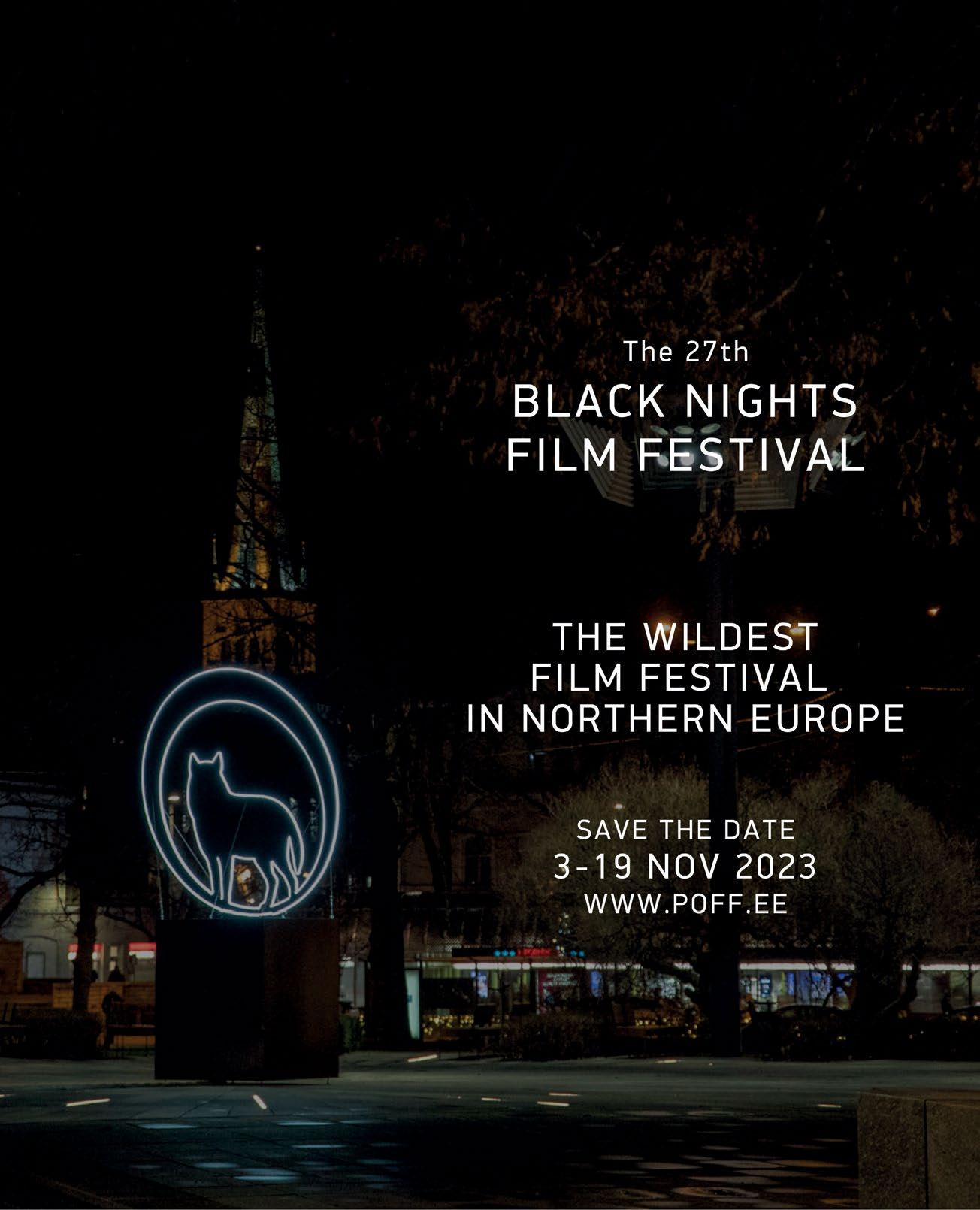




The centenary of Estonian, Latvian, and Lithuanian independence in 2018 marked a new chapter for the film industry in each country - this anniversary helped make Baltic films more popular locally and increased their visibility around the world. The Baltics are valuable and reliable partners, and the industry is growing across the region.

Itis 111 years since the screening of the very first Estonian film in the cinema. Estonia values its world class filmmakers very highly and has a rich variety of films and international awards under its belt. Estonians have kept their filmmaking alive through many challenging times. Today, with the local market share of admissions at 20,8%, the Estonian film industry is riding high, and audiences very much appreciate what they see.
In this special edition of our magazine, we have put a focus on director Anna Hints’ latest documentary Smoke Sauna Sisterhood that premiered at Sundance in January, and a rather daring interview shines a light into the intriguing topics of the film.
2023 will be also an especially great year for Estonian animation. Sander Joon’s Sierra is shortlisted for the Oscar race. The Estonian-Croatian co-production Eva, directed by Morten Tšinakov and Lucija Mrzljak is in the Short Film Competition in Berlin. The Company Matching programme at the EFM co-production market includes an Estonian company Amrion, run by producer Riina Sildos. She also has a co-production animation in the competition in the Berlinale Generation Kplus Programme - A Greyhound of a Girl – and one of the co-producers is also from Latvia.
The history of Latvian cinema stretches back to the early 20th century. It was only a little over 30 years ago, however, that Latvian cinema could rejoin the Europe film industry from which it had been separated for half a century by the Soviet occupation. The film history of Latvia includes personalities like radical avant-garde filmmaker Sergei Eisenstein, whose talent was nurtured in the multicultural Riga of the early 20th century.
The 1960s, on the other hand, saw the birth of a strong documentary film movement influenced by European modernism that has since become emblematic of Latvian cinema. Since regaining independence in the early 1990s, Latvia has established its global competitiveness and can rightfully be considered a country with a strong tradition of animation and documentary filmmaking.
There are currently five animated feature films in production, which is a significant number for a country
of 1.9 million people. Latvian narrative feature films are also securing increased visibility. A great example is January by Viesturs Kairišs, which won top prizes at the Tribeca, Rome, and Warsaw film festivals in 2022. In Berlin, Eastern Front by Vitaly Mansky and Yevhen Titarenko, will be premiered at the Encounters programme.
Over the course of its existence, Lithuanian cinema has explored new narratives while drawing on deep-rooted traditions. Documentary filmmaking has always been a strong part of Lithuanian cinema identity, epitomised by such names as the godfather of the avant-garde cinema Jonas Mekas, and the explorer of poetic time and humanity Audrius Stonys. This strong documentary trend is alive to this day as the new generation of documentarists push the boundaries to explore their worldview. And international audiences and juries are taking note of it too – we’re delighted to see Lithuanian cinema being recognised at such events as the Cannes Film Festival and the European Film Awards where the film Mariupolis 2 by the late Mantas Kvedaravicˇius won impressive awards. Recent Lithuanian features are recognised as well - Pilgrims by Laurynas Bareiša won the Best Film Award in the Venice Orizzonti Programme, and Slow by Marija Kavtaradze just had its world premiere at the Sundance Film Festival. It is hugely gratifying to see all our films getting attention internationally. The Baltic States being selected as focus countries at this year’s European Film Market is an immense opportunity to let the world see our countries as the unique, versatile, and individually authentic places they are. We’re thrilled to invite you all to discover the potential of the Baltics and our film industries. BF
Dita Rietuma National Film Centre of Latvia Laimonas Ubavicˇius Lithuanian Film Center Edith Sepp Estonian Film Institute Photo by Erlend ŠtaubFriday Feb 17th
15:00-16:00
Friday Feb 17th 21:30
The vibrant film scene of the three Baltic states will present itself from a variety of perspectives at the Berlinale’s EFM 2023. The main program will provide many opportunities to network with Baltic producers, distributors, investors, and creators and to get to know Baltic productions and co-productions.
Baltic Producers’ Spotlight + Happy Hour (MGB)
Meet the upcoming producers from Estonia, Latvia and Lithuania. Twelve selected talents will be presented within the framework of a Happy Hour.
EFM Opening Reception co-hosted by the Baltic countries (Kuhlhaus)
The traditional Opening Reception of EFM is co-hosted by the Baltics. Come and meet the Baltic representatives and enjoy Baltic music, food and drinks (by invitation only).
Saturday Feb 18th
13:00-14:00
Sunday Feb 19th
12:30-14:30
Sunday Feb 19th
17:00-18:00
Monday Feb 20th
11:15-12:15
Monday Feb 20th
14:00-18:00
Monday Feb 20th
12:00-14:30
Tuesday Feb 21st
14:00-15:30
Baltic Lunch at Co-Production Market (House of Representatives)
Lunch hosted by the Baltics and a good chance to meet the Baltic producers in the Visitors Programme of the Berlinale Co-Production Market. (Co-Production market participants only)
Baltic Producers’ Lunch at EFM
Baltic Lunch will have a focus on producers, mostly involved in the production of feature fiction films (by invitation only).
Baltic Producers’ Happy Hour ((Baltic stands at MGB)
Lithuanian Film Centre together with Baltic Film & Creative Tech Cluster, The Film Producers’ Association of Latvia and Estonian Film Industry Cluster invite you to network with the Baltic producers.
Country Session
Co-Production Market (House of Representatives)
Public funders and representatives from the Baltics will give short overviews and answer concrete questions on co-producing with and accessing financing in their country.
Public Fund meetings
Co-Production Market (House of Representatives)
Pre-scheduled 20-minute one-on-one meetings with public film funds from the Baltics. (Co-Production market participants only)
Baltic Doc Rough Cut Presentation (Gropius Bau Cinema)
Six upcoming documentaries from the Baltics will be presented at a 90minute session. The presentations are followed by coffee and networking.
Baltics Series Market Showcase
Within the framework of this year’s Berlinale Series Market, a Baltic event will highlight the Baltic countries’ strengths in serial content.
32
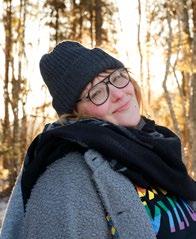
35
36
38
44
Baltic
Eda Koppel
Maria Ulfsak, Gabija Pluke, Dita Rietuma, Agnese Zapane, Kristıne Matısa
Contributing
Contributors: Andrei Liimets, Neringa Kažukauskaite, Kristıne Simsone, Peep Pedmanson, Tristan Priimägi, Dita Eks
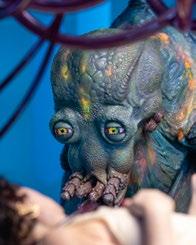
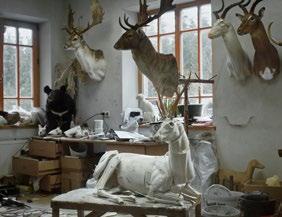
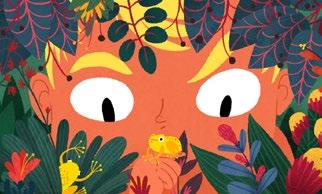
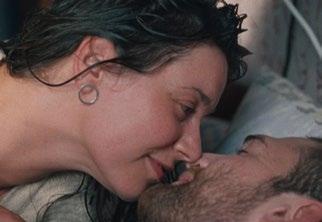
Translation: Maris Karjatse, Gabija Pluke, Jule Mare Rozıte
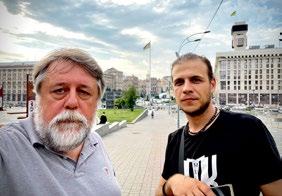
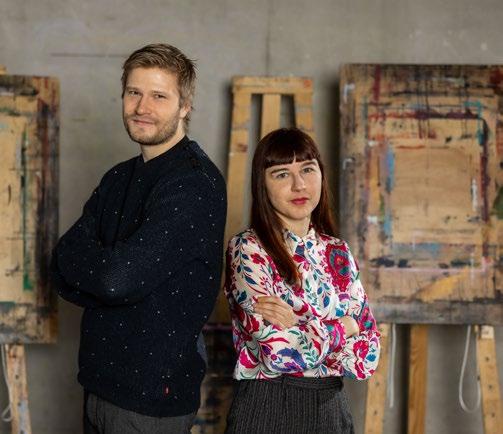
Vitaly Mansky’s latest film Eastern Front (Austrumu fronte) is a collaboration with Ukrainian filmmaker Yevhen Titarenko and has been selected for the 2023 Berlinale’s competitive section Encounters.
By Kristı¯ne Matı¯saEastern Front is just one of the latest examples of a process that has been developing steadily over many years, namely the cooperation between Latvia and Ukraine in the documentary field.
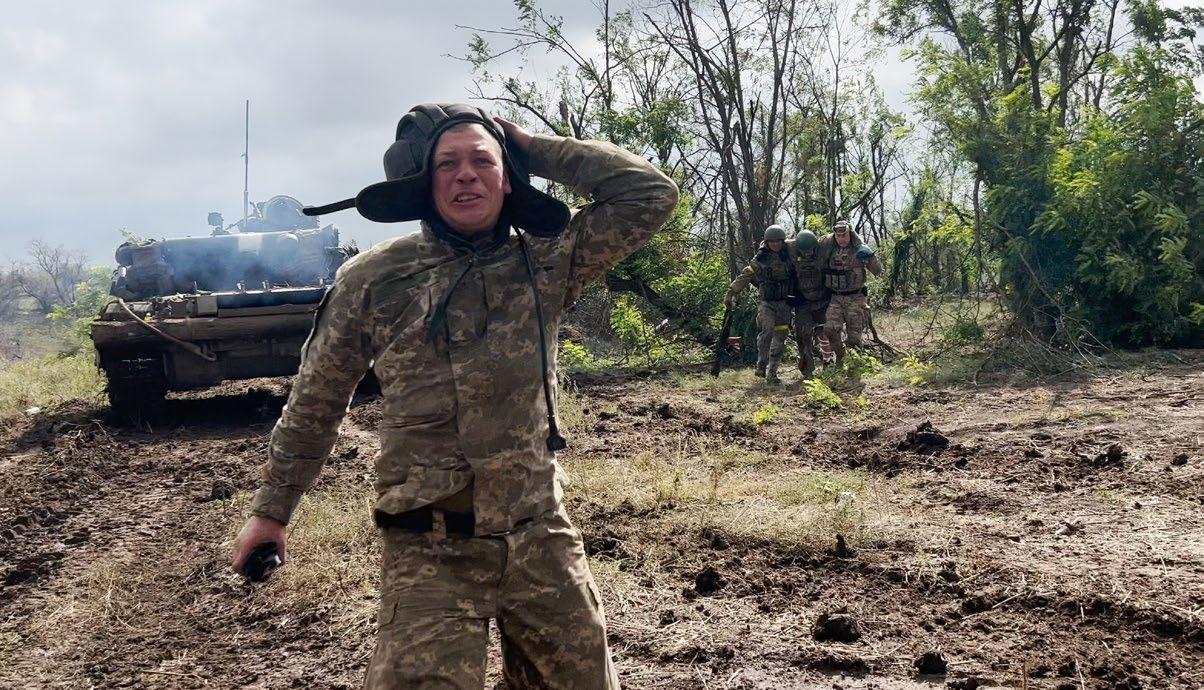
Born in Lviv, Ukraine, director Vitaly Mansky (1963) has been living and working in Latvia since the end of 2014. He has, however, participated in theoretical documentary film conferences in Latvia
since the late 1980s. Mansky has been making films that have received international acclaim since the early 1990s, but has never previously worked with a co-director. In Eastern Front, Mansky’s experience is complemented by young Ukrainian director Yevhen Titarenko’s starkly documentary, diary-type footage from inside the brutal war in Ukraine. The two directors got to know one another in 2020, when Titarenko’s film War for Peace caused a scandal and provoked a

backlash from the authorities at Mansky’s documentary film festival ArtDocFest, which at that time could still take place in Russia. The director had spent a year in Ukraine working as a paramedic volunteer in a military conflict zone and filming whenever possible. This resulted in a rare and honest documentation of a brutal war that continues in Europe still today. Titarenko now calls himself a medical battalion veteran and has not stopped filming, gathering material for a new film.
Mansky and Titarenko met in Latvia in the summer of 2022, where Titarenko had come to drive donated cars back to the front. He showed Mansky the material he had filmed for his “war diary” and eventually invited him to co-direct the film. Eastern Front is thus made up of two equally impressive layers: the harsh documentary footage of the war, often shot with the most rudimentary image capture techniques, and scenes and conversations filmed by Mansky’s team behind the front lines. Here, other facets of the film’s characters reveal themselves and death is not standing as closely by yet has clearly affected the world around them.
Mansky has already dedicated several internationally acclaimed documentaries to his native Ukraine. In 2004, for example, he made the documentary Gagarin’s Pioneers (Наша Родина), searching in different countries for 30 of his classmates from Lviv, and exploring how the concept of “homeland” has
changed as the Ukrainian nation was taking shape. The most personal of Mansky’s films dealing with Ukrainian sovereignty is Close Relations (Родные, 2016), which was made in collaboration with the Latvian studio Ego Media. When the Russian invasion began in 2014, the director set out to film his extended family in Ukraine. They were scattered across the country, and through the varied fates of one family the film gives a comprehensive overview of ordinary people’s attitude to the dramatic course of contemporary history. This film creates a personal, human take on the complex emergence of contemporary Ukraine, its national confidence, and sense of belonging. Close Relations touches on interpretations of historical events and on the fear of being physically drawn into a real war. The film thus explains the roots and nature of the current “second war”, revealing how radically different opinions, influenced by

different ideologies can exist concurrently within the same family, and how this was exploited by the aggressive neighbour, Russia.
Several other Latvian documentary filmmakers also have close links with Ukraine. One example is producer Ilona Bičevska who co-produced Ukrainian director Alina Gorlova’s film This Rain Will Never Stop (Цей дощ ніколи не
by Yuliia HontarukThe Blessed Ones by
 Andrii Lysetskyi
Andrii Lysetskyi
скінчиться, 2020) in the studio Avantis Promo. The film won an award at IDFA for Best First Appearence, and numerous awards at other festivals. Director and producer Una Celma is currently assisting Maryna Nazarenko with her film Women Without Men. Nazarenko is a filmmaker from Ukraine who has recently arrived in Latvia, and who wants to document other female Ukrainian refugees in Latvia that share her fate. Production company VFS Films has the most extensive and longest-standing collaboration with Ukrainian filmmakers. The international co-production Ukrainian Sheriffs (Українські шерифи, 2016) by Roman Bondarchuk went on to became Ukraine’s Oscar entry for Best Foreign Language Film. On the surface, it is an unassuming story about a small village in southern Ukraine near Kherson, where

ate a completely different, unique mission for the artists, motivating the conviction that anyone can be useful to their homeland, even if they are not trained soldiers.
Latvian documentary filmmakers are guided by a similar conviction. The most useful contribution they can make to Ukraine’s fight against the aggressor and to the security of the whole of Europe today is to provide professional support and assistance. They aim to strengthen the Ukrainian film industry, and to jointly produce films that tell the world important stories about the strength of the nation’s spirit. EF
people’s faith in the future is condensed as if in a drop of water in difficult times of change. The film is currently available to watch in the IDFA collection.
The studio is currently co-producing two films by Ukrainian filmmakers. Both projects are also at the European Film Market at Berlinale. One of them is Company of Steel (Залізна Сотня) by director Yuliia Hontaruk, who is part of the well-known documentary collective #Babylon’13. The film tells the story of young men who are already war veterans. They first went to war as volunteers in 2015 after Russia annexed Crimea, returned in 2017 and tried to integrate into civilian life, but re-joined the war in 2022 seeing it as their civic duty. This film is not about war, however, but about how people change when war comes to them.

The second project is the documentary The Blessed Ones (Блаженнi) by Andrii Lysetskyi. In the film, several Ukrainian artists and a filmmaker embark on a journey to look for the answer to a question that was once unimaginable: what is the artist’s role in a war? The protagonists are young and talented artists who have received Ukraine’s highest contemporary art awards. They now have to put their own art aside to rescue famous 20th century Ukrainian masterpieces from shelling and barbaric destruction. At the same time, these artists continue to create, entering buildings destroyed by bombs and in a way consecrate the ruins, turning them into new works of art –one works with broken glass, another with rubble. The locals see this as an opportunity to spiritually free themselves from the evil inflicted by the occupiers. It turns out that the reality of war can cre -

Latvian documentary cinema has a long, rich history. It is defined by an intensive period of cultural and historical newsreels in the 1930s and a vibrant “new wave” in the 1960s when a new generation of filmmakers cultivated new ways of thinking and new attitudes towards the essence of documentary cinema. The directors and cinematographers from this time include Herz Frank, Uldis Brauns, Aivars Freimanis, and Ivars Seleckis. Together with others of their generation, they developed the poetic documentary movement that focused on the human being and imbued the process of documenting with a soul. Similar processes also took place in Lithuania and Estonia during this period, as shown by the internationally acclaimed co-production by the three countries, Bridges of Time (Laika tilti, 2018), directed by Kristı ne Briede and Audrius Stonys that is dedicated to classic Baltic documentary films.
Director and cinematographer Juris Podnieks gave Latvian documentary film an even broader international dimension. It was Podnieks who first captured the attention of the international community with his bold and honest cross-section of life seen through the eyes of young people Is It Easy to Be Young? (Vai viegli bu¯t jaunam?, 1986). With the support of European broadcasting organisations, he later documented the collapse of the Soviet empire from all the political hotspots in the late 1980s and early 1990s.
After Latvia regained its independence, the country’s film industry sought to integrate into the European film scene by gaining experience and skills in international coproduction. Today, several Latvian film studios are successfully working in the international documentary arena, helping both Latvian and other stories reach a wide audience.
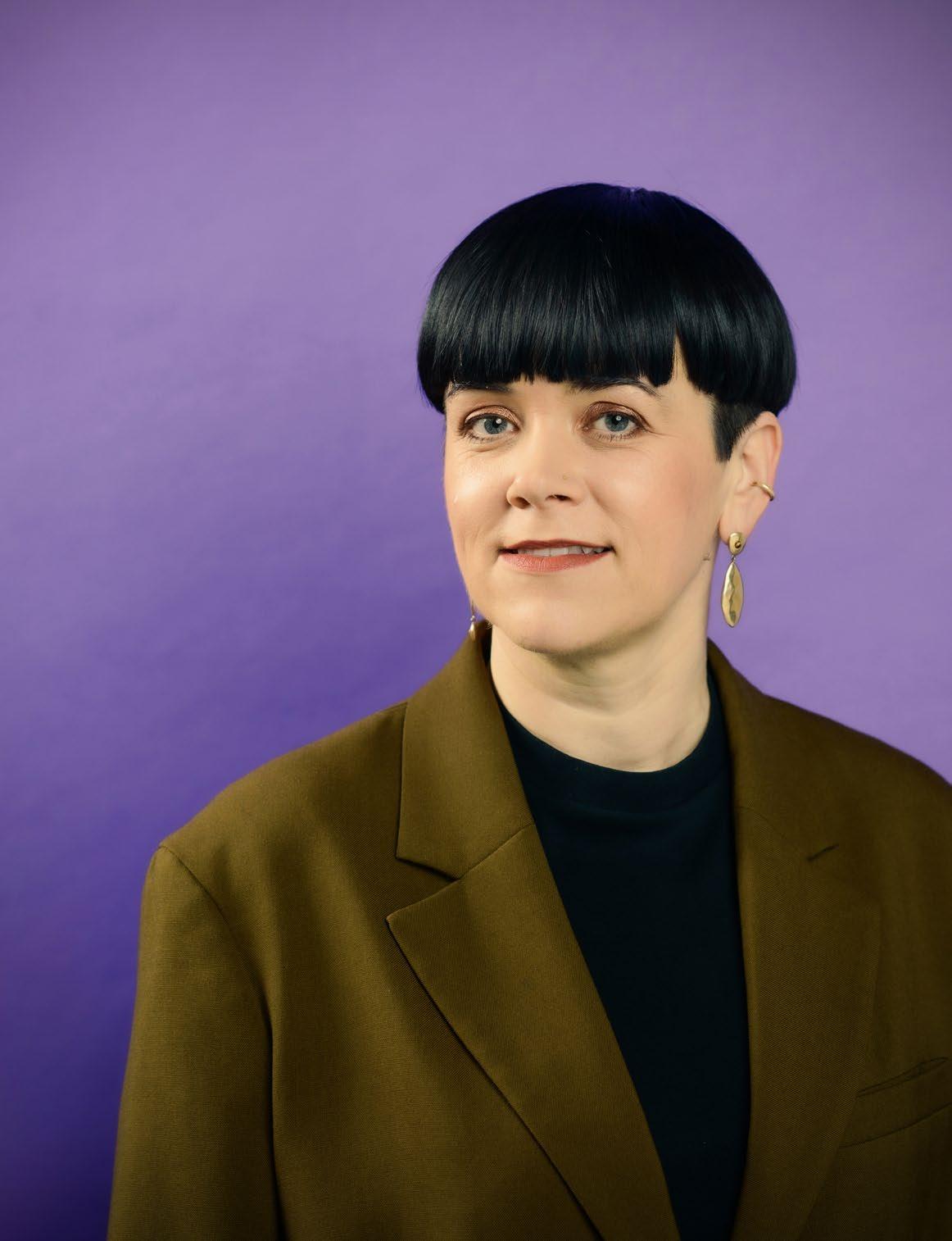
1The company’s priority at the moment is finalising the financial structure of the feature film Blue Blood directed by Juris Kursietis, the production of the film is planned to start in the fall of 2023. After the premiere of the director’s previous film Oleg at the Director’s Fortnight in Cannes, this film is a bold next step for the director. Blue Blood is planned as a co-production between Latvia, Poland, and Germany.
I have always been fascinated with discovering new talent, therefore, I am currently actively working on several debut films. Among them is the debut film Youth Eternal by director Armands Zacs, which participated in script workshop Midpoint Feature Launch 2022. Currently, the director Anna Ansone’s debut film Summer Blues is in development stage, which is planned as a co-production of Latvia, Germany, and Lithuania. Both of these directors have already proven their talent and determination in filmmaking, so a feature debut is the next logical step in their careers.
White Picture is also in post-production with Estonian, Latvian, Greek, and Finnish co-production The Invisible Fight by Rainer Sarnet, and with the Dutch and Latvian co-production The Book Of Everything by Ineke Houtman. Both of these projects have received Eurimages support.
2My priority for participating in the Berlinale EFM is to find additional financing for Juris Kursietis’ Blue Blood, as well as to attract possible sales agents and festival interest in the company’s debut film slot. I will pay special attention to the projects that are selected for the Berlinale Co-Production Market - I am particularly interested in art-house films, which appeal to topic or story wise. And I am looking for projects which could be interested in bringing their physical production to Latvia. I’m open to different countries and combinations of co-production - the main condition is that this cooperation must take place naturally and not be financially forced. My company’s slot of projects for 2023 is full, but we are looking for projects which are planning to go into production in 2024 or 2025.
What are you currently working on?
Your expectations for this year’s Berlinale?
This year, two Lithuanian talents join the Berlinale Talents programme – Milda Baginskaitė and Vytautas Puidokas. In its 21st edition, the Berlin International Film Festival’s talent development initiative Berlinale Talents is all about exploring humour in serious times and appealing to the restorative powers of this universal human trait.
By Gabija PlukeVytautas Puidokas is a freelance documentary filmmaker based in Vilnius, Lithuania. Vytautas has a degree in Media and Film studies from the University of Surrey (UK). His career started in Lithuanian National Television, where he has worked as a scriptwriter and director. Vytautas’ debut feature-length documentary El Padre Medico (2019) premiered in Camden IFF (USA) and was nominated for best documentary in Lithuania. His mid-length film Before They Meet (2021) is part of a six countries co-production Borderline, and has been nominated for the best Flemish docu-series. His films have been screened in festivals around Europe and the USA.
In 2022 Vytautas received the Vilnius International Film Festival award for emerging local filmmaker. Apart from documentaries, Vytautas also creates music videos and video installations. His work covers topics related to migration, history, and identity.


Currently Vytautas is working on a feature-length documentary about addiction Abandoned, and a collaborative doc Blue / Yellow about Lithuania’s help for war-torn Ukraine.
“As crazy as it sounds, it will be my first time in Berlinale, so I am very careful with any expectations,” says Vytautas. “However, every film event is a possibility to push forward your old projects, come up with new ones, and most importantly meet like-minded people who might accompany one in the future.”
Milda Baginskaitė is a Lithuanian screenwriter, director and theatre maker based in the UK. Milda’s work focuses on themes of identity, culture, and coming-of-age narratives. Her short films have screened and received awards at several international Oscar and BAFTA qualifying film festivals. Milda’s projects have been backed by BBC Arts, BFI, Creative England, Girls in Film, and others. She is a selected member of BAFTA Connect and Directors UK. Milda is currently developing serial content with a Warner Bros Discovery Production Company and writing her first feature length film.
“I am currently in post-production of my latest short Lia IRL funded by Mintworthy project. As a TV show co-creator, I am developing a drama series that has recently been optioned by a Warner Bros Discovery production company,” says Milda. “With a few successful shorts under my belt, my goal is to move from shorts to features. As well as writing and developing a feature length script myself, as a director I am attached to a feature film that has already received BFI early development funding and was longlisted for a Netflix first feature development scheme. Although creatively I am established in the UK, I hope to start working in Lithuania soon also.”


When it comes to Berlinale, Milda is looking to find collaborators for her future projects and connect with industry peers as well as promote her latest short film Lia IRL


1Right now, I am working on several active projects which are at different stages. Recently, I completed two shorts which are currently in post-production: Reminiscence by Kristijonas Dirse, and The Secret by Kestutis Drazdauskas. The stories of these films are very different – one is based on historical events, one is a family drama – as are the sensibilities and visual languages of the directors. I feel passionately about making both films and getting them on to screens, and I believe they will find their audiences at festivals and on other platforms.
Another project, Požerskis: In Focus by Joris Skudra, is in production. Požerskis: In Focus is a feature-length documentary about one of Lithuania’s most influential photographers, Romualdas Požerskis. It’s one man’s story that also encapsulates the broader context of the destruction of a country’s culture during the Soviet era, which gave birth to collectives of rebellious artists who fought for independence through their art. I am very proud to be producing this film, as I am a big fan of this photographer, and I believe that now is the perfect time to capture the work of this brilliant artist.
I also have several other projects, including co-productions, in the development and pre-production stages. I hope they will turn into beautiful success stories.
For me, it is important to work with young directors who are trying to find their voice in the industry, as well as to help strong stories reach their audiences. I believe that a producer should be a mentor, guide and supporter, taking responsibility for a film and working with it all the way from development to distribution. The greatest pleasure and reward is to see how it grows.
2I strongly believe in collaboration and partnership. So, this year my expectations are to find solid partners – in production and distribution – with whom we will be able to create long-lasting professional friendships and bring beautiful and moving stories to the big screen. Of course, I also have a personal goal – to grow and become a better producer. I believe that one of the ways to achieve this is to meet new people, discuss and share experiences. That’s my biggest wish.
What are you currently working on? Your expectations for this year’s Berlinale?
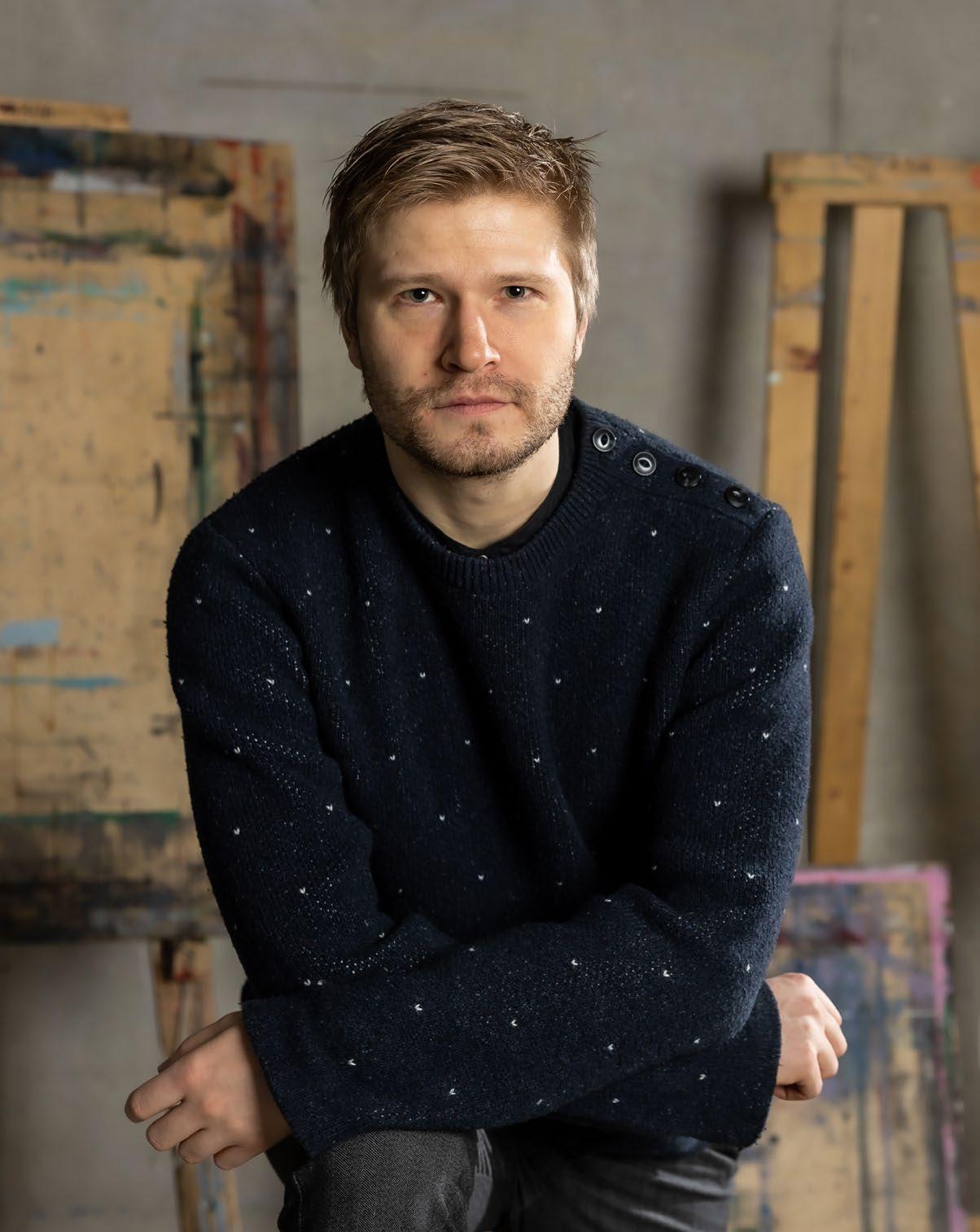
Peep Pedmanson interviewed screenwriter-director Morten Tšinakov about the making of animation film Eva, to be premiered in the Berlin International Film Festival 2023.
By Peep Pedmanson Photos by Erlend ŠtaubEva is the story of a widow whom a group of ordinary men tries to console; however, the woman won’t cope with her grief, loses self-control, and confuses reality and dreams. She feels guilty about her husband’s death, and this burden is heavy and makes things even worse until the inevitable tragic end. This is already the third film for filmmakers Morten Tšinakov and Lucija Mrzljak, Morten being the screenwriter and Lucija the film artist. It is not hard to notice that both the screenplay and the design are remarkably excellent in style in Eva.

Morten, screenplays often change during the working process, and some authors claim that animation comes alive only when the filming starts. As for Eva, the initial screenplay turned out to be the final film almost 100%. How did you manage to do that?
I am rather a slow writer and it may take a year or year and a half until the final version. I collect ideas and then get rid of some of them. One moment, an incomplete story emerges out of these ideas. This is when I start writing and fill the gaps with something that comes into my mind. And several drafts will be written
Evawhich takes quite a long time, and hopefully only the best ideas will prevail. To change things later during filming doesn’t obviously seem the best idea for me, it can be rather dangerous since you can confuse your timeline between getting the initial idea and understanding whether the idea works or not.
Certainly, you’ll finally get a bit tired when for year and a half you keep doing the same thing. And yet, when spontaneously changing things the possibility to
mess something up is much bigger than to make it better. And with Eva we really made very few changes. We decided to cut off one lengthy segment in the film as it slowed everything down too much.
When is the right moment when you realise that the screenplay is ready and filming can start?
With every screenplay it somehow happens that whatever you do then some scenes always seem to be not so good
compared to others. And I don’t know why is that so. And at the same time, the story won’t work without these scenes, so one has to put up with them. We certainly try to iron out the weak points, but it is impossible to get rid of these completely. At some point, you have to decide that it’s ready and good enough, otherwise you will go on with writing forever.
You are both young, yet your films are expressing a resignation based on life’s experience, accompanied by sad, dark humour. These cannot be personal experience of yours? As an author, do you rather work with archetypes relating to a specific era?
When I am writing stories then I try to avoid being focused on a specific “theme” for as long as possible, otherwise I would lose a lot of interesting ideas that won’t fit into one specific frame. I like to invent various sketches and scenes, even the seemingly idiotic and somewhat absurd ones, and later combine these. Some ideas may be taken from personal experience, others are inspired by some sentence I have encountered in a book, and the rest may come from who knows where. For instance, a scene that came to me in a dream later became the basis for Eva, and was filmed exactly the way I saw it. The rest of the film started to develop
around the scene. I cannot exactly say why these ideas usually come in such dark colours. Perhaps hopeless stories seem much deeper to me than happy ones.
There are other authors’ couples in the field of animation, but it is not really very common. How do you divide your tasks with Lucija when working as a team?

It has been the way that I have been busy with writing the story, and when it’s ready then we’ll move on with it together. During writing it also happens that I ask Lucija’s opinion whether one or another thing works or not. Since I have poor drawing skills, then Lucija takes care of everything related to design –and this is especially so in the last film. She designed both the characters and the backgrounds in Eva, and I was responsible for colours, textures, and post-production (shadows, focuses, etc.). When the screenplay is ready then we start working with the storyboard. We sit down with the screenplay and start discussing where the camera perspective should be in every scene, how characters should move, etc. Then we create layouts, and the rest will be on the shoulders of the professional animators and drawers of the animation studio.
Estonia will be represented by two animation films at the Berlin Film Festival 2023. One of them is the 16-minute-long Eva directed by Morten Tšinakov and Lucija Mrzljak, produced by Eesti Joonisfilm (Estonia), and co-produced by Adriatic Animation (Croatia). And the other one is a full-length Luxembourg animation
A Greyhound of a Girl (directed by Enzo D’Alò), where Estonia has been a minority co-producer together with Italy, Ireland, the UK, and Latvia. Whereas the Greyhound is clearly a film for all audiences, then Eva is an excellent example of Estonian art-house animation characterised by high-quality visual design, strong artist’s statement and narrative, and it has had a remarkable success in film festivals.
How long do you usually work to complete a 15-minute-long animation?
It depends on what kind of work is included in the process of filmmaking. The production phase of our films lasts for about year and a half. But this is preceded by the development of the initial idea and working with the screenplay that altogether lasts for four to six years. There are certainly filmmakers who work faster or slower than me.
How do you perceive the meaning and the role of state-funded festival-animation in Estonian culture? Perhaps some culture theorist should be asked this question. I have never had any answers to such questions. If the result has something to do with human values and the film offers solutions within the chaos, then perhaps this is the meaning. And that’s why it is also important, whether it be an animation, a feature film, a documentary, music, literature, or anything else. We are both intrigued and influenced by the genre of animation film, this is our way to communicate with the world. And I am happy that for this we have the professional field and the state support. We try to make our work as professionally as possible so that it would bring joy also for others and not only ourselves. BF
A Greyhound of a Girl - a collaboration between Luxembourg, Italy, Ireland, the UK, Latvia and Estonia – premieres at this year’s Generation Kplus Programme in Berlinale. Estonian co-production company is Amrion, the producer is Riina Sildos, and the production base was the animated film studio Eesti Joonisfilm.
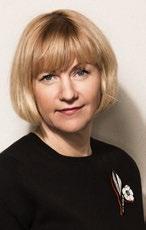 By Peep Pedmanson Photo by Kalev Tamm
By Peep Pedmanson Photo by Kalev Tamm
Riina, how did the film reach you?
I have known Enzo D’Alò, director of A Greyhound of a Girl, for years thanks to the producers Paul Thiltges and Adrien Chef from production company PTD in Luxembourg. Thiltges is also the distributor of the Lotte films (produced in Estonia) in Luxembourg, he has also provided an excellent dubbing in Luxembourg’s official language for the films. They both were also co-producers of the feature film Erik Stoneheart, directed by Ilmar Raag. I knew Enzo D’Alò’s films, produced by PTD, long time ago. When I heard about his new project for the first time, I really wanted to be a part of it. Enzo D’Alò pays extra attention to the quality of
an animation, and being based on my professional experience gained in Eesti Joonisfilm, I was certain that this interesting project will be excellent for them, offering enough challenges. It’s a big honour, and definitely great news that the film has been finally selected to the Generations Kplus programme of this year’s Berlinale.
What kind of criteria should a full-length animation film meet in order to be successful?
Full-length animation and fulllength feature film are not that different. It’s all based on a good screenplay. And since the Luxembourg producers succeeded in obtaining the rights for the excellent children’s book “A Greyhound of
a Girl” by Roddy Doyle, then I was more than sure that the story will become a very touching film that will leave no one indifferent.
What were the biggest surprises during this collaboration project? Despite it being a very big international project, the collaboration was surprisingly smooth and pleasant, thanks to the main production company PTD from Luxembourg with whom we have only positive experience. The logistics of animation was spread into numerous countries and it was clearly a higher art to manage all this. I have to say that excellent manual skills in the field of animation are slowly becoming a rare thing in Europe, and there are only a few companies that are able to carry out the vision of great authors with high artistic quality. Of course we had to run tests and everyone was really satisfied with our work. We can be proud of ourselves that Eesti Joonisfilm still has the skills, even if on a small production volume scale, and that is why we cannot take on big projects without collaboration.
How did the technical part finally come together?
The animating part of the film was carried out with special software, and our animators got trained during the working process, so that was not an issue. Shortage in the permanent staff of animators is a problem – so we had to find additional workforce and that made planning the work flow more complicated and unexpected.

What tendencies did you notice in the overall experience?
I am worried how Estonian animation will survive. Largely thanks to the traditions, Estonian animation is unique in the whole of Europe, and has excellent artistic quality. The staff of Eesti Joonisfilm involves people who have contributed to the field for decades and obtained experience in working with the top animation professionals in the world. If our purpose is to integrate our domestic knowledge and skills into large international productions, then A Greyhound of a Girl is a perfect example of that. BF
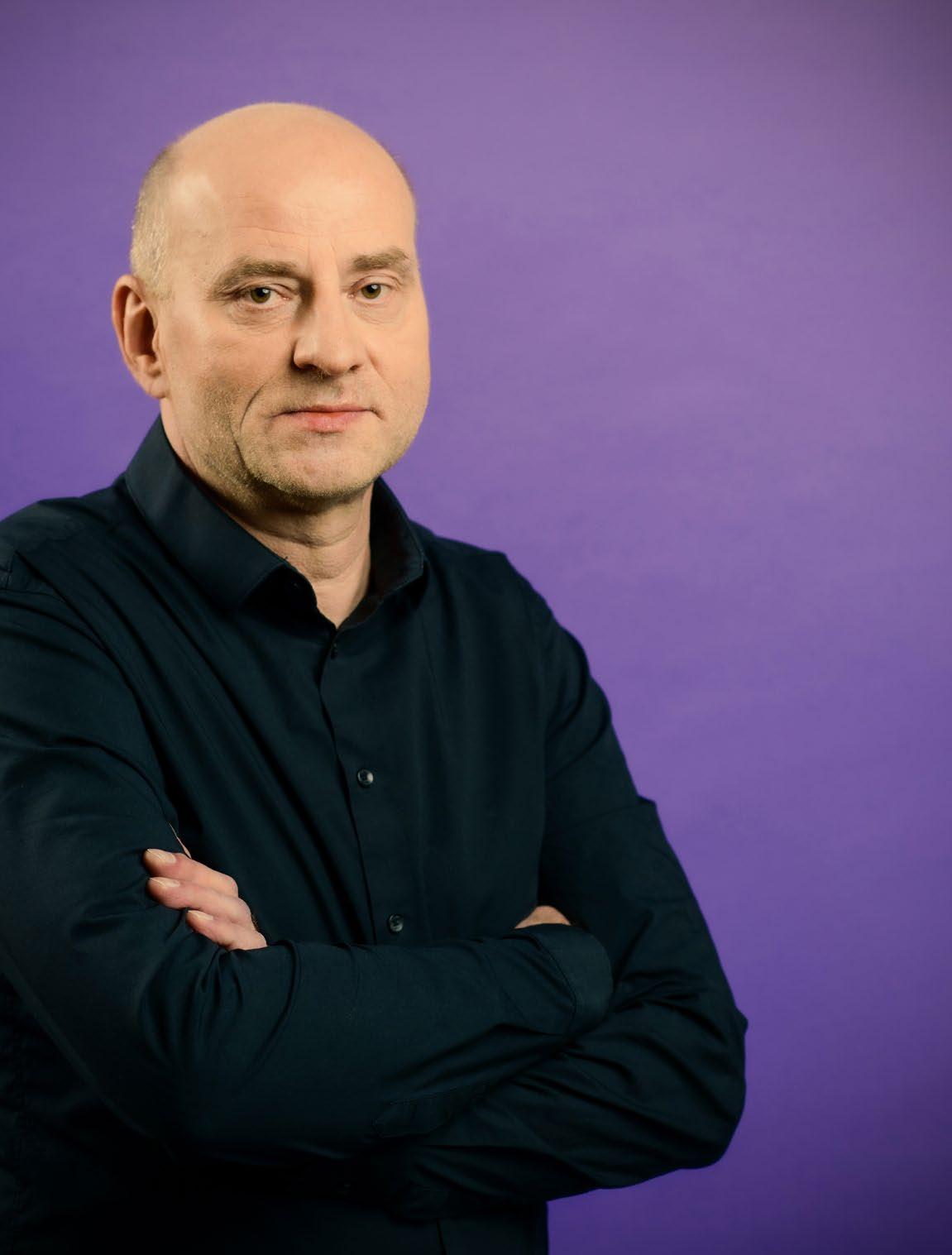
1It’s been a very busy year for us as during summer we shot the debut fiction Black Velvet by Liene Linde, which is a dramedy about an insecure millennial woman pursuing her dream whilst learning how to adult. Some excerpts were just screened in the Works in Progress programme of Industry@Tallinn, where it got the main prize. We are lucky to have the experienced Lithuanian producer Ieva Norviliene on board, almost all the post-production will be done in Lithuania. Another Baltic coproduction Lioness will be shot in early 2023 by Estonian director Liina Triškina-Vanhatalo, produced by Allfilm.
Since we are also working on documentaries, there are some of them which will be released this year, just to mention Death of Death, the ironical quest for immortality and longevity by well known Latvian director Davis Sımanis (a coproduction with Czech Kuli Film), as well as Everything Will Be Alright by Latvian director Stanislavs Tokalovs. It is very personal and mind-blowing portrait of his own Russian family stuck in the past.
What are you currently working on? Your expectations for this year’s Berlinale?
Regarding new projects, currently we are putting together the international producers’ team behind a new project by award winning director Viesturs Kairišs. His new film Ulya will about a giant girl who is brought from the wild countryside to the world of professional sport, it’s a coming-of-age story about the fight to be accepted by other people, and most importantly, by yourself.
2First of all, I expect to experience the atmosphere of the real live festival we missed so much during the last couple of years, and seeing the faces of our friends and colleagues. Of course, we are also looking for festivals to release our films as well as for new partners for production and sales. Nevertheless, we can’t ignore the fact that world has changed and among many concerning issues there is the brutal Russian aggression against Ukraine still taking place, so we really have to concentrate on stories and films which are important right now, and it doesn’t matter if it’s arthouse or entertainment.
1I freshly completed the ambitious short film Weight of Light, directed by Anna Hints, a journey which already started in 2019. However, just a few weeks after the main financing was confirmed the world was immersed in coronavirus, and for a long time it was unclear how to tackle this challenge. Thanks to an enormous amount of work, tremendous effort, and a bit of luck we finally reached the set in Delhi in spring 2022.
The film was born from a collaboration between Estonia and France, and it walks the line between fiction and documentary in order to tell the untold stories of women who belong to the ragpicking community. With directors-screenwriters Anna Hints and Tushar Prakash we are also in pre-production with a short film Sauna Day that will be shot this summer. This year is a special one for me because my first projects as a co-producer and a service producer will go into production. A Finnish-Estonian feature film Missile starts shooting in February and I am really excited about working with director Miia Tervo and producers Kaisla Viitala and Daniel Kuitunen from Komeetta. Missile is a story about setting borders and standing up for oneself, both on a personal and universal level. As for the projects in development, one really close to my heart is Rise of the Water Fox, written and directed by Carlos E. Lesmes. It’s a coming of age comedy about a teenager called Agnes who feels that the whole world is against her. She finds consolation and sup port in her grandmother who lives in a retirement home, its other quirky residents, and surprisingly, in kung fu.
Other projects currently in the pipeline are a sci-fi drama Beatrice, written by Małgorzata Piłacinska and directed by Vallo Toomla. And a tragicomedy At Your Service directed by a promising upcoming director German Golub, and written by the award-winning duo Andris Feldmanis and Livia Ulman. Then there is also The Solstice directed by Katrin Tegova - a drama with a pinch of dark humour, that is dealing with family relations.
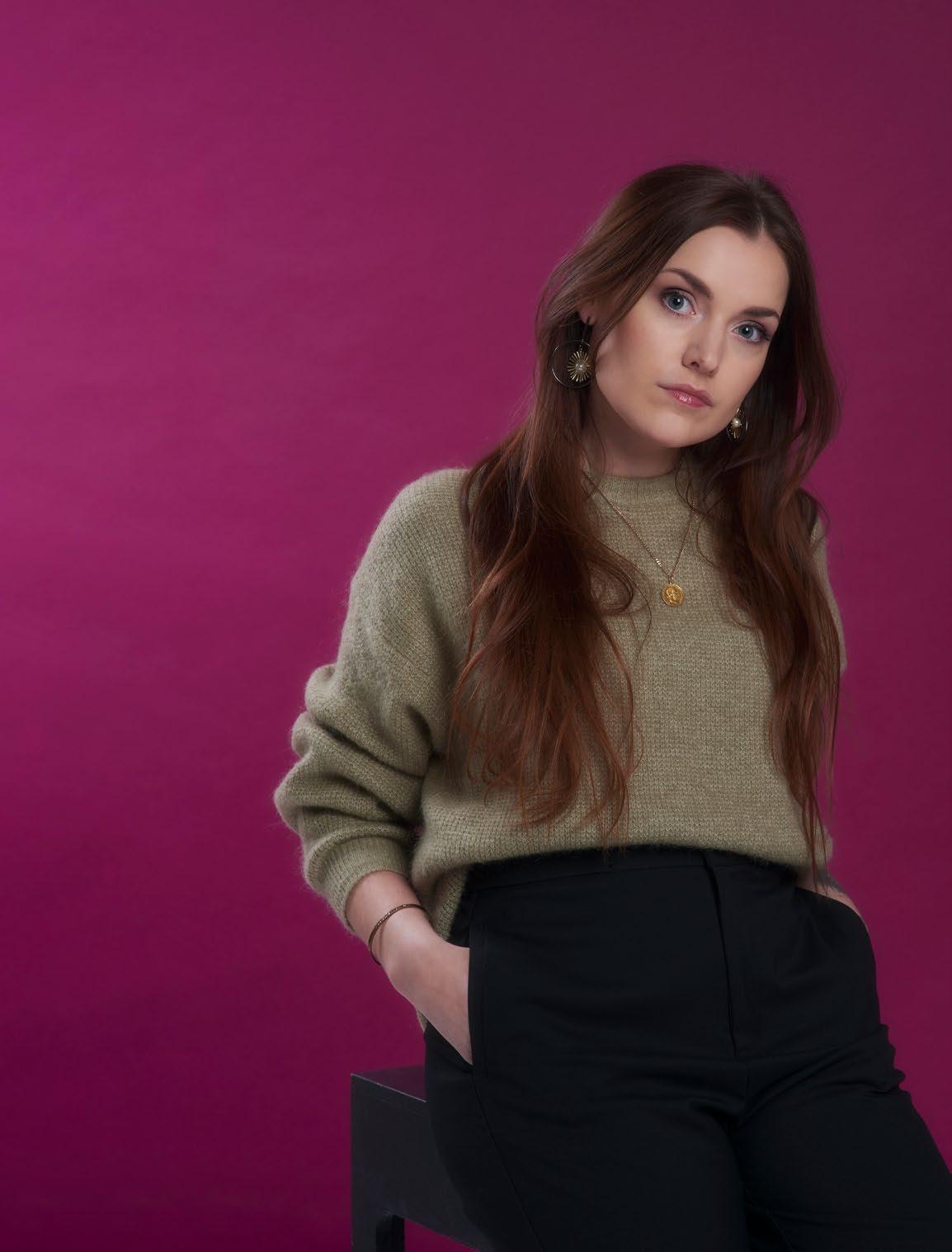
2Despite being selected for the Visitors Programme of the Berlinale Co-Production Market two years in a row now, I have not yet visited EFM, as the previous events took place online. Therefore I am really excited to be physically present for the first time and hope to create new contacts in order to expand my network and find the best possible partners for my projects in development.
What are you currently working on? Your expectations for this year’s Berlinale?
Well-known Latvian director Dāvis Sīmanis is currently working on the feature film Maria’s Silence (Marijas klusums).
By Dita Eks Photos by Lauris AizupietisThe film tells the story of the internationally renowned Latvian-born actress Marija Leiko (1887–1938), who rose to fame in Germany in the 1920s and starred in several films by wellknown directors. Leiko’s life was tragically cut short in Moscow in 1938, when she was killed during the Stalinist repressions together with other actors and staff from the Latvian theatre Skatuve.


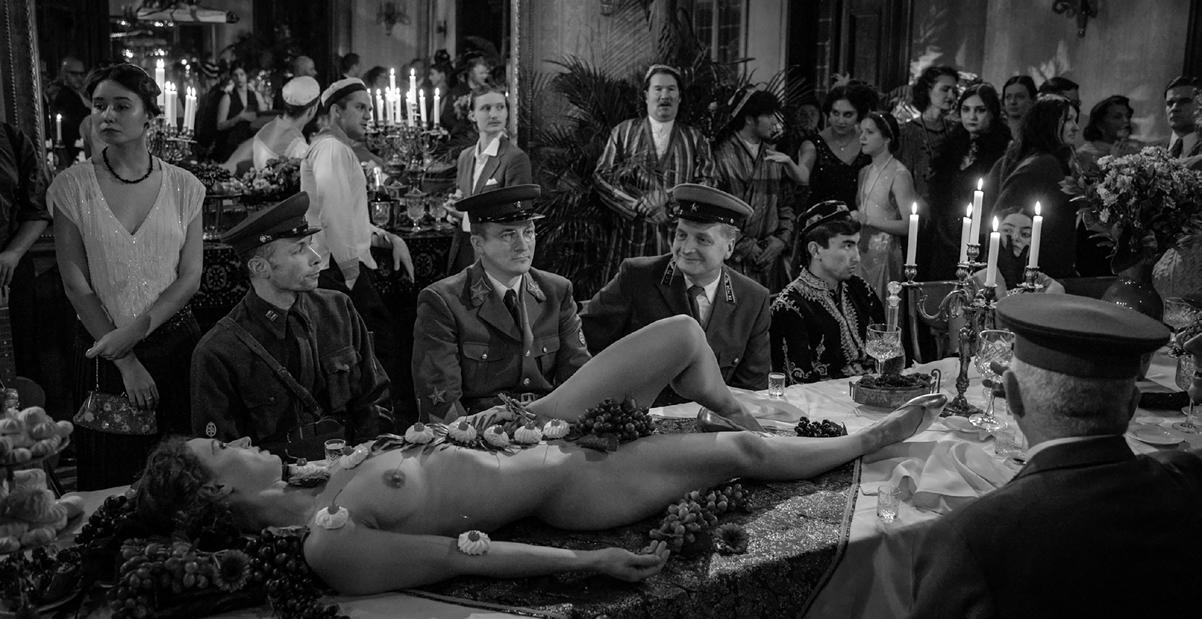
Sīmanis has always been interested in the interplay between strong personalities and history as can be seen in his previous internationally acclaimed films The Year Before the War (Gads pirms kara, 2021), The Mover (Tēvs Nakts, 2018), and Exiled (Pelnu sanatorija, 2016). Maria’s Silence shows the senselessness of the repressions carried out by totalitarian regimes, and their total disregard for the individual, in essence it portrays a collec-
tive unravelling of sanity. The film is also a specific historical tribute to a woman who embodies the tragic events of the 20th century. “The film was envisioned as a historical reminder, but the subject has suddenly gained urgency because of the way in which history is currently repeating itself – the brutality of the Russian regime, the concentration of power, and internal repressions. It is very disturbing that this is the right course of history in Russia’s mind, and that aggression is the only way in which to uphold the regime. It is quite alarming. Looking at historical figures, you can also draw parallels between the enforcers of Putin’s and Stalin’s regimes,” explains Sīmanis.
The film portrays the last few years of Marija Leiko’s life, from 1936 to early 1938 in Moscow. After her daughter died in childbirth, Leiko came to Moscow from Germany to take care of the baby. High-level KGB agents, “chekists”, persuade Leiko to stay in Moscow to restart her acting career. She seizes the opportunity and becomes an actress at Skatuve, the Latvian theatre in Moscow, effectively signing her death warrant. When mass operations targeting specific nationali-



ties in Russia began (like Latvians, Poles, Germans, Estonians, etc.), she is shot together with 21 other employees of the Skatuve theatre.

The film also illustrates Leiko’s life through flashbacks of her work in German theatres and films. She worked with F.W. Murnau, Fritz Lang, Erwin Piscator, and Bertolt Brecht, but the high point of her career were the roles she had in several German expressionist films. Leiko left Latvia in 1907, first living in Copenha-
gen, then acting in theatres in Vienna. From 1912, she worked as an actress in Berlin. After working in the theatre, she took on a series of film roles until the late 1920s. The best-known film Leiko starred in is Satan (Satanas, 1919) by the great German director F. W. Murnau. She worked extensively with Johannes Guter (or Jānis Gūters), a Latvian-born film professional working in the German film industry, and they ended up having a daughter together, Nora. Thanks to Leiko, many Latvians became part of the German intelligentsia during the Weimar Republic – the director Asja Lācis, for example, who was close to philosopher Walter Benjamin and critic Bernhard Reich, and later also directed plays at the Skatuve theatre.
The character of Marija Leiko is played by Olga Shepitskaya. Starring in other roles are Artūrs Skrastiņš, Ģirts Ķesteris, Vilis Daudziņš, Inese Kučinska, Inese Pudža, etc. The cinematographer of Maria’s Silence is Andrejs Rudzāts and the art director is Kristīne Jurjāne. The film, planned to premiere in 2024, is produced by Gints Grūbe and Inese Boka-Grūbe from Studio Mistrus Media. BF

The film was envisioned as a historical reminder, but the subject has suddenly gained urgency because of the way in which history is currently repeating itself –the brutality of the Russian regime and the concentration of power.
What are you currently working on? Your expectations for this year’s Berlinale?

1My current focus is Für Irena, a feature documentary in post-production. The film follows the last years of an extraordinary woman, Lithuanian theatre scholar, Germanist professor, and Holocaust survivor Irena Veisaite, who dedicated her life to building bridges between different nations, cultures, and religions. Irena lost two mothers – one Jewish, killed by the Nazis, the other Catholic, the saviour who took her in and was sent to the Soviet Gulag; she suffered from two totalitarian regimes, yet she never lost the belief that even in the most difficult circumstances it is possible to preserve one’s humanity. This project, which I am also directing, is incredibly important to me; being inspired by Irena’s personality I started to film her, and then unfortunately Irena passed away. The film has become a personal journey for me since, both as a rediscovery of the scale on which the Holocaust took place in my own country, as well as a way to process the current horrors of war in Ukraine; that which seemed to be a distant past became the present in the blink of an eye. I am joined by Pille Rünk (Allfilm, Estonia) and Martichka Bozhilova (Agitprop, Bulgaria) as co-producers. Long-term collaborator Danielius Kokanauskis (winner of IDFA for Best Editing 2021) is editing and Eitvydas Doškus is DOP, together with Rimvydas Leipus and Rein Kotov. Besides our national funds, the project has received Eurimages and Creative Europe MEDIA support.
In addition, I have three feature documentaries in development. Yalla Yalla Bro observes life inside a former-prison-turned-migration centre, in a small Lithuanian town on the Belarusian border. Having seen so many people stuck in this unlikely place compelled director and cinematographer Mindaugas Survila (The Ancient Woods) and I to get to know the centre and its inhabitants, especially since the current migration crisis is completely unprecedented in Lithuania. I have great faith in Survila’s poetic and highly cinematic sensibility, and am confident that his author approach to the subject will be unique.
In the second project, The Reappearance of Antanas, a man turns up at the Lithuanian Embassy in Moscow. He turns out to be a once-famous Lithuanian television sports commentator who disappeared mysteriously in 1990’s Russia and was declared dead. As producer-director, I am very excited by this astonishing real-life detective story which has the hallmarks of a Chekov play.
Double Self Portrait, by emerging director Aiste Stonyte, is a road movie about one of Lithuania’s most fascinating photographers Virgilijus Šonta, whose work is only now being discovered, and the key to understanding the tragedy of his double existence has been found in his photographs. It’s a subtle and intimate story whose themes of political suppression, artistic expression and identity are very close to my heart.
2My expectations for this year’s EFM is to increase the visibility of Baltic productions, strengthen international ties, and find potential collaborators.
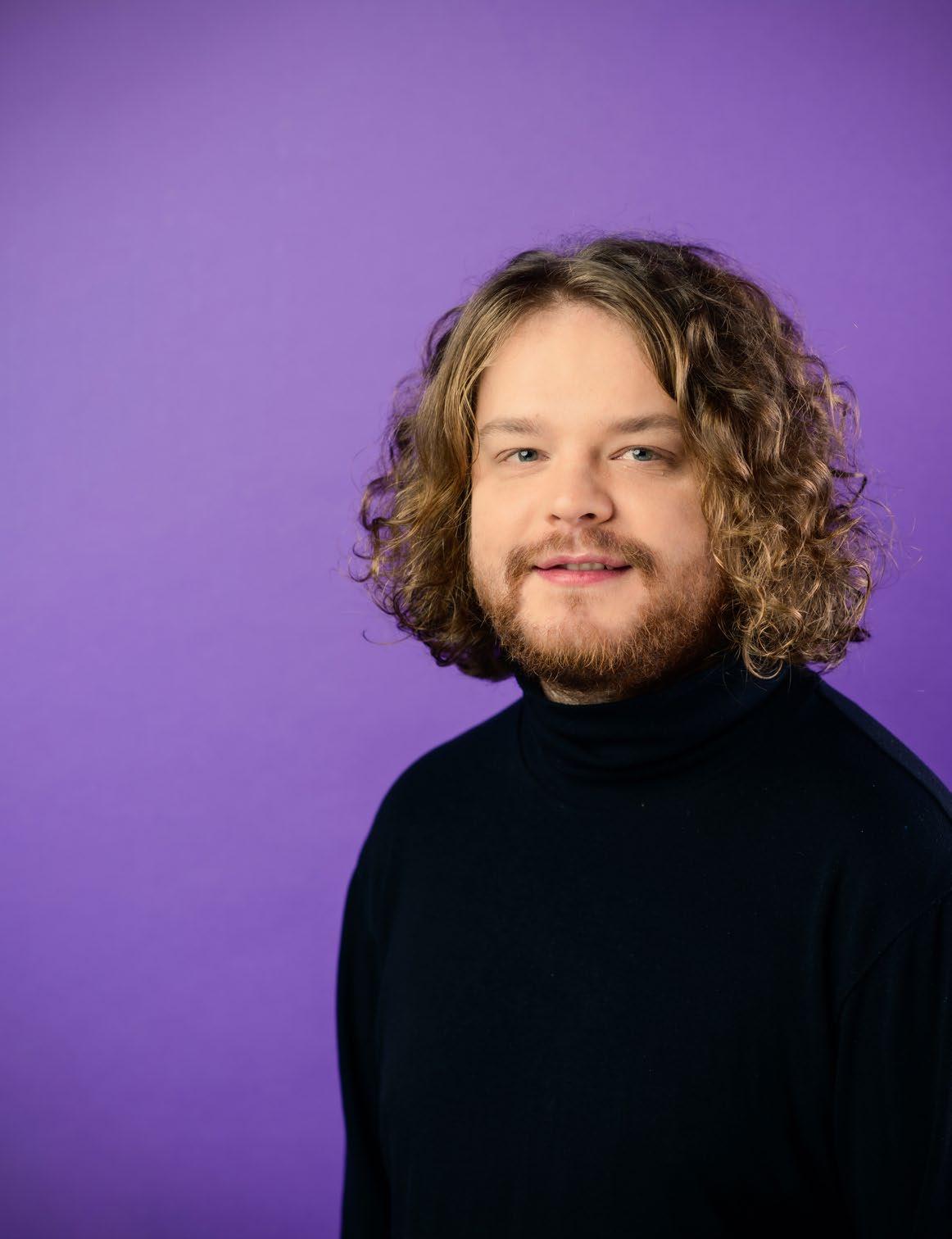
1After creating a new studio called Trickster Pictures last year and releasing two of its first films – my own techno-infused drama Neon Spring, and Linda Olte’s socially conscious debut Sisters, which is screening at the EFM, I am working full force on fostering young and upcoming talents from the Baltics and beyond.
My flagship project this year is Annecy award-winning director Gints Zilbalodis’ second animated feature Flow. It is currently in the late stages of pre-production. In Zilbalodis’ signature epic and poetic style, Flow will tell the story of a cute, yet self-centred cat who has to learn to collaborate with other animals after a great flood destroys his home. In order to save his life, the cat takes refuge in a boat full of other animals. With striking visuals, a sense of adventure, and an ecologically conscious storyline, we expect Zilbalodis’ film will be a strong auteur animation that will be enjoyed by both young and mature audiences. The film is co-produced by Sacrebleu Productions in France and Take Five in Belgium, we expect to release it in 2024.
At Trickster Pictures this year, I’m co-producing Chinese director Hu Jiaying’s debut 1 Girl Infinite, a queer drama where Yin Jia and Tong Tong, two girls learning to survive in chaotic Southern China, are forced by a tragic incident to confront the depths of their desire for one another. The film is my first co-production with a Chinese director, and we’re looking for sales representation for the project, expecting to complete the film in the summer of 2023.
I’m also looking for co-producers for several fiction projects in development, including The Child, the sophomore feature from Warsaw-winner Linda Olte, a sensitive relationship drama about Zane (40), a woman fighting with infertility, it’s an important and honest story about motherhood and female roles in society. In addition, there is my own upcoming project Sweet Dystopia, a drama about a couple attempting to resurrect their relationship, years after having been split apart by a trauma experienced in their early youth.
2I expect the Berlinale & EFM will return to full form this year. I sincerely hope the Baltic focus will bring more light to the astonishing new voices coming out of Latvia, Lithuania, and Estonia.
What are you currently working on? Your expectations for this year’s Berlinale?
Gabija Pluke speaks to director Marija Kavtaradzė about her film Slow that started its successful journey from the Berlinale Co-Production Market.


In 2021 the movie Slow was the first Lithuanian film to ever be selected for the Berlinale Co-Production Market. Now, the film has spread its wings and made its way to the Sundance Film Festival, the director Marija Kavtaradzė’s personal dream-come-true. The creator behind the film, echoing modern young adult problems, talks more about her new movie Slow.
Marija, can you tell us a bit more about your background?
I was born and raised in Lithuania, stud-
ied at the Lithuanian Academy of Music and Theatre, the film directing course. I’ve always been passionate about writing and going to the movies, so making films was my dream ever since I was a teenager. I made my first feature film Summer Survivors in 2018.
Slow was the first Lithuanian film to participate in the Berlinale Co-Production Market. How did this experience alter the movie’s journey?
We met a lot of people who were interested in our film, it was a really inspiring experience. The Co-Production Market
helped us to find partners for the film. It was very useful.
Your previous film Summer Survivors is full of social and personal topics relevant to modern young adults. Why make films concerning such topics? I make films about topics that interest me, make me think and look for answers. I think it’s natural that it’s relevant to others as well. I like to joke that it’s good that I am not that original. In this way topics that interest me also touch many other people as well.
Your newest film Slow talks about different, yet still relevant modern topics. Could you tell us more about the film? I would say that Slow is very different in terms of topic and even style from my last film, but of course there are some similarities, I am still the same person.
Slow follows a relationship story of two 30 year olds – dancer Elena (played by Greta Grineviciute) and sign language interpreter Dovydas (played by Kestutis Cicenas). It is a love story, where characters are building their own kind of intimacy and trying not to be led by expectations of what love or relationships should look like.



Elena, the main character in the movie, is played by Greta Grinevičiūtė, a professional contemporary dancer. What made you choose her to play the lead role?
Greta is a very talented dancer, choreographer and actress. I saw her in one
play some years ago, and I couldn’t stop thinking about her from way back then. Since I knew my character is a dancer, I invited Greta to meet and talk about the film, read a few scenes; I was sure that I wanted to work with her right away.
Slow participated in the When East Meets West programme in Trieste, Berlinale Co-Production Market, and its latest stop – the Sundance Film Festival. What does this achievement mean to you personally?
All these stops on our way to make a film were important and inspiring. I am really lucky that we were selected for these programs, since they brought me interesting people, ideas, and notes about the film I was making.
The Sundance Film Festival was a dream come true for me. Being from a small country it’s so special to be recognised! And going to Sundance was a dream I had from a young age. I am proud that we can share the hard work and talents of our team and brilliant cast with wider audiences. BF
The Sundance Film Festival was a dream come true for me. Being from a small country it’s so special to be recognised!
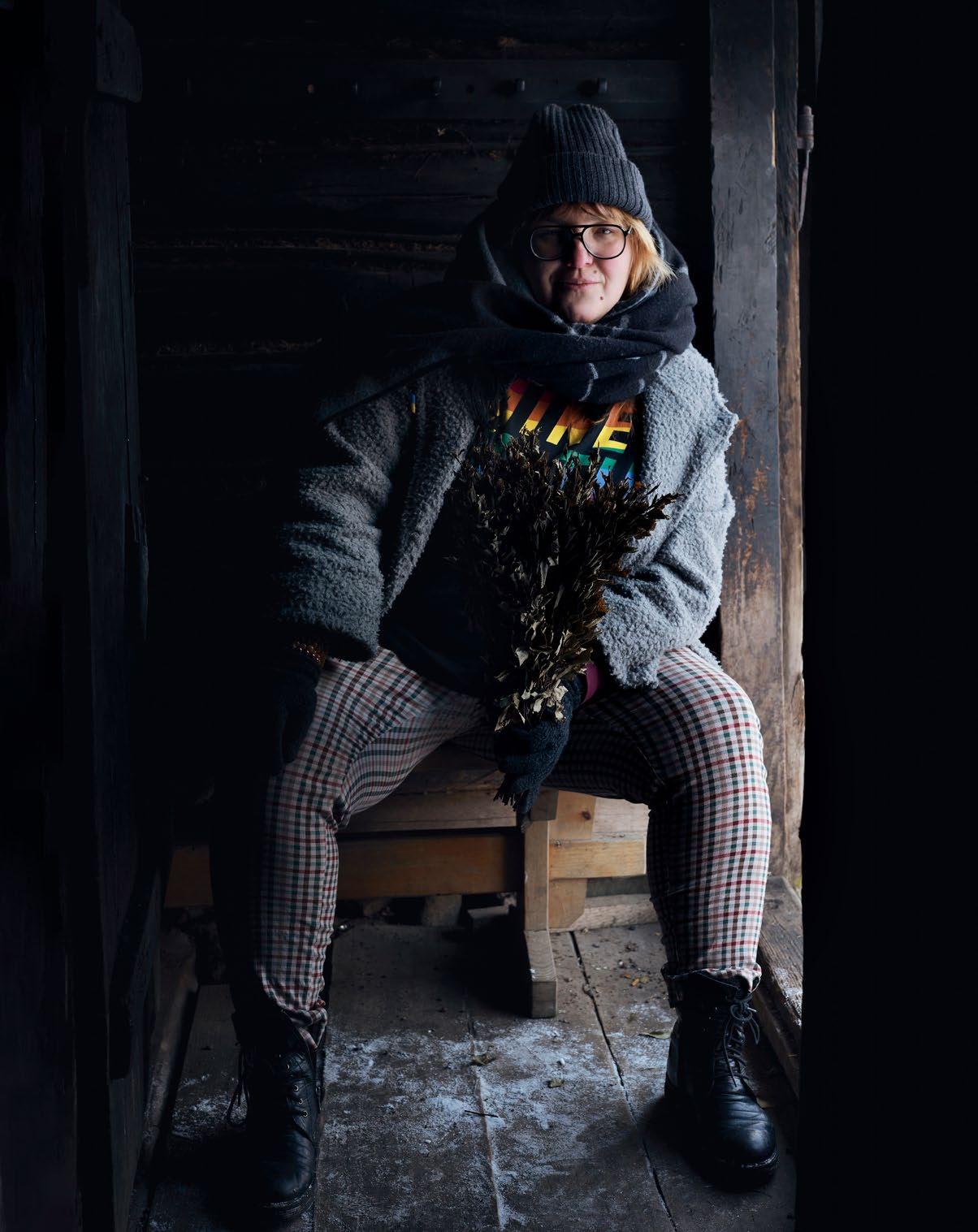
Smoke Sauna Sisterhood, a feature documentary by Estonian film director Anna Hints, premiered at the Sundance Film Festival in the World Cinema Documentary Competition programme.
By Andrei Liimets Photos by Virge ViertekWhere does the idea for this film stem from?
It is rooted in the time when I was around eleven years old. My grandfather died and before his funeral me, my grandmother, my aunt and my niece had a sauna together. It was there that my grandmother said for the very first and the very last time that my grandfather had cheated on her, had been together with another woman. She cried it all out from her and made peace with it.
I was far from considering it becoming a film back then, but I suddenly understood the meaning of the space created in a smoke sauna. How it can heal, how all emotions are allowed and accepted there. And then there’s the sisterhood. It doesn’t even need to be women, it doesn’t depend on gender, it’s a community.
The clear idea for the film dawned on me in 2015 when I was at a monastery with my mother, with whom I had a very difficult relationship (portrayed in Anna’s short 2018 documentary With Mum at the Monastery - ed). I wanted to write the idea down so badly, but we weren’t allowed to write or even talk. There was only one nun, whom I could confide in. I told her I felt the need to put the idea on paper, but she told me no - if it is impor-
tant, it will remain with you, trust it. If you still have the feeling after 26 days, then that’s the feeling to follow. And so it was!
There have been a couple of Finnish films that revolve around sauna culture, but they have centred on men. In Estonian there is the famous say-
ing about anonymous gossip “women said so at the sauna” - I think this might be the first film about the actual women at the sauna. I guess so! And I haven’t seen a film take place in a smoke sauna either, which is also very important, because of the specific culture of South Estonia. It’s not only our bodies we go to clean there.

Your short film Ice got quite a lot of recognition both home and abroad. Despite this, you have only directed documentaries since then. Why has this been your choice?
I actually study working with actors at the Estonian Academy of Music and Theatre, and I’m also in post-production with a new short film Weight of Light, shot in India, which will hopefully get its release soon.
Watching films, there was a point when I felt that the most interesting things are happening in documentaries, which are more organic and more flexible, push the boundaries and experiment more. That really inspired me. I also keep trying to figure out how to bring this organic feel to fiction films, both on the industry side and in working with actors. I’m still looking for my path.
I didn’t really connect with the way filmmaking is classically taught. It didn’t fulfil me as an artist. I want to experiment and find the best format for the idea I have. Most importantly, I see myself as a filmmaker, not a fiction director or a documentary director. Of course the industry needs to separate the two by name, but when you look at the best documentaries, they mix together so many genres. It’s the same with fiction films that inspire memy next short also walks the line between a fiction film and a documentary.
In documentaries, true miracles can take place though. There’s a coming together, where everyone feels something happening - we’re all there in the sauna and suddenly everyone can feel the vibration in the room.

Are these magic moments in documentaries something you need to be there for at the right place at the right time, or is it something you can direct?
Of course there is direction involved. Some people think documentaries are objective. If such a thing even exists, the involvement of the director, of the crew, of the camera already makes it subjective.
My first education was in photography and the first thing we were taught was that you don’t need to strive for this idea of objectivity, rather an essence. You try to catch a miracle. As a director, you create the space, the situation, the environment where this miracle might take place. And if you succeed, you need to be prepared to capture it. You’re there at this sauna for many hours already and then, suddenly… shh… it happens!
It was crazy how we filmed - especially for our cinematographer Ants Tammik and the sound recordist Tanel Kadalipp. I’m so grateful for their willingness to come and experiment in extremities with me. The sauna was actually hot, which some cinematographers told me just wasn’t possible to film in, that we’d need to do it at lower temperatures. I was too stubborn to back down, because I felt we could only make this film in the real hot sauna. Ants was prepared to take the risk and look for solutions - we created a cooling system, put ice bags around the cameras, had an assistant ready with water for us all the time. It was all possible thanks to producer Marianne Ostrat who was ready to come on this challenging journey with us!

In such an intimate film about sisterhood, how did it affect you having a male cinematographer there?
I wondered the same thing at first, and I did consider finding a female cinematographer. But then I decided not to base the decision on gender, but solely on the artistic merit. Ants and I went to school together and I really like his visual language. He was onboard right away and we had a test shoot with Kadi Kivilo, the main member of the sisterhood in the film. There was no discomfort and everything went fine. I was there all the time as well, and for some moments we did send the men outside and only recorded audio.
Were you close to the women in the film from before? They do make themselves very vulnerable.
I knew some of them. A few of them entered my life during the seven years it took to make the film. I met them, felt a connection, and invited them to take part.
Not all of the faces are on the screen. Yes, we relied on how everyone would feel comfortable. At first, we didn’t get the funding we asked for, despite pitching the idea at IDFA. They said that no-one would want to see a film where you could see none of the faces. I felt that would show where we are as a society. The fact that during the 21st century women still feel potential harm while telling their stories shows how long of a way we still have to go.
It was also funny for me because as an artist I feel there are much more interesting ways to show a human being than just

as a talking head. It made me find new solutions and became our strength.
It’s a whole other topic as to why making a film takes seven years. In 2016 we pitched the idea at IDFA, and weren’t given funding for going into production right away with the main reason given that Finland had already made a film about men in a sauna. I held my head and thought about the horrors of being a filmmaker - you create something and have such a strong belief in it and then there’s someone with power who can pretty much just disregard it.

That’s so odd for me, because while watching the film I was most disappointed once the first face appeared on screen. Just focusing on the naked bodies felt so exciting, because it normalises human bodies and asks, why nakedness causes so much discomfort, why is there so much of a stigma, especially concerning women’s bodies.
Absolutely! Those are all ideas I was con-

Feature documentary (89’)
Writer & Director: Anna Hints
Cinematographer: Ants Tammik
Sound Recordist: Tanel Kadalipp
Editors: Hendrik Mägar, Tushar Prakash, Qutaiba Barhamji
(FR), Martin Männik, Anna Hints
Composers: Eðvarð Egilsson (IS) & EETER
Sound Designer: Huldar Freyr Arnarson (IS)
Producer: Marianne Ostrat

Co-Producers: Juliette Cazanave, Hlín Jóhannesdóttir, Eero Talvistu †

Production companies: Alexandra Film (Estonia), Kepler22 Productions (France), Ursus Parvus (Iceland)
Financiers: Estonian Film Institute, The Cultural Endowment of Estonia, CNC, SACEM, Icelandic Film Centre, Sundance Institute Documentary Program, Tartu Film Fund
World Sales: Autlook Filmsales
templating. I actually thought about not showing any faces, but during filming, some women did want to show their faces on screen, because attaching their voices and faces to their stories felt empowering to them. It was such an interesting process, because one of the participants was clear about not wanting her face shown at first, but after three years came to me to say: I want you to show my face. She had gone through an internal process and arrived at the conclusion that this is the way you need to address such issues in society.
Speaking of the issues, there is a long recollection of a rape in the film. It was so painful, sad and repulsive I wanted to apologise for the whole male gender. I’m guessing it wasn’t the only such story from these seven years. How did you choose which narratives you wanted to focus on?
That is my own story. I wasn’t planning on telling it, but it just happened there in the sauna. I had never told anyone about it at such length. I’m supposed to direct others,
but that’s how it went. I was sceptical afterwards and didn’t want to include it in the film. Then Martin Männik, with whom we edited a 20 minute sample scene for the Sundance Institute Documentary Program to apply for funding, heard the story and, without knowing it’s mine, told me it needs to be in the film. I tried to vouch for other stories, because, sadly, it’s not the only such story we had. Statistically speaking, there were five of us in the sauna, with every last one of us having experienced sexual assault, and three of us rape. And then the Sundance Institute supported us and said that the world needs to hear this story.
That’s what I find the most harrowing - such a story not being an extreme example, but a shared experience. Within the time of making this film, there’s been the #MeToo movement with so many people speaking out, do you feel any actual change has taken place?
There has definitely been a change. I even saw it among the women around me, with them becoming prepared to show their
faces and their bodies on film. Some of them still want to remain anonymous, but some eventually decided to be credited with their names. When we started in 2015, I was told it was impossible to make such a film - no one will be open to share their stories. I will not allow myself the illusion that everything is fine now, but the ground is ready for more women to speak up and open themselves.
It fascinates me that when we’ve spoken to various foreign industry members, their feedback has fallen into two categories. Some of them are really excited by how openly we embrace the women and their stories, while some - and this isn’t down to gender - feel that while the topics are important, we shouldn’t show menstrual blood on the big screen, or that the rape story is too detailed.
Hearing the latter conversely gives me strength. When someone tells me that we need to speak about a topic, but not too much, I feel that as soft censorship. I’m so strongly against that. One person suggested for me to imply rape, but not really talk about it as fact. I mean - what the hell!? On the contrary, the facts are the ones we have to talk about.
We can’t put on a brave face as if nothing actually happened. It happens every single day. I have to live with it every single day. If you have a supporting space around you, both mentally and physically, no story should be too much.
I actually thought the menstrual blood scene might be the most important in the film. It did make me uncomfortable, but that’s exactly why it needs to be shown. We have stigmatised ourselves into a situation, where someone’s discomfort makes us cover up something that is absolutely natural and normal. Exactly! That’s what ignites me - the question about where does this kind of an idea stem from, that you need to be able to remain in your comfort zone all the time, or that art needs to be comfortable. It’s a welfare state syndrome. I become interested when I start feeling uncomfortable. I start questioning myself: oh wow, where is this coming from?
All these patronising remarks empower me. At first I became angry, but then I became empathetic to how many women have internalised patriarchal
thought, how deeply it runs on a cellular level. And so we feel the need to cover up menstruation. Or childbirth! I mean, when giving birth, I shat, I pissed, I puked, and I bled a lot. But we have this Madonna-like understanding of a mother gracefully feeding her child. In reality, it can be a total horror show - you have these breasts secreting milk, then nothing coming out, and it’s so painful. And then we are not willing to talk about the reality, which is so hypocritical. We want the real stories, to talk about issues, while not really talking about them, not really dealing with the reality.
A perfect illustration of this is when a well-known family magazine asked for a friend of mine, a folklorist, to write a story about cradle songs for Mother’s Day. In our folklore, there were songs about the baby dying, which were designed to prepare the mother psychologically for that possibility, because child mortality was very high. And the editor deleted this section, replying that it’s not suitable for Mother’s Day. That shows you where we really are.
I hope your film gets its release on Mother’s Day! The premiere was at Sundance in January. In the Nordic countries, saunas and the nakedness it involves are part of our culture, but how much did you think about foreign audiences for whom it might feel plain weird?

I don’t really think about it that way. When I get a strong feeling a story needs to be told, I also have faith the world needs that story. Coming from within this culture, when I was a teenager, I wanted to get away from it. I thought life would be way cooler somewhere else - that I’d be off to Berlin to never return. I travelled a lot and stayed in America for four months, visiting Native American reservations.
During one of those visits, I was at a sweat lodge ceremony, singing native songs. The Native Americans sang theirs, and I sang my folk songs. And then it dawned on me how similar the two are. That this sweat lodge seems so exotic and special for me, while it actually functions very much like the smoke sauna back home. I saw my roots. So yeah, I needed to go to the other side of the world to really appreciate my grandmother’s creaking smoke sauna. And I saw the universality of people longing for such spaces, for such communities. BF
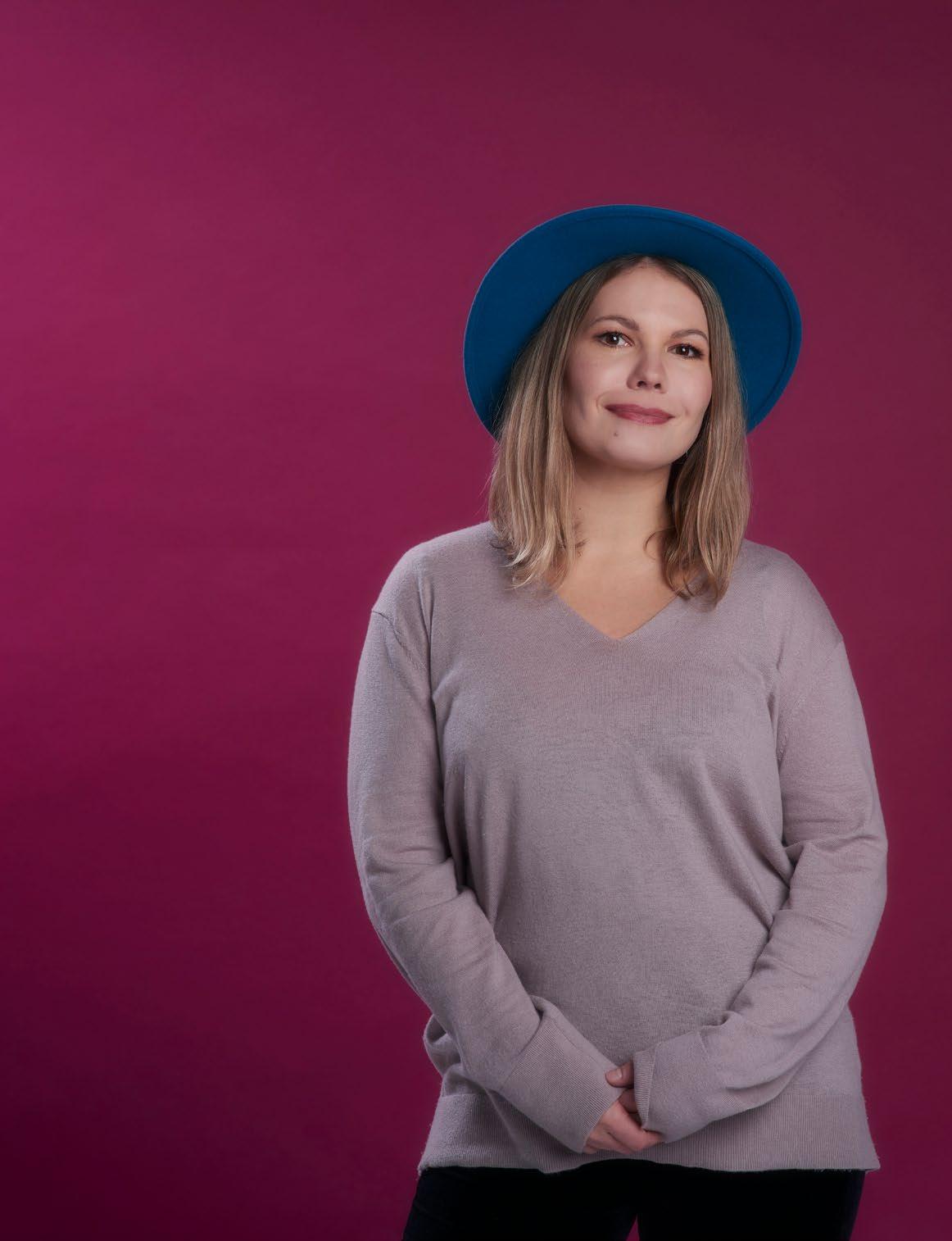
1I’m working on several projects and hope they will take the audiences to new terrains emotionally and thematically as they take me creatively to amazing places, spaces and people. My third feature-length film as the delegate producer and first feature documentary - Smoke Sauna Sisterhood by Anna Hints - premiered at the Sundance Film Festival World Cinema Documentary Competition in January. In the film, women gather in a South Estonian smoke sauna, share their innermost secrets and experiences, and regain their strength in the process. It’s a bold, immersive, and very personal theatrical documentary about the healing power of community. Sundance Institute supported Smoke Sauna Sisterhood is an Estonian-French-Icelandic co-production, and my second collaboration with producer and dear friend Hlín Jóhannesdóttir. I co-produced Hlín’s newest fiction feature Driving Mum - a dark comedy by Hilmar Oddsson. Driving Mum premiered, and won the Grand Prix and Best Original Score for Estonian composer Tõnu Kõrvits, at the Tallinn Black Nights Film Festival in November 2022.
I’m fascinated with film music and sound and have two minority co-productions set up with an Estonian composer and sound designer involved. First of them, Wet Monday, the debut feature of Polish director Justyna Mytnik produced by Lava Films, will enter the filming phase in February. Erki Pärnoja is composing its original score, and top Estonian sound designer Matis Rei is creating the soundscape for which the script offers very interesting possibilities. Just before EFM I presented Boyfriend, the first short film of new talents from Estonia - Leesa Ulanova-Wilson and Braden Wilson aka bagel&lurch - at European Short Pitch. And then there are some in early development. I’m living the dream.
2Smoke Sauna Sisterhood has two market screenings at EFM and I expect next good news from our sales agency Autlook Filmsales. We are finalising Jungle Law, a new short film from Madli Lääne about three teenagers caught in a downward spiral as their innocent flirtation turns into a violent power game. We presented the film at Cannes Court Métrage Focus WIP last year when it was in early editing, and here in Berlin I’m talking to sales agents and festivals to find the best place to world premiere this daring short. Simultaneously, I’m looking for a co-producer for Madli’s upcoming short documentary The Song of Sleepless Nights. And as always, I’m open to good surprises.
What are you currently working on? Your expectations for this year’s Berlinale?
After the success of his debut feature film Nova Lituania (2019), the director Karolis Kaupinis is working on his second film Hunger Strike Breakfast (Badautojų namelis) that’s set to be released in 2024.
By BF Photo by Tautvydas SutkusThe film tells the story of the employees of Lithuanian Television during a Soviet takeover in 1991. Having lost their jobs due to the event, its employees declare a hunger strike in protest. Initial enthusiasm is slowly replaced by emotional hunger which is way harder to bear than the physical one.

Hunger Strike Breakfast is writ-
For more information:

with an MA in Comparative Politics. Until 2018 Kaupinis had been working as a presenter and editor of a weekly TV programme dedicated to current political affairs at a national broadcaster.
Soon afterwards Karolis started writing and directing short films. His first short film The Noisemaker was selected to Pardi di domani Competition in the Locarno Film Festival and has been screened at more than 50 international film festivals ever since, also winning two Lithuanian Film Academy Awards – Silver Crane for The Best Short Film and The Best Actor in 2015. Kaupinis’ second short Watchkeeping was selected by more than 20 international film festivals in 2017.
Two years later Kaupinis premiered his debut feature film Nova Lituania at Karlovy Vary IFF, the film is still running at festivals, having four international awards for the Best Director and Best Picture categories. Nova Lituania was the leading film at theLithuanian National Awards 2020 receiving six main awards. This film was nominated to be representative of Lithuania for the Accademy Awards 2021. BF

1I am currently working on two feature films. One of them is Drowning Dry by Venice film festival awarded director Laurynas Bareisa. We have been working together since we were film students at school, and then after our studies, and we started the production company Afterschool together. Drowning Dry is Laurynas' second feature-length film. It tells the story of a family tragedy between two sisters, how they accept its consequences and how they go on living without taking on the role of victims. The other film is Marat Sargsyan's The Grand Inquisitor, a more genre-based film, which takes us into the realm of magical realism and tells the story of a man who knows everything about everybody and is able to show us. It could be called a fairy tale for adults. These films are completely different, in style, theme and genre. That's what inspires me the most about filmmaking - the uniqueness of the subject matter, the courage of the directors and knowing why they do it. Also, here at EFM virtual market screenings you can watch the debut feature film Parade written and directed by Titas Laucius. A very funny and interesting comedy, it premiered in PÖFF 2022, First Feature Competition program! There are some international co-productions in the early development and creative stages, so I hope I can share some thoughts and ideas with industry guests here at EFM.
2I am very happy to have the opportunity to participate in this year's Berlinale. I look forward to meeting colleagues and getting to know new ones. As always, I hope to find future partners who would be interested in the film projects I am developing, and to hear about their film projects. This is the event when you can network, share your experience, and meet new people. I also think it's important to remember that it's all about the cinema, so I'm certainly looking forward to seeing at least a few films!
What are you currently working on? Your expectations for this year’s Berlinale?
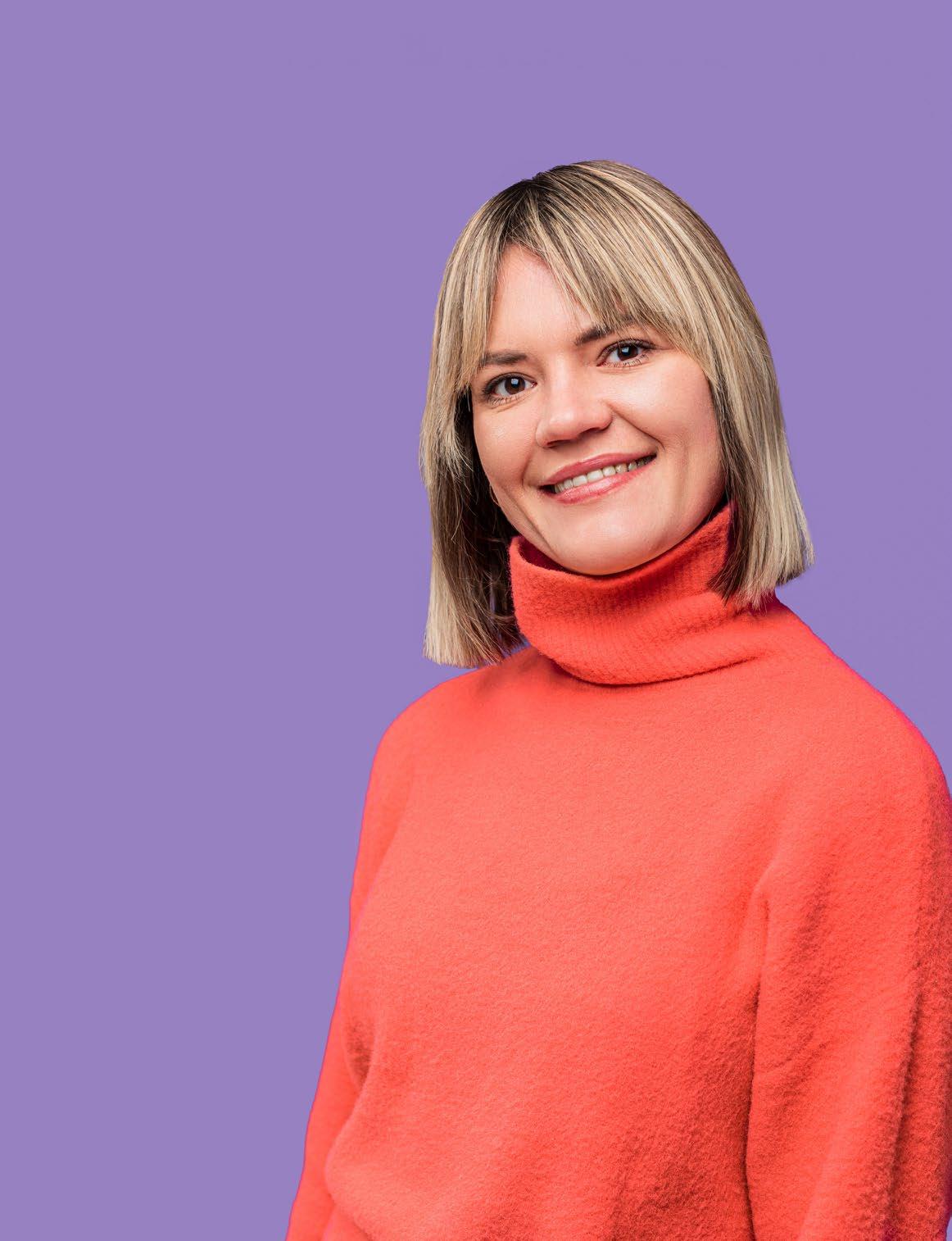
The creative potential of Latvian animation and successful co-productions have brought about fantastic results.
 By Kristı¯ne Simsone
By Kristı¯ne Simsone
Animated films from Latvia are being selected for acclaimed international film festivals, included in the regular programming of cinemas around the world, and featured on global streaming platforms.
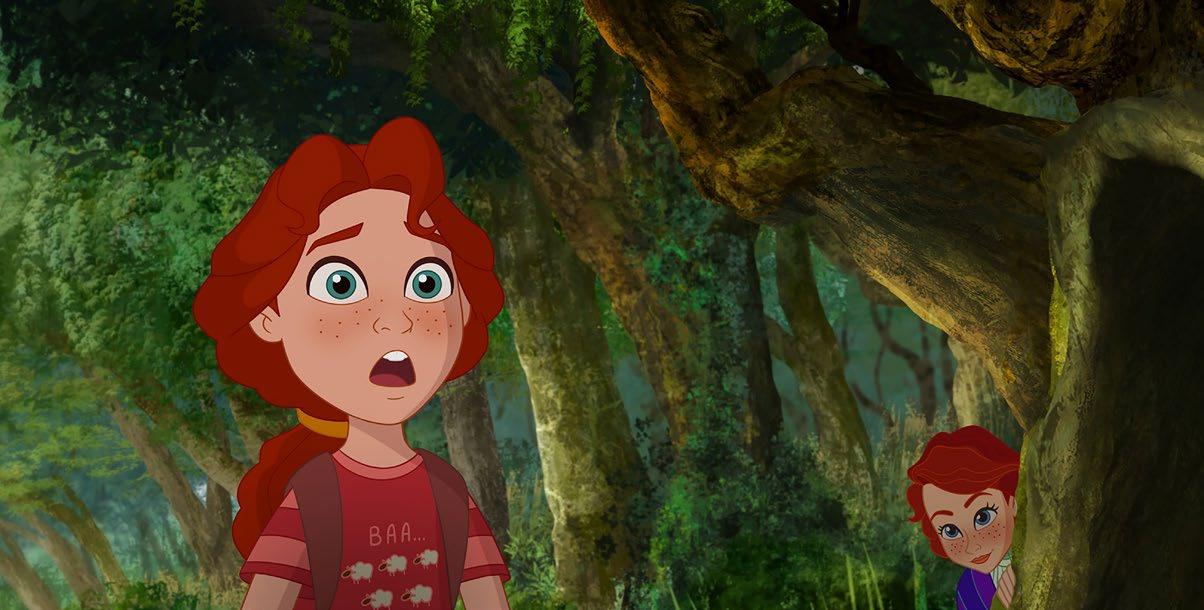
Latvian animation has had a long, and in a way symbolic relationship with the Berlin International Film Festival. It is here that the puppet animation Let’s Fly?! (Munks un Lemijs. Lidojam!? from the Munk and Lemmy series) by Nils Skapāns received the Crystal Bear in
1995; the first award that a film from Latvia received at an A-list festival after the country restored its independence. Since then, 19 animated films from Latvia have screened at Berlinale, mainly in the Generation and Generation Kplus sections for children and young people. Some films, such as Signe Baumane’s series of
shorts, have also screened in the festival’s short film programme.
This year, Latvian animation returns to the Generation Kplus programme with the film A Greyhound of a Girl (Meitene dzinējsuns). The film, which is a collabo -
Flow (dir. Gints Zilbalodis) is a co-production between three countries (Latvia, France and Belgium) and will soon enter the active phase of production.
ration between six countries (Luxembourg, Italy, Ireland, the UK, Latvia, and Estonia), uses both 2D and 3D animation, and Irish actor Brendan Gleeson has lent his voice to one of the characters. The film is suitable for audiences of all ages and is based on a young adult novel of the same name by Irish writer Roddy Doyle. Italian animator Enzo D’Alò’s career spans decades and many of his previous films have screened at festivals around the world. A Greyhound of a Girl is his seventh animated feature film.
Producer Vilnis Kalnaellis and his studio Rija Films represent Latvia on the film’s production team. Having received funding from the Latvian National Film Centre (NFC), work on the film’s backgrounds and the animation process took place at the studio. This is the sixth time that an animated film Rija Films has contributed to has ended up in competition at Berlinale – these include films about the puppy girl Lotte that were co-produced with Estonia, and several of the studio’s own films. A Greyhound of a Girl is also a result of the long-standing col-
laboration between Rija Films and Paul Thiltges Distributions from Luxembourg. Their first collaboration, the mythical adventure film Kirikou and the Sorceress (Kirikou et la sorcière, 1998) by Michel Ocelot and Raymond Burlet, was the Latvian studio’s first internationally acclaimed animation project. Another collaboration is currently underway, Reinis Kalnaellis’ feature animation Thelma’s Perfect Birthday (Telmas lieliskā dzimšanas diena). It is worth noting that Rija Films is also able to provide the necessary infrastructure for animation in Latvia for projects other than their own.
Latvian animation is constantly in circulation around the world. Not only are films regularly selected for competition programmes at Berlinale, but they are also selected for other international festivals and screen outside Latvia in cinemas and on streaming platforms.

A good example of this is the work of animator Gints Zilbalodis. After the creative success of his short films Oasis (Oāze), Inaudible (Nedzirdams), Priorities (Prioritātes), and Aqua, with which he established his signature style, Zilbal-
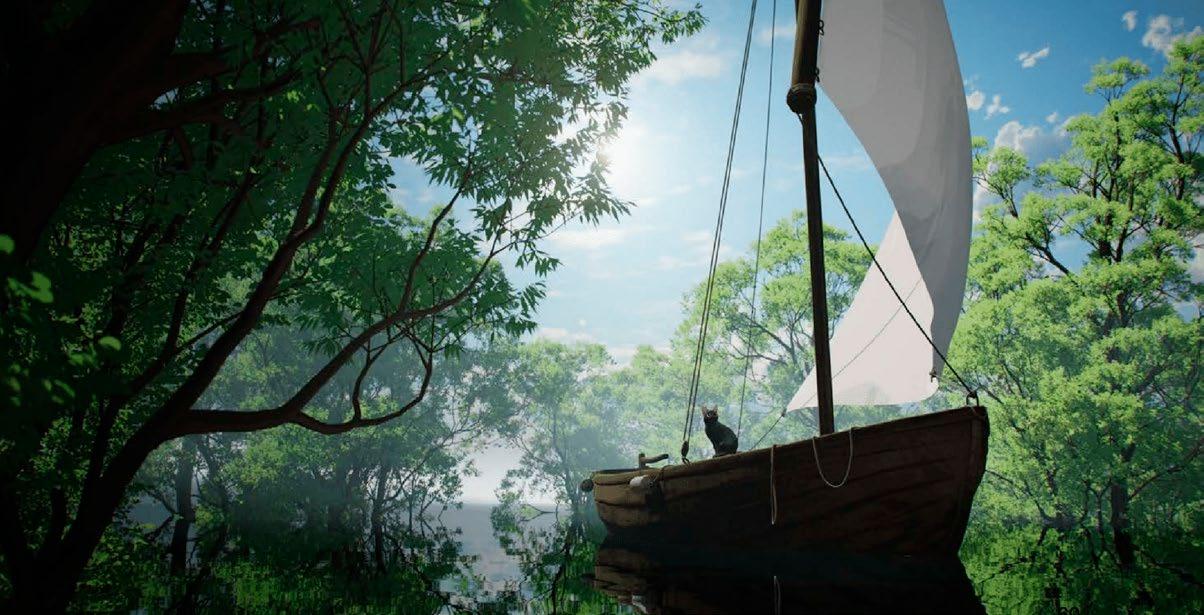
odis won the main prize of the Contrechamp programme at the 2019 Annecy International Animation Festival with his debut feature, the introspective, 3D computer-animated journey Away (Projām). In addition to being selected by over 90 film festivals (including in France, the UK, Japan, and South Korea), Away has screened in cinemas and been picked up by streaming services worldwide; it is currently available in the US on Amazon Prime. In 2020, Away was longlisted for the Academy Awards. As reported by various international press outlets such as Variety and The Guardian, Away is a remarkable achievement by a young director – Zilbalodis single-handedly took on every role (animator, director, writer, editor…) and even created the soundtrack.


Considering Zilbalodis’ mastery of visual storytelling and creative filmmaking, as well as his international success, his next feature film Flow (Straume) is one of the most anticipated Latvian animated films. It is expected to be released in 2024 and will be made in a graphically stylised 3D technique. While still retaining control over the film’s overall form and creative aspects, this time Zilbalodis will be collaborating with an international team. Flow is the story of a “cute, yet self-centred cat who has to learn to collaborate with other animals after a big flood destroys his home”. The film’s producer Matīss Kaža explains that “the plot has parallels with the director’s life”. Flow is a co-production between three countries and will soon enter the active phase of production: Dream Well Studio (Latvia), Zilbalodis’ own company; Sacrebleu Productions (France); Take Five (Belgium). The filmmakers ex-
plain that unlike animals in mainstream cinema, for example in films by Pixar, Flow will depict animals as animals, not as anthropomorphic creatures.
The animated films being made in Latvia appeal to different audiences and represent a variety of creative techniques. A myriad of auteurs and their unique styles make up the cinematic landscape and the stories they illustrate dispel the myth about animation as a genre mainly meant for children; as illustrated by among others director Vladimir Leshchiov’s work from the past ten years (his latest short film is Comeback, 2021).
Latvian animation has flourished over the past decade, which has resulted in several feature-length films, for example, independent animator Signe Baumane’s Rocks in My Pockets (Akmeņi manās kabatās, 2014). Rocks in My Pockets was made by superimposing handdrawn images over paper mâché sets and it screened at more than 250 festivals. Baumane’s latest film, My Love Affair with Marriage (Mans laulību projekts, 2022), was the first Latvian film to be nominated for the European Film Awards for Best Animated Feature Film. After many successful screenings on the international festival circuit, which started with a world premiere in competition at the Tribeca Film Festival in 2022 and continued at the Annecy International Animation Film Festival, My Love Affair with Marriage continues its journey around the world. Baumane is currently developing an idea for a new feature film, Karmic Knot (Karmiskais mezgls), to -
gether with her long-standing partners, Latvian production company Studio Locomotive. Once again drawing inspiration from the director’s life, this project is intended as the final part of a trilogy.
Among other works currently in production at Studio Locomotive is Roze Stiebra’s latest film, Rule of the Heart (Sirds likums). Stiebra is a revered Latvian animator who has been honoured for her lifetime contribution to cinema. Rule of the Heart is a feature film based on a Latvian literary classic and continues her signature tradition of collaborating with prominent Latvian painters, this time with Aleksejs Naumovs. The film is scheduled to premiere in autumn 2023.
Like Baumane’s films, Ilze Burkovska Jacobsen’s My Favorite War (Mans mīļākais karš, 2020) demonstrates that the themes and experiences depicted in films that are based on personal life stories and family histories can successfully resonate with audiences around the world. Burkovska Jacobsen’s memories of a childhood constricted by totalitarian doctrines won the main prize in the Contrechamp competition at the Annecy International Animation Film Festival in 2020. My Favorite War has not only screened at nearly 50 film festivals worldwide, but has also received international distribution in French cinemas, among others.
Burkovska Jacobsen is currently developing a new film project together with production studios Ego Media (Latvia) and Bivrost Film (Norway). Roach Coach (Trakmakāns) has already received funding for development from the NFC in 2021 and is intended for children and young audiences. The film tells the story of a girl who is bullied for talking to her friend, a
cockroach that only she can see. The film will use a variety of techniques combining drawing, 2D, 3D, and cut-out animation.
Atom Art currently has many films in production making it possibly the most prolific animation studio. Founded in 2001, the Riga-based studio creates exceptional content for children and families, including series, shorts, and feature films that have screened at festivals around the world, for example at Berlinale, Annecy, and Clermont-Ferrand. Director Edmunds Jansons’ Jacob, Mimmi and the Talking Dogs (Jēkabs, Mimmi un runājošie suņi, 2019) was the studio’s first feature film and was made in collaboration with Polish 2D-animation production company Letko. Now, the two studios are working on a new project by Jansons, the feature-length adventure story Born Happy (Laimīgie). The film is inspired by the life of Aleksandrs Laime, a Latvian explorer who ended up living in South America. The studio plans to begin the production phase of Born Happy in spring 2023, with the premiere scheduled for 2024.
Atom Art is developing a 10-episode animated miniseries for children, Hello, Oscar (Oskars un lietas), which will also be directed by Jansons. Additionally, the studio has several short films for adults in production – After All (Beigu beigas) by Linda Stūre and Kafka in Love (Iemīlējies Kafka) by Zane Oborenko (in collaboration with Czech company Maur Film). Stūre’s film is being created in 2D animation, while Oborenko is working in the complex and technically demanding

technique of sand animation. Another film in development is director Lizete Upīte’s latest short film On the Road (Ceļā). Upīte, who has studied in Latvia, Estonia, and at La Poudrière in France, developed her signature style with the shorts Night Walks (Nakts pastaigas, 2018) and Riga’sLilac(Rīgasceriņi, 2019), named after an unusual, classic perfume. In her work, Upīte successfully combines a compassionate naivety with profound psychological motifs.
Together with Tritone Studio, director Raitis Ābele is currently working on the historical ethno-thriller Dog of God (Dieva suns), a feature-length film using rotoscope animation. The film is planned to be completed by the end of 2023. Also in production is animator and painter Kārlis Vītols’ first feature-length film. Made in 2D-animation, Northern Star (Ziemeļu zvaigzne) is a travel story about Nikolaus von Himsel’s journey to Italy.
Von Himsel was an 18th century Baltic-German doctor who founded the first museum in the Baltic States. The film is being produced by Kokles, a studio created by Vītols and his partner and producer Sniedze Kāle.
The animation studio Animācijas brigāde is steadily working on new films. Founded in 1966 by the master of Latvian animation Arnolds Burovs, it is the oldest animation studio in Latvia and has produced around 150 animated short films. Many of them have been selected for programmes at Berlinale and other festivals. In 2023, the studio plans to premiere both Upside Down (Kājām gaisā), a short film by Dace Rīdūze who has had several short films screen at Berlinale, and The Bees (Bites) by Māris Brinkmanis.
The studio’s second feature film, Henry the Great (Lielais Indriķis), is a historical adventure directed by Jānis Cimermanis that is scheduled to premiere in early 2023. Cimermanis is one of the most prolific Latvian animators whose filmography includes dozens of films, among them the series Rescue Team (Avārijas brigāde) from 1991 that became a pop culture classic for the generation that grew up in the 1990s. Since 2010, the three lively protagonists’ adventures have taken them to various European countries like Italy, Spain, Greece, France, and Norway. BF
For more information on the latest and upcoming Latvian animations and their creators, visit latviananimation.com.
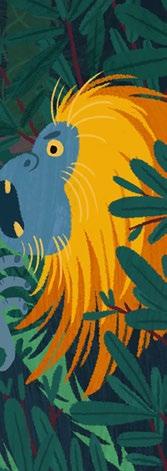

What are you currently working on? Your expectations for this year’s Berlinale?
Volia Chajkouskaya PRODUCER / DIRECTOR / FESTIVAL FOUNDER ALLFILM1At the moment I am currently working on several projects within Allfilm, the company I am privileged to work with since 2019. And actually, all of the projects I have to highlight quite carefully, as they all deal with some sensitive topics.
The Wife of (work in progress title) is a documentary in production that I started in 2020 during the revolution in Belarus, and tells a story of women fighting against the dictatorship in Belarus. I follow three protagonists and their fight against the regime, and attempt to release their husbands who are political prisoners. This is my feature-length directorial debut and I am also one of the producers of this project, along with an amazing team: Ivo Felt (Estonia), Christian Popp (France), and Marius Markevicius (USA). The Wife of was selected for Chicken and Egg, and I have been in New York several times developing this film. I hope it will have a big exposure, so it can help Belarusians fight for freedom.
Another project I am working on as a producer is a documentary War on Women, by a first-time female director Maris Salumets from Estonia. It’s an investigative documentary on reproductive politics and we are unable to reveal too much about the project for security reasons. The story is told through Maris as she navigates through single parenting and motherhood in general. It’s a very powerful female story. War on Women was recently pitched at Nordisk Panorama in Malmo, and at the moment we are negotiating with several potential co-production partners.
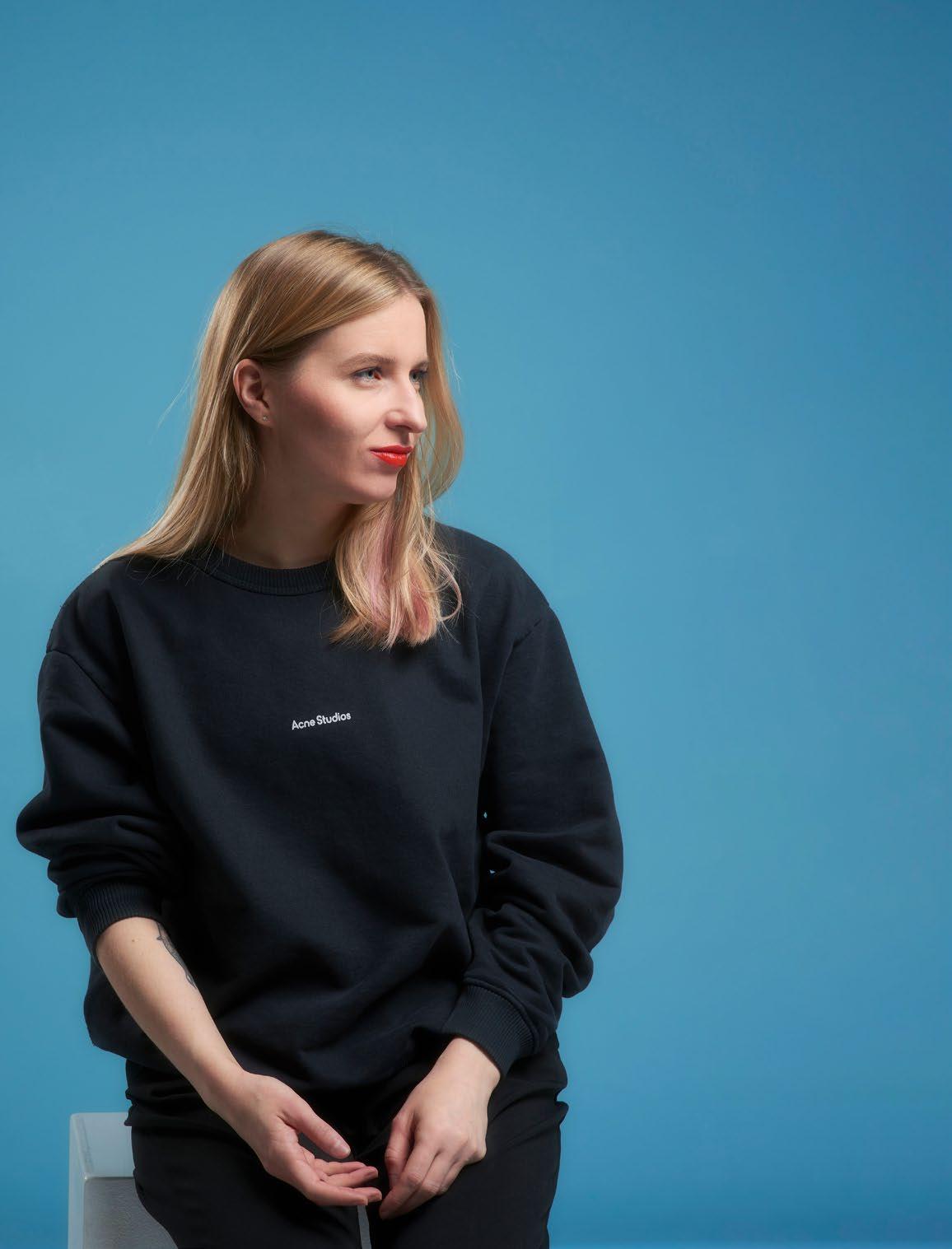
72 Hours (dir. Anna Savchenko) is a documentary on the topic of the death penalty in Belarus. The film is based on the story of a woman whose son was sentenced to death and executed without sufficient evidence of guilt. The director tells the story via a cross-media language, while observing the protagonist, and at the same time going back into the past traumatic events via a theatre re-enactment. 72 Hours was selected by the IDFA Bertha Fund and it’s a co-production of Belgium (Playtime Films) and France (Sanosi Productions).
2I am hoping for a productive and joyful Berlinale - to have productive meetings for my projects with funds, sales agents, distributors, and co-producers. I am looking for projects for a minor co-production with Estonia. I am also working with a group of active Belarusian filmmakers on creating an Independent Belarusian Film Academy, which will be actually registered in Estonia, as we are all in exile. I hope for support from the Estonian Film Institute on that too, which is such a great example for me about how a film institution can function efficiently and transparently.
Sander Joon’s Sierra has been selected to more than 100 festivals around the world.

Estonia’s biggest international animation hit has been Sander Joon’s short animated film Sierra. The film has been shortlisted for an Oscar, bringing it one step
 By Maria Ulfsak
By Maria Ulfsak
Sierra was eligible for an Academy Award in Animated Short thanks to wins at AFI Fest, San Francisco, and Palm Springs ShortFest. Joon’s film has been chosen by over 130 festivals and has received over 40 awards. The film has travelled to many notable festivals such as Ottawa, Clermont-Ferrand, Valencia, Animatricks, Turku, Viborg, Animafest Cyprus, Fantoche and Cinekid, to name a few. Sierra was written, designed and directed by Sander Joon and produced by Aurelia Aasa (AAA Creative) and Erik Heinsalu (BOP! Animation). The official list of Academy Awards nominees will be announced on January 24, and the awards ceremony will take place on March 12. At the heart of the story is a young boy who turns into a tyre during a rally-driving competition. Beneath the absurdity of the narrative lies a personal story inspired by the film-maker’s relationship with
his father. According to producer Aurelia Aasa, Sierra tells a universal story that resonates with many.
“Yet, I believe the phenomenon of the film is its exhilarating, often unexpected dark humour that keeps the viewer hooked throughout the story. Director Sander Joon
Priit Tender’s Dog Apartment is also a big hit at many international film festivals.
worked relentlessly on even the most microscopic details, and I’m delighted that the viewers have approached Sierra with the same kind of enthusiasm. I hope this rally will help us move forward with the development of a feature-length animated comedy,” says Aasa. Also conquering festivals and viewer’s hearts is Priit Tenders masterful puppet animation Dog Apartment. The 14-minute short that premiered at 2022 festival Animist Tallinn has already participated in 23 festivals and won eight prizes, three of them being the Grand Prix (at Animasyros in Greece, Tofusi festival in Batumi, Georgia and Etiuda&Anima festival in Krakow, Poland). This winter and spring, the film will also compete at Black Movie Geneva International Independent Film Festival in Switzerland, Monstra festival in Portugal, and Anima Brussels, among others. Dog Apartment is an absurdist drama about a decayed male ballet dancer and his barking apartment. The main character Sergei lives in an apartment building near a suburban kolhoz. He is having his mundane fights against routine, domestic animals and alcohol. It is based on the poem by Estonian surrealist poet Andres Ehin.“Dog Apartment is played on such a humanistic note,” says the producer of the film Kerdi Oengo. “The film demonstrates what can happen to you on the worst of your days. It deeply touches the viewers. The funny thing is that almost every festival that selects the film, also awards it.” BF
closer to a nomination for Best Animated Short.

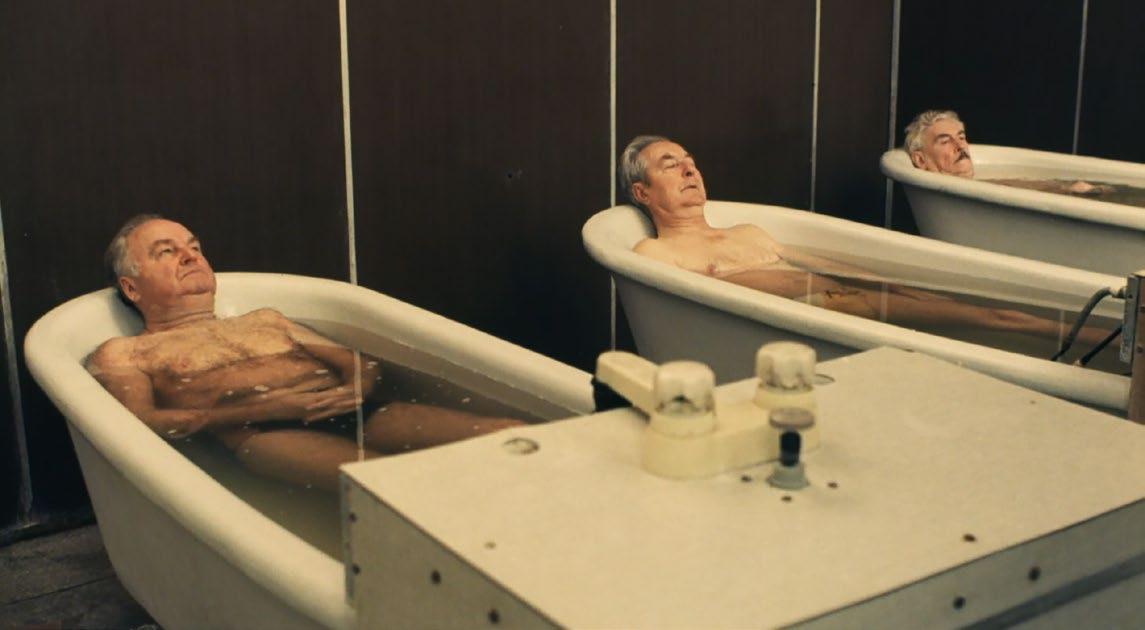
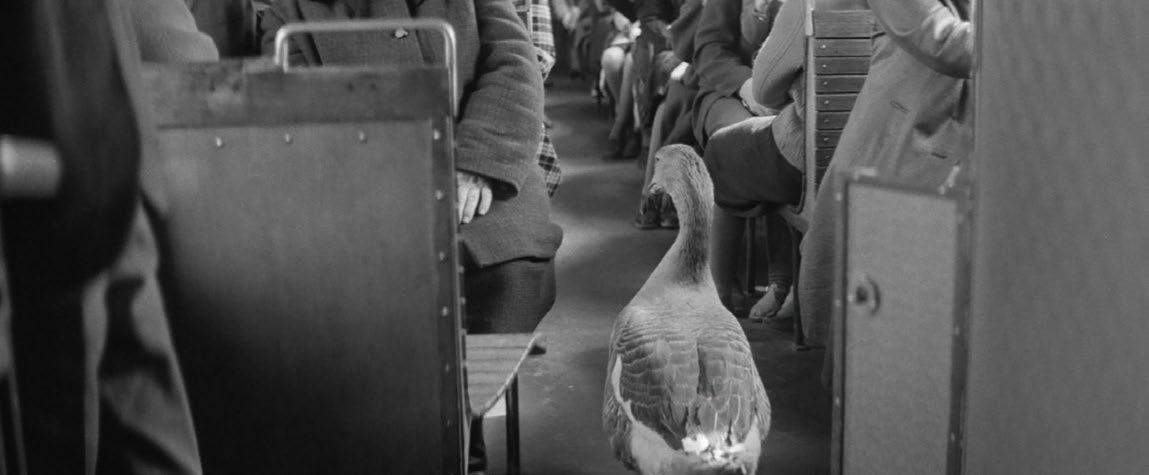

 By Neringa Kažukauskaite
By Neringa Kažukauskaite
In Lithuania, documentary filmmaking was an important ideological tool during the Soviet era. However, in the mid 1960s, Lithuanian poetic documentary, a unique school of documentary cinema, began to emerge. Its emergence is linked to the Soviet Union’s Thaw period, as well as the arrival of a new creative force in Lithuanian cinema: a young generation of directors and aspiring cameramen.
Robertas Verba’s films The Old Man and the Land (Senis ir žemė, 1965), Dreams of Centenarians (Šimtamečių godos, 1969), Ciutyta Ruta (Čiutyta rūta, 1968), and To the Celebration (Šventėn, 1970) contain vivid visual poetic metaphors. Long shots of the characters’ faces are taken, and genuine conversations replace previously heard disconnected voiceovers and authorial commentary.
The camera focuses on rural everyday life and its environment, which bleeds into the recognisable natural Lithuanian landscapes, perfectly capturing the natural poetics of everyday life. The recorded reality takes on an allegorical connotation, raising questions about the meaning of existence itself.
Viktoras Starošas’ films are full of social themes: Dreams and Fates (Svajos ir likimai, 1961), Cheer up, Virginijus (Nenusimink, Virginijau, 1962), Love the Headmistress (Aš myliu direktorę, 1978) stand out for their human compassion, which is uncharacteristic of Soviet documentaries. The internal monologues, dynamic montage, and sound effects make the films come alive.
Henrikas Šablevičius’ films Liuob sokt, liuob dainuot (Liuob šokt, liuob dainuot, 1974), A Trip Through Misty Meadows (Kelionė ūkų lankomis, 1973), The Sorceress (Žiniuonė, 1975), Apolinaras (1973) are characterised by a light mood, humorous intonation, and even some manifestations of the grotesque. The director is most interested in simple yet highly individual people and their daily lives, avoiding the political realities of the time.

No Foe Can Scare Us (Mumsnebaisūsjokiepriešai, 1978), Sensitivity as Bread (Jautrumo kaip duonos, 1979), etc. – these are documentaries by Edmundas Zubavičius with a clear journalistic form and a satirical point of view.
Director Almantas Grikevičius, who later directed feature films, began his career with documentaries. The city symphony Time Passes Through the City (Laikas eina per miestą, 1965) remains one of Lithuanian documentary’s most outstanding works. This dynamic film, dedicated to Vilnius, is full of innovative artistic solutions that metaphorically combine the past and the present.
Inspired by this film, the cinematographer and director Eitvydas Doškus created today’s paraphrased Once Upon a Vilnius (Čia buvo Vilnius, 2022). It weaves a dialogue with Grikevičius’ work as both of them interpret the change of time and city in their own way. This film testifies to the strength of the Lithuanian poetic cinema tradition as it is creatively continued from generation to generation.
The so-called breaking generation arrived in Lithuanian cinema during the first years of Lithuania’s independence in the 1990s: Šarūnas Bartas, Audrius Stonys, Arūnas Matelis, Rimvydas Leipus, Valdas Navasaitis and others. They conveyed post-Soviet reality through their own experiences.
By allowing a free associative flow of images with careful observation, this generation attempted to capture the real time they experienced. Their films’ visual form, mostly in black and white, reflects their inner feelings. Images, the true language of cinema, are far more effective than words in this context, to the point where they are almost non-existent.
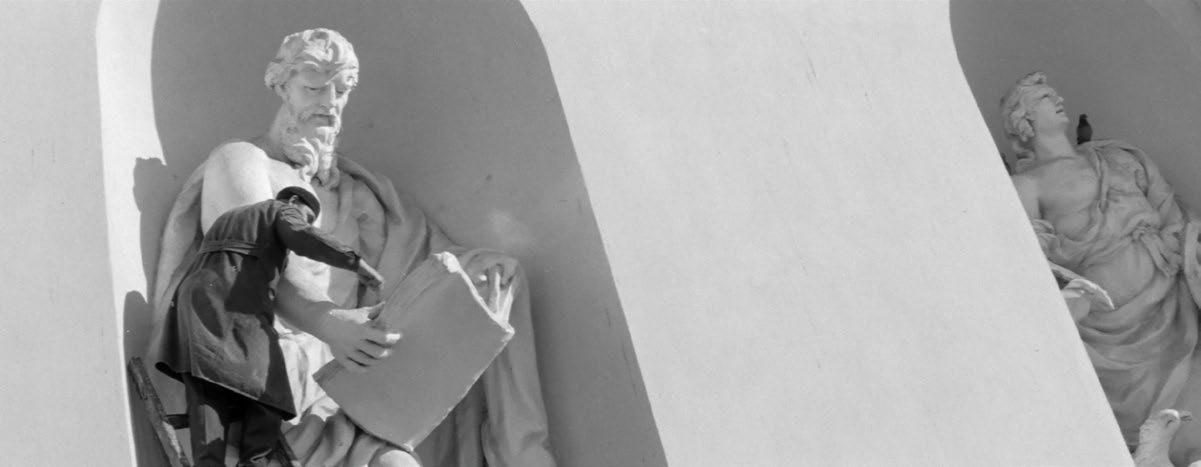


The film directors and cameramen of this generation felt limitless creative freedom because they entered the film industry at a young age, just as reality was changing dramatically due to the complete collapse of the Soviet film financing and production system.
Documentary filmmaking ihas always played an important role in Lithuanian cinema. The strong traditions of poetic cinema, the search for an authentic relationship with reality, an exceptional visual language, interesting narrative forms, creative courage, as well as a wide range of topics and topical issues, are all preserved in Lithuanian documentary.
Time Passes Through the City (1965)
by Almantas GrikevicˇiusThey developed their own cinematic language and a distinct vision of reality without imitating anyone. This was perfectly timed: Lithuania had just regained its independence, and a new sense of hope filled the air.
Many of the early films of the breaking generation were made at Kinema, the first independent studio founded by director Šarūnas Bartas. He is without a doubt the most prominent name of the generation of changes that brought Lithuanian cinema true international recognition. He began with documentaries before focusing on feature films. Tofolariya (Tofolarija, 1984) is a short film that depicts the contrast between the desolate existence of the disappearing Tofolar people in Siberia and the surrounding natural beauty. In Memoriam of the Day Passed (Praėjusios dienos atminimui, 1990) explores the irreversible passage of time: past day, past time, past life. The camera carefully observes events on a cold winter day in places where general attention is not focused.
Earth of the Blind (1992) and Woman and the Glacier (2016)
by Audrius StonysUžupis, the currently thriving but back-then abandoned district in Vilnius, is the main star of director Arūnas Matelis’ film Ten Minutes Before the Flight of Icarus (Dešimt minučių prieš Ikaro skrydį 1992, Main Prize at the International Oberhausen Short Film Festival).
The film, regarded as a manifesto of the time, is a testament to an extremely authentic relationship with a new-found freedom-filled reality, a state in which
something significant is about to occur. Reality pauses for a moment, and the bright marks of the past fill the screen: the wind of change can be seen on people’s faces, dotted in their lives, and alive in their homes.
The exploration of the intimate relationship with reality and time is perhaps the most important aspect in Matelis’ works. The magnificent event, whether it is the global upheaval in Baltic Way (Baltijos kelias, 1990), the preserved ancient religious rituals in a Lithuanian village experienced in Not Yet Finished Tales of Jerusalem (Iš dar nebaigtų Jeruzalės pasakų, 1996), the expected lunar eclipse in Sunday. The Gospel of Albert the Elevator Driver (Sekmadienis. Evangelija pagal liftininką Albertą, 2003), the lives of terminally ill children Before Flying Back to Earth (Prieš parskrendant į Žemę, 2005, Directors Guild of America Award), or the experience of never being a winner in Wonderful Losers: A Different World (Nuostabieji lūzeriai. Kita planeta, 2017), is not the main focus after all. Time is the true main character in Matelis’ films, as evidenced by the titles.
Audrius Stonys’ films also explore the concept of time: Open the Door to Him Who Comes (Atverti duris ateinančiam, 1989), Earth of the Blind (Neregių žemė, 1992, European Film Academy Award), Antigravity (Antigravitacija, 1995), FlightsintheBlueField (Skrajojimai mėlynam lauke, 1996), Woman and the Glacier (Moteris ir ledynas, 2016), Bridges of Time (Laiko tiltai, co-directed with Kristine Briede, 2018). These films look at how time changes and evolves, forcing people to adapt. The films of Stonis investigate the inner workings of individual realities, raising ethical, philosophical, and existential concerns. His films are distinguished by their strong visual expression and poetic humanistic worldliness.
Autumn Snow (Rudens sniegas, 1992), and Spring (Pavasaris, 1997, Cinéma du Réel prize in Paris) are two films directed by Valdas Navasaitis that expertly capture the relationship between nature, man, and time. Idyllics of Kirtimai (Kirtimų idilės, 1991) by Artūras Jevdokimas explores the gloomy slums in Vilnius’ Roma district, where the director sees abandoned people and their occasional idyllic moments.

Ramunė Kudzmanaitė’s more romantic films, such as The Sun Rises to the West (Teka saulė vakaran, 1989) and Raspberry Fields (Aviečių laukai, 1997) allow
Baltic Way (1990) by Arunas Matelis
the audience to feel the inextricable connection between man and nature, which is evident in ethnographic works and folk songs, raising questions about memory preservation.
This generation, however, was involved in more than just poetic time-based cinema. Algimantas Maceina’s film Black Box (Juoda dėžė, 1994) which documents the transfer of the director’s grandfather’s remains from Siberia to Lithuania, remains one of the most original experiments in Lithuanian documentary cinema to this day. Domantas Vildžiūnas’ recording of historical events - protests and demonstrations - in the film The Real Sound of the Nation’s Rebirth 1989-1993 (Tikras garsas valstybės atgimimo, 1989–1993, 2010) is another ironic testament to time. Here, the camera seems to point to the side - a yard, a shop window, passers-by, and the film becomes an ironic document of times gone by, rather than an orderly chronicle of historical events.


Antigravity (1995) by Audrius Stonys
Following Lithuania’s independence, the older generation worked in documentary filmmaking as well. The family duo Julija Gruodienė and Rimantas Gruodis (Ona and Mykolas, 1990), Sauna (Pirtis, 1997), The Family (Šeimyna, 2001), and The River (Upė, 2009) are works which incorporate poetic and social documentary, journalism, and philosophical metaphor. The director couple Diana Matuzevičienė and Kornelijus Matuzevičius maintain thematic and stylistic consistency, a calm narrative tone, and a respectful relationship with the heroes of their films such as Forever (Per amžiųamžius, 1991), Over the Threshold (Už slenksčio, 1995), Returns (Sugrįžimai, 1996) and Waiting (Laukimas, 1997).
Janina Lapinskaitė’s films From the Life of Ants (Iš skruzdėlių gyvenimo, 1994), From the Life of Elves (Iš elfųgyvenimo, 1996), VenuswithaCat,orFromtheLife of Butterflies (Venera su katinu, arba Iš peteliškių gyvenimo, 1997), The Life of Venecijus and The Death of Caesar (Venecijaus gyvenimas ir Cezario mirtis, 2002), etc. tell tales of eccentric hermits, whose lives
the director captures in a unique style, highlighting the contrast between poetry and reality.


A new generation entered Lithuanian cinema at the turn of the century. Their documentaries’ thematic scope expanded as their focus shifted to social themes and current issues.
Inesa Kurklietytė places a strong emphasis on the portrayal of women in her films. Her 2005 film Kristina in Christ (Kristina Kristuje, 2005) is about a woman who wants to become a Protestant priest but faces many obstacles in Catholic Lithuania. Women’s Secrets (Moterų paslaptys, 2004) and Light Witchcraft (Lengvas raganavimas, 2004) are both touching stories about midwives.
The most interesting works of the director Agnė Marcinkevičiūtė concern portraits of various artists. The subjects of her films are from different fields of art: music, cinema, but mostly literature: Red on White (Raudonu ant balto, 2003), Almost Happy (Beveik laimingas, 2004), We Managed to Talk in Time, (Laiku spėjomepasikalbėti, 2006), A Dance in the Desert (Šokis dykumoje, 2009), etc.
Giedrė Beinoriūtė’s work delves into various documentary genres. Trolleybus City (Troleibusų miestas, 2002) is an ironic story about public transportation passengers who do not have tickets. Following a filming expedition in Crimea, the film Vulkanovka. After the Great Cinema (Vulkanovka. Po didžiojo kino, 2005) follows in the footsteps of Bartas’ film Seven Invisible People (Septyni nematomi žmonės, 2005). Grandpa and Grandma (Gyvenosenelisirbobutė, 2007) is an animated documentary film based on the true story of the director’s grandparents, who survived their exile in Siberia. Conversations on Serious Topics (Pokalbiai rimtomis temomis, 2012) grew out of discussions with children about their surroundings.
In her films Back to the Dreamland (Kelionės namo, 2019) and Back from New York (Sugrįžę iš Niujorko, 2021), director Ramunė Rakauskaitė delves into the experiences of Lithuanian Americans. Back to the Dreamland is a comic documentary about Lithuanians living in America who decide to visit Lithuania during the Soviet era. Back from New York investigates the phenomenon of many young people, particularly artists, fleeing the country to the West shortly after the Iron Curtain fell. Over the course of a year, the heroes
Mariupol
learn to see the colourful and complex world around them through communication with Jonas Mekas.
Shanghai Banzai (Šanxai banzai, 2010) by Jūratė Samulionytė is an ironic film that captures the multi-ethnic community of a Vilnius district located in the heart of the city but largely unaffected by the city’s development changes. In the touching film What We Leave Behind (Močiute, Guten Tag!, 2017), the director and her sister are on the hunt for their German grandmother. The journey leads to the unravelling of family dramas and the discovery of a newfound sisterhood.

Artists from other disciplines, such as sculpture, painting, scenography, or video art, contribute to the diversity of Lithuanian cinema: Deimantas Narkevičius (Visiting Solaris, (Aplankant Soliarių, 2007), Gintaras Makarevičius (Winter Parallels, Žiemos paralelės, 2007). The film about people sentenced to life in prison, Exemplary Behaviour (Pavyzdingas elgesys, 2019), was made by Audrius Mickevičius and philosopher Nerijus Milleris. The film investigates the thin and perilous line that exists between us and lethal crime, which is sometimes determined solely by circumstances beyond our control.
When it comes to those who rose from an academic background, Mantas Kvedaravičius, who came to cinema after finishing his studies in social and cultural anthropology, is a well-known name. The first film, Barzakh (2011), continued his ongoing investigation into missing and tortured Chechens. According to an old Sufi legend, Barzakh is a place between life and
death, belonging to neither. It is echoed by the families of the missing, who are tormented by uncertainty while still holding out hope. Mariupol (2016) by Mantas Kvedaravičius appeared while the director was preparing for his first feature film.
When he arrived in this Ukrainian industrial port in the Donetsk region, which was once a Greek settlement, he made another film about a city in limbo - a war tears through the city, but daily life must go on. The story is pieced together from human experiences, urban spaces, and conversation fragments.
After the outbreak of large-scale war in Ukraine, the director returned to Mariupol. Unfortunately, Kvedaravičius was killed during this journey. Mariupol 2 (2022) was completed with the help of his comrades from footage shot there. It depicts people coping in a city during a terrible war. The director is not interested in the cruel events of the war, but in the people who must endure them. The film premiered at the Cannes Film Festival, where it received the Special Jury Prize for Documentary Film and was named the Best Documentary of 2022 by the European Film Awards.

Mindaugas Survila came into cinema after studying biology and environmental studies, and with the true diligence and foresight of a scientist, he captured the last surviving areas of the old forest in Lithuania in the film The Ancient Woods (Sengirė, 2017) – an immersive journey through the thick of the forest, observing its flora and fauna. Another Survila’s film Field of Magic (Stebuklų laukas, 2011) is a documentary poem about people living in a landfill.

Giedrė Žickytė’s films represent a significant crea-
tive breakthrough in Lithuanian documentaries. The director finds a narrative form that engages the audience while maintaining a high level of aesthetic. How We Played the Revolution (Kaip mes žaidėme revoliuciją, 2011) transports us to the days of Lithuania’s singing revolution, when the rock band Antis, formed as a New Year’s joke, played an important role. The 2014 film Master and Tatjana (Meistras ir Tatjana, 2014) examines the love story of Vitas Luckus, a famous Lithuanian photographer with a tragic fate. The Jump (Šuolis, 2020) tells the incredible story of Simas Kudirka, a Soviet ship radio operator who jumped onto a US Coast Guard ship and requested political asylum in 1970, only to be forcibly returned. This sparked widespread political outrage and public protests.
El Padre Medico (2019) by Vytautas Puidokas revolves around the life story of Lithuanian doctor, priest, and famous missionary Aleksandras Ferdinandas Bendoraitis, who worked in South America, in which fame and altruistic acts are intertwined with dark secrets. Before They Meet (Pasienio paukščiai, 2021) investigates the borders and boundaries that separate people while observing migrating birds between Lithuania and Kaliningrad ornithological stations.
Linas Mikuta is drawn to the medium of film to investigate the lives of borderline people. Dinner (Pietūs Lipovkoje, 2013), Dead Ears (Šaltos ausys, 2016), Roman’s Childhood (Romano vaikystė, 2020) demonstrate this tendency, in which the director maintains a hopeful outlook on a complex subject. It is especially noticeable in his most recent film, Moncys. Samogitian from Paris (Mončys.ŽemaitisišParyžiaus, 2022), about the Lithuanian sculptor Antanas Mončys, who lived and worked in France.
Acid Forest (Rūgštus miškas, 2018), a film by the young director Rugilė Barzdziukaitė, is shot in a cormorant colony and examines how people, despite their positive attitude, find themselves drifting away from nature and losing touch. This is also a theme in Aistė Žegulytė’s film Animus Animalis. A Story About People, Animals and Things, (Animus Animalis (Istorija apie žmones, žvėris ir daiktus, 2018), in which the action takes place in a zoo taxidermist’s workshop. Marija Stonytė’s film Gentle Warriors (Švelnūs kariai, 2020) explores portraits of young women who voluntarily choose to serve in the Lithuanian army. EF

What are you currently working on? Your expectations for this year’s Berlinale?
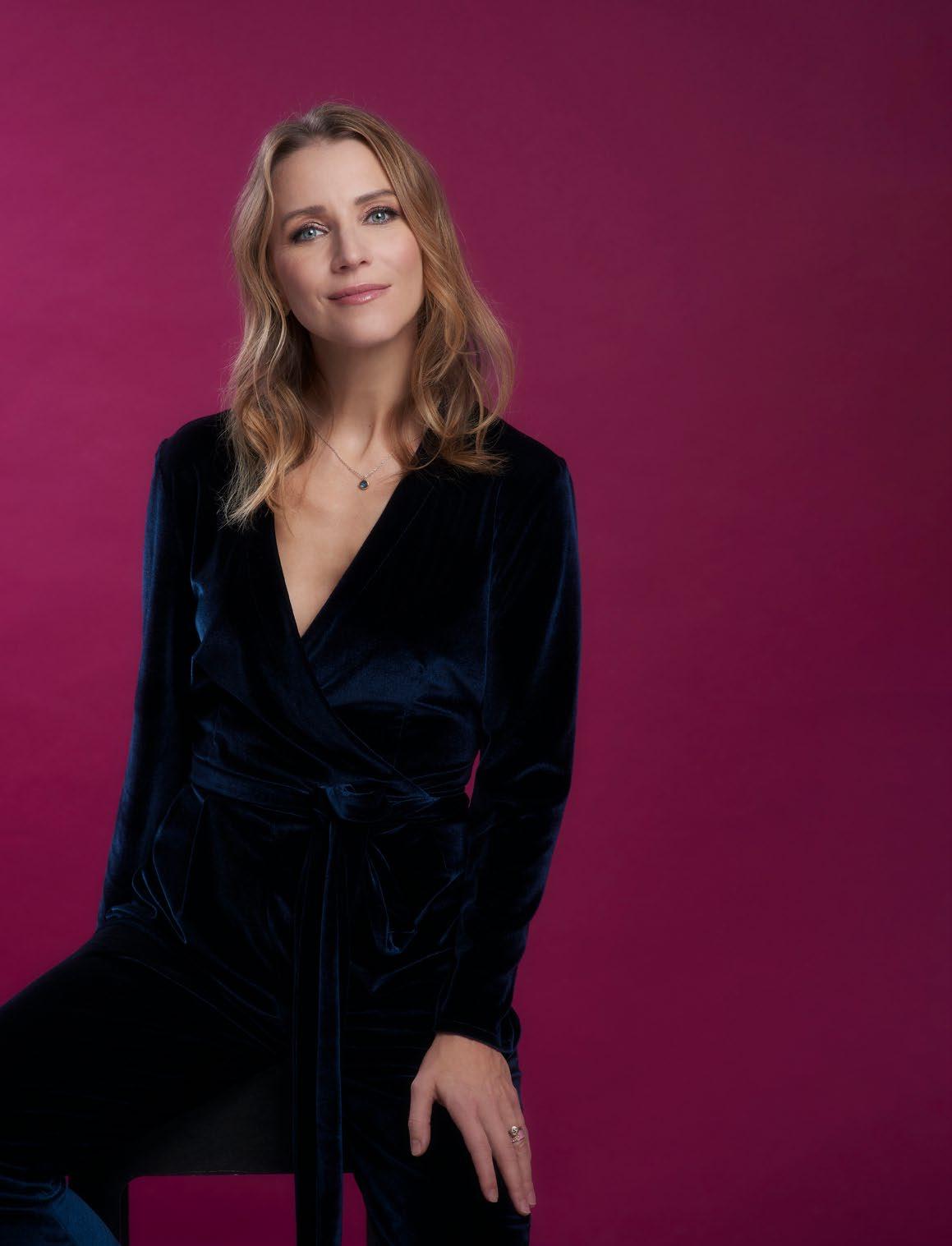
1Commander Pirx is an adaptation of Stanislaw Lem’s short story “The Inquest”. When Lem wrote the Tales of Pirx the Pilot at the end of the 1960s, the moral questions related to artificial intelligence were intellectual mind games. Today, they have become questions that affect our reality. We have developed the story Commander Pirx, and consulted with professionals from military experts to futurologists. Currently we are looking both for Estonian and European directors to form a creative partnership to bring this ambitious and yet universal story alive.
The trilogy of medieval detective stories Melchior the Apothecary turned out to be very popular. The first two parts of the film have collected more than 200 000 viewers in Estonian cinemas, and the third part will be premiered in spring 2023. The trilogy has also been remarkably successful among international audiences – for instance, it is now dubbed in German and will soon reach the markets of Amazon and Deutsche Telekom. One of the keys to success is its flexible format – Melchior the Apothecary can be watched both as full-length features as well as a 6-part TV series.
Currently, we are working on the next trilogy of Melchior the Apothecary. The co-production partners from Estonia, Latvia, and Lithuania have all confirmed their willingness to continue the collaboration. Today we are looking for a German co-production partner.
Veenus.Me is an experimental film that uses the mediums of dance and music to tell a story about self-expression, freedom and the power of unity in the context of queer club culture and social media. Film directors Rene and Carmel Köster are representatives of the queer community, and therefore the message of the story and related themes can be authentically studied and mediated to the audience.
2The fact that the Baltic states will be in focus at this year’s Berlinale, one of the largest film markets in Europe, is certainly remarkable and the fantastic result of the enormous work and effort of local film professionals and the representatives from our film institute. I hope that our film projects will find inspired co-production partners, and I will have an opportunity to get to know new talents; but my greatest wish is that the Baltic countries could show the rest of the world the uniqueness of the talents and filmmakers of our region. And why not to also have a bit of fun, since it was not so long ago when the excitement of going to festivals was out of reach.
1Currently our production company Mistrus Media is working on production of the feature film Maria’s Silence (produced by Inese Boka-Grube and Gints Grube) by director Davis Sımanis, one of Latvia’s most internationally prominent directors. The film tells the life story of European silent film era star Maria Leiko. Our co-production model for the feature Maria’s Silence was to include regions with similar historic experiences, that in terms of filmmaking would add the talents and possibilities of different countries in creating a film about a significant experience of the shared European 20th century history that is still important today. We are delighted to continue working together with our co-production partners in France (Lilith Films) and Lithuania (Broom Films).
Other projects to highlight would be the feature-length documentary Emptiness (director Viesturs Kairišs, produced by Elına Gedin¸a-Ducena - a German, Italian, and Romanian co-production about the emptiness of different European regions in the beginning of the 21st century), TV series Boarding House in a Manor and the 2nd part of the documentary Coming of Age by Latvian documentary maker helmer Ivars Seleckis, that after seven years continues following the life stories of seven children in Latvia.
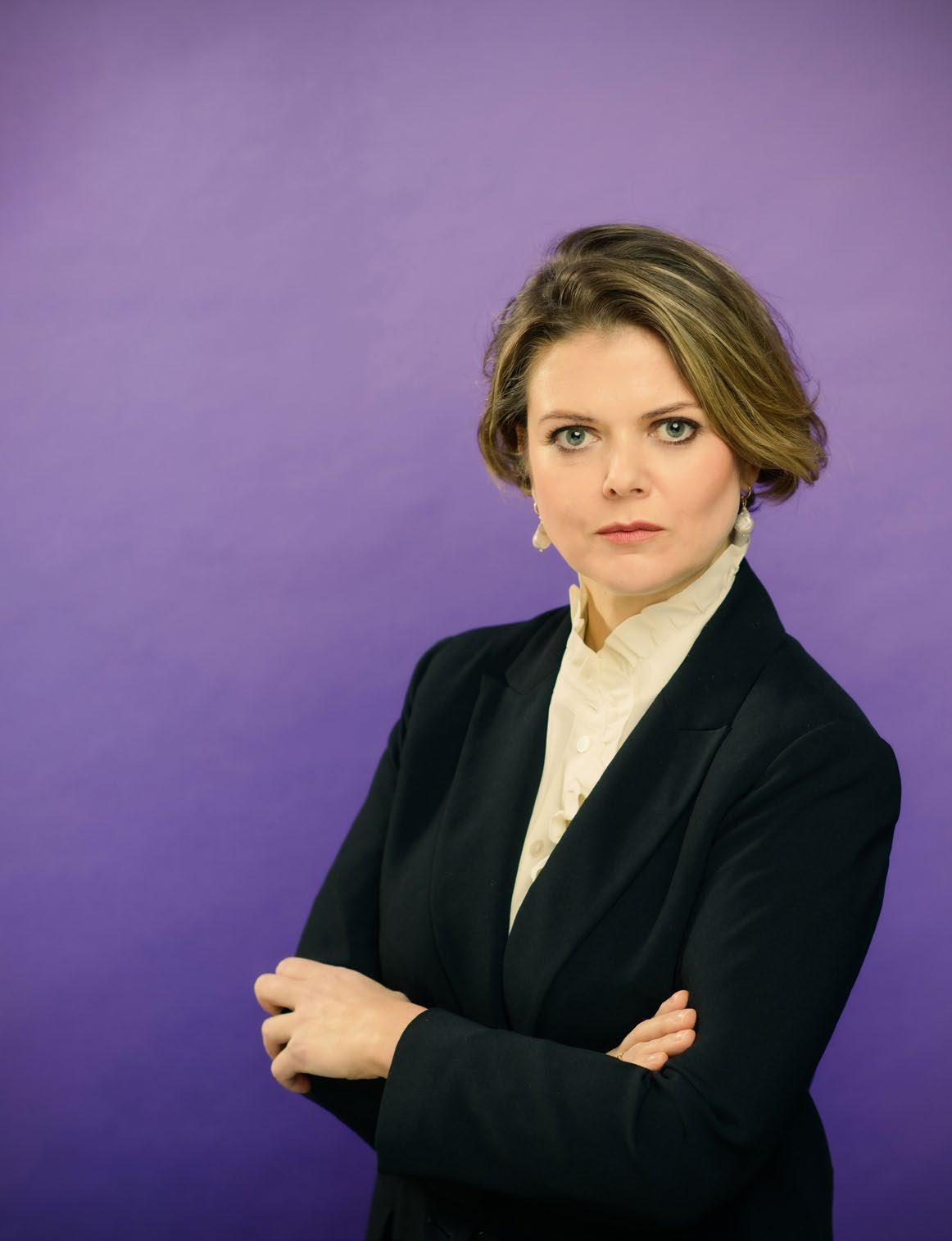
2As one of the leading film production companies in Latvia, Mistrus Media produces films as international co-productions, therefore we are interested in discussing our upcoming films with new co-production partners, as well as work on the international sales of our recently released features – January (2022) by director Viesturs Kairišs (WP Tribeca FF, Best International Narrative), The Land (2022) by director Ivars Seleckis (WP IDFA) and Samuel’s Travels (2021) by director Aik Karapetian (WP Fantastic Fest). During the past years Mistrus Media has acted as co-production partner and as service production partner for several internationally acclaimed features (Natural Light by Denes Nagy, 2021 WP Berlinale, Hatching by Hanna Bergholm, 2022, WP Sundance). We are interested to discuss new minority co-productions of feature films and film projects looking for service production and cash rebate in Latvia.
What are you currently working on?
Your expectations for this year’s Berlinale?
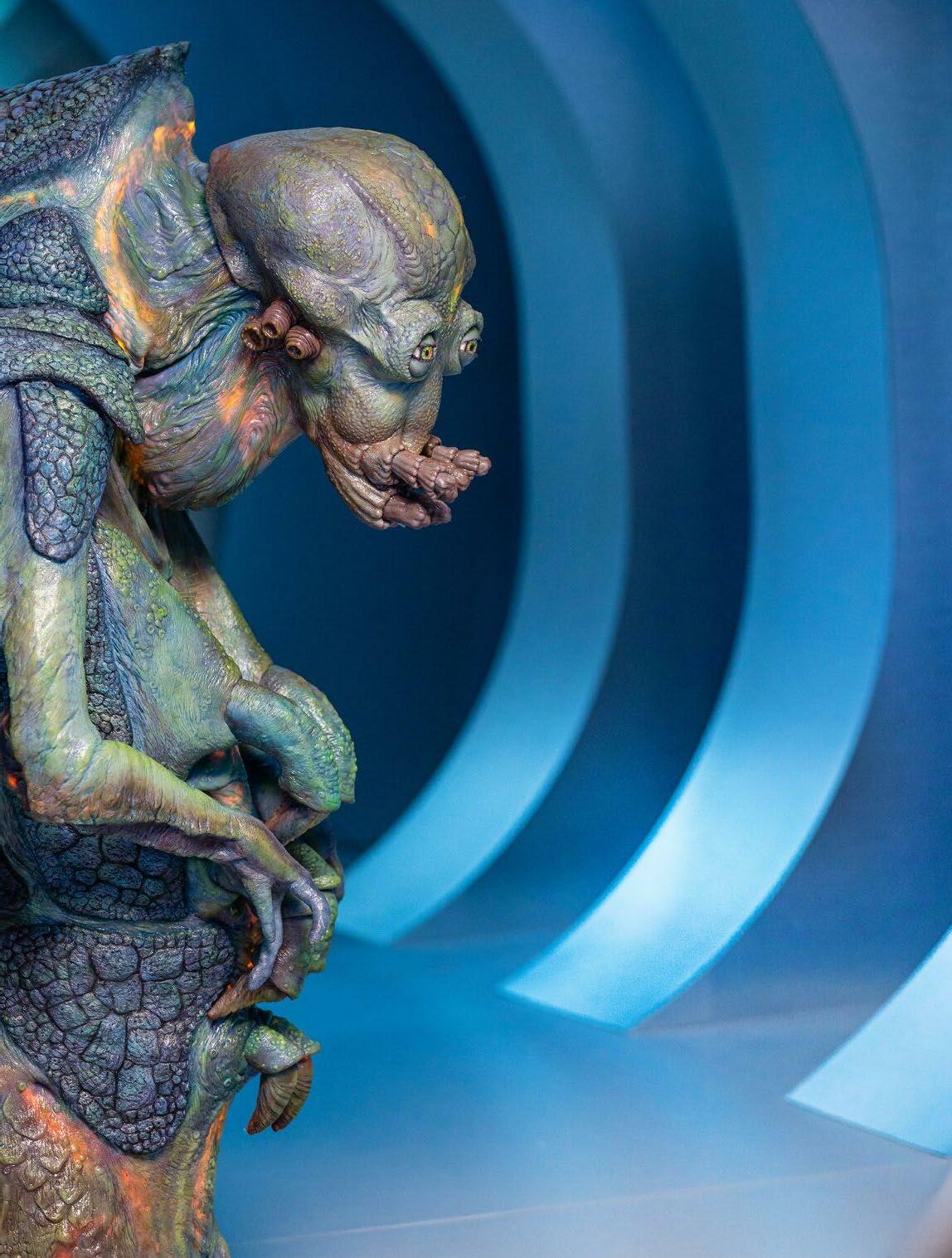
The Little Comrade was a success story both domestically and abroad, is now in post-production with her new project.
 By Maria Ulfsak Photos by Priit Grepp
By Maria Ulfsak Photos by Priit Grepp
Black Hole is a full-length feature film and its genre can be described as an absurdist comedy. It is a funny, but at the same time critical view on the modern world, where people are affected by the media and are suffering because of their prejudices and fears. The script, written by Siimets herself, is inspired by two novellas from Armin Kõo-
mägi, “Black Hole” and “Spider”, and Andrus Kivirähk’s novella “A Life Worth Living”. The film is produced by Riina Sildos (Amrion, EE), and co-produced by Jussi Rantamäki (Aamu Film Company, FI).
The budget of Black Hole is 1.8 million euros and it is set to premiere in 2024.
The events of the film start in a suburban tower block district. Uma is a young lonely gay woman, Maret and Sirje
are two middle-aged ladies who are best friends and who dream of finding a job in Finland. And Jüri is a romantic esoteric - a bachelor living with his mother. They are all longing for happiness and love, each in their own way. When aliens, a giant spider, and an Austrian wearing breeches turn up, their dreams fade like stars lost in a black hole…
According to the director Moonika Siimets, the film is about humanity’s moral decline and people’s inability to connect. The characters try to find love, intimacy, and happiness in a world where sincere feelings, gratitude, and human values no longer have a place. “Through the film, I am looking for an answer to a question: is what we want what we really need,” comments Siimets.
To producer Riina Sildos, this is already the fourth film with the director. Sildos says that Siimets has always very clear visions as a director about the film she is creating - and that she can make the

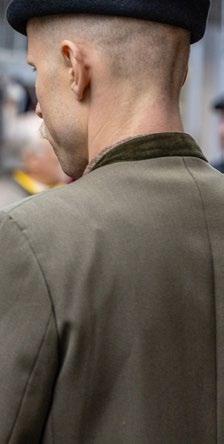
whole crew believe in it. “Her ideas are always humanistic, sharp and in a way critical about the society. But she can always tell her stories through humour and self-irony, in a viewer-friendly way.” According to the producer, the shooting period that took place in autumn 2022 was a tough challenge. “For the first time for us, we used an extremely complicated animatronic for our alien. It was built by our team here in Estonia and one top team in Spain. How the alien was going to work was the million dollar question, because nobody in the local film industry had any experience with an animatronic like this.
Luckily, we found out that the result was very good! Even so good that all of the crew members fell in love with its deep blue eyes and were petting and hugging it constantly,” says Riina Sildos.
The cinematographer of Black Hole is Ivar Taim, and the editor of the film is Joona Louhivuori. The production designer is Kari Kankaanpää from Finland, the costumes are designed by Liis Plato. The actors in the main roles are Ursel Tilk, Liina Tennosaar, Kristo Viiding, Jekaterina Linnamäe, Rea Lest, Doris Tislar, Eva Koldits, Anne Reemann, Hannu-Pekka Björkman. BF



When aliens, a giant spider, and an Austrian wearing breeches turn up, their dreams fade like stars lost in a black hole…
What are you currently working on? Your expectations for this year’s Berlinale?

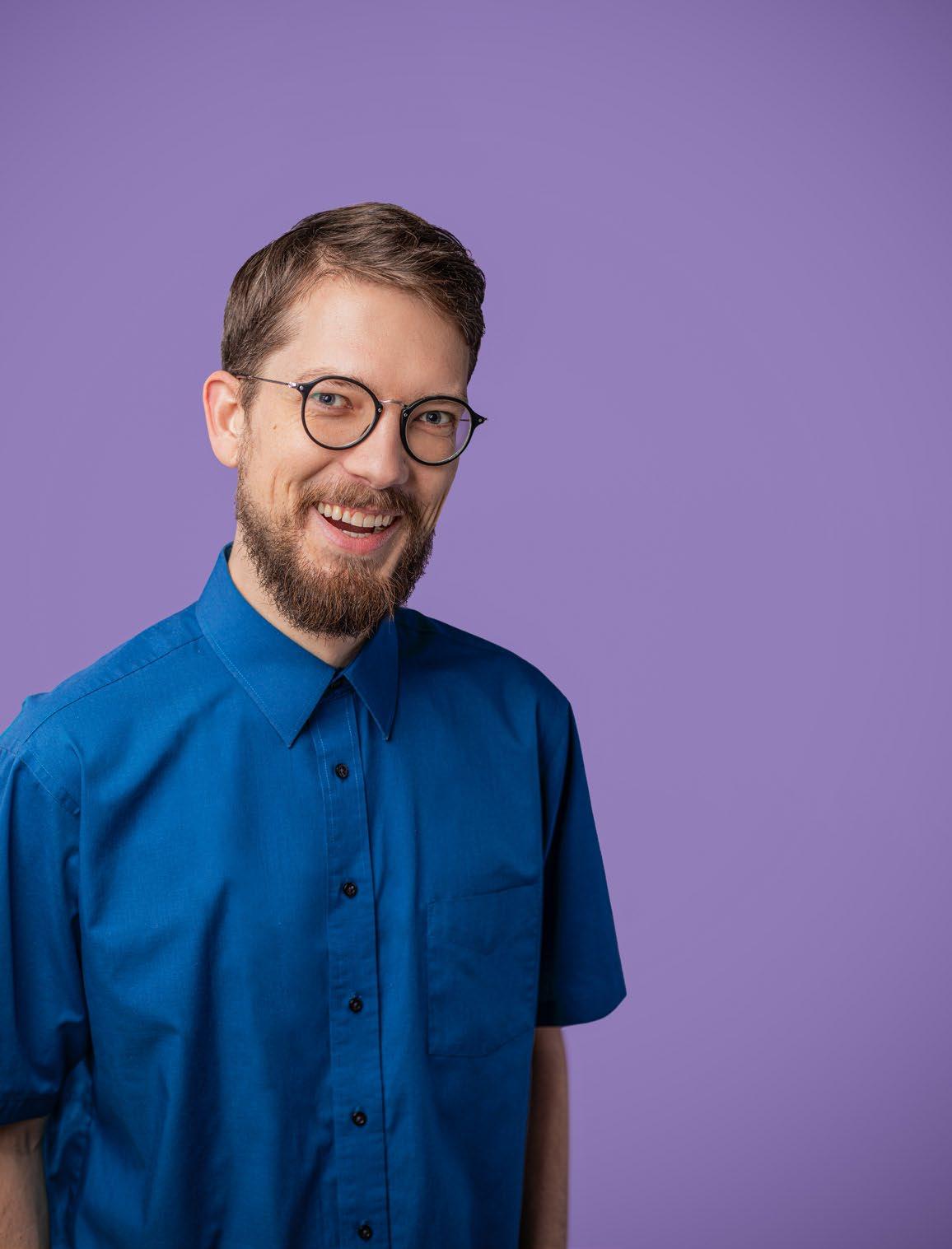
1As a producer, director and writer, I’m creating a trilogy of queer male love stories in different cinematic genres and political contexts. The Lawyer (2020), funded by the Lithuanian Film Center, tells the romantic story of a Lithuanian lawyer Marius (Eimutis Kvošciauskas) and a Syrian refugee Ali (Dogaç Yıldız). The film connected well with a global audience: sold to eight international distributors, dubbed in French and Portuguese, screened at 33 film festivals including seven opening, centrepiece and closing ceremonies.
The Activist, co-written with Marc Davic Jacobs and Vitalija Lapina, features a printing press worker Andrius (Robertas Petraitis) who infiltrates a neo-Nazi group to find the killer of his boyfriend, activist Deividas (Elvinas Juodkazis). With this noir coded thriller, I’m excited to centre queer characters, allowing them to be strong heroes, villains, femmes fatales. We received development funding from the Lithuanian Film Center, and the film should be ready in early 2024.
The Writer, co-written with Marc David Jacobs, Anastasia Sosonuva and Arturas Tereškinas, is an intimate story of two sixty-year-old queer men reconnecting after 30 years. Kostas (Bruce Ross) and Dima (Jamie Day) met while serving in the Soviet army in the 1980s, and Dima joined Kostas in moving from Russia to Lithuania. But after Lithuania gained independence in the 1990s, Kostas left to study in New York, leaving Dima behind. Kostas has now published his third fiction book, based on their separation. Upon reading it, Dima pays a visit to correct a few facts. It’s an English-language, privately funded project co-produced with Artysta Management GmbH (Glenn Elliott, Germany) and Dead Heat Pictures LLC (Aidan Tumas, United States). We will premiere it in early 2024 or 2025.
2Pursuing my career as a queer filmmaker, I broke glass ceilings every step of the way, and I’m proud that my films enjoy worldwide appeal. Now I want to connect with more international collaborators: programmers, distributors, agents!.
film@vilnius lt FilmVilnius.com

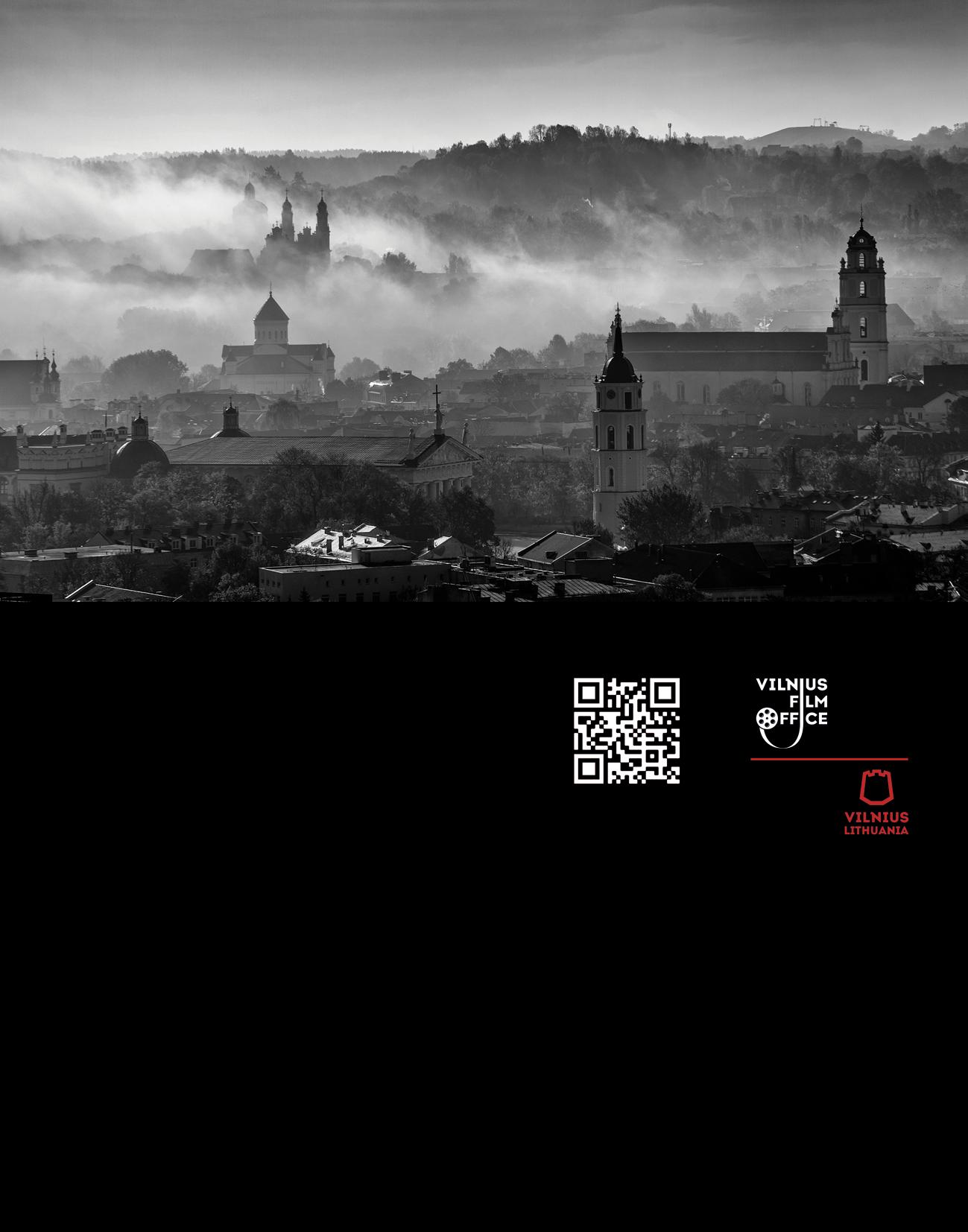


Welcome to the Baltic filmscape! Here you can find a short (but hopefully sufficient) guide to key film festivals and industry events in the Baltic countries.

 By Tristan Priimägi
By Tristan Priimägi
ESTONIA
Black Nights Film Festival (PÖFF) is the biggest Estonian film festival, and founded in 1997. Since 2014, it is the only FIAPF-accredited A-category film festival in the Nordic region, with 78,825 admissions in 2022. It takes place in November, offering people a true experience of Nordic darkness, mainly illuminated by two of the festival’s main programs consisting solely of world and international premieres – main competition and debut competition – and
quite a few intriguing side programs. Closely connected to PÖFF and taking place at the same time is Industry@Tallinn & Baltic Event – a cluster of different industry initiatives, including the Baltic Event co-production market, series market, and film market; Discovery Campus, European Genre Forum and many others. In 2022, they hosted 760 industry delegates from 55 countries.
In the documentary field, DocPoint Tallinn is providing quality documentary
art from all over the world. Taking place in the beginning of February, it offers hits from the previous year and brand-new films, with an emphasis on current affairs, artistic docs, and exotic locations.
It is a sister festival to DocPoint Helsinki, and besides the festival program, Helsinki and Tallinn are also connected through DocPoint FINEST Market, presenting a selection of new Finnish and Estonian documentaries to international documentary professionals. Outside Tal-

linn, Matsalu Nature Film Festival specialises in nature documentaries, and Pärnu Film Festival in anthropological films.

As a country with a strong tradition in animation, Estonia deserves its own animation festival – a spot filled by Animist, founded in 2021, bringing the best of modern animation to its audience, and introducing fresh Estonian animation. Extensive international competition is divided in blocks by theme, and complemented by lectures and workshops, seeking connection points between animation and other fields of life.
Latvia’s capital Riga is hosting its biggest film event, Riga International Film Festival, taking place in autumn. It was established in 2014 and quickly became one of Latvia’s most celebrated cultural events. In their programming, RIGA IFF aims to mix the old with the new, and the obscure




with the famous. Every October, around 200 films are screened, with an audience of about 25,000. RIGA IFF FORUM is visited by about 500 film professionals each year, with an aim to strengthen old connections and create new ones. Every year the main prize of the festival, the Golden Rooster, goes to a feature film from the Baltic Sea region.
Artdocfest is holding up the flag of quality documentaries in Latvia. The festival was founded already in 2007 as Artdocfest in Moscow by the acknowledged documentary filmmaker Vitaly Mansky, but the festival had increasing troubles with the powers. In 2014, Mansky moved to Riga and started the Artdocfest section at RIGA IFF. Since 2021, Artdocfest/ Riga has been running separately, and the third edition of the festival is coming in March, with the focus on Ukraine and the topics of war.
The most experienced industry event in Latvia is the Baltic Sea Forum for Documentaries (Baltic Sea Docs), taking place in September and bringing together documentary professionals from the Baltic, Nordic, Eastern European countries and Caucasus to introduce a variety of documentary projects to potential funders, buyers, and programmers. Baltic Sea Docs was founded in 1997 and initially took place in Denmark, and was a travelling event between the Baltic countries since 2002, only to settle down permanently in Riga in 2006.
Lithuania’s biggest film festival is Vilnius International Film Festival “Kino Pavasaris”, founded 28 years ago, and taking place in spring (the title is a hint, pavasaris means spring in Lithuanian). Over the
years, it has seen an upsurge in attendance and media coverage, securing its position on the Nordic-Baltic festival landscape and in Lithuania’s cultural life.
Another significant feature film event in Vilnius, Scanorama, focuses its programming on contemporary European cinema and cinematic trends, presented in different thematic sections.

Regarding documentaries, Lithuania has two main events that have an international focus.
Inconvinient Film Festival is the only documentary film festival in the Baltics with a specific focus on human rights, looking to unite cinema and activism. Running as a hybrid event it is one of the most attended documentary film events in Lithuania, attracting more than 17,000 participants per edition. Skalvija Cinema Center in Vilnius hosts a smaller, cosier alternative, the Vilnius Documentary Film Festival, launched in 2004. Vilnius Documentary Film Festival aims to show documentary filmmaking in its infinite variations, introducing renowned guests and thematic discussions.
Vilnius International Short Film Festival is the only short film festival in Lithuania and one of the biggest short film festivals in the Baltic countries. Established in 2006, the festival has become a unique platform in Lithuania, screening the newest and best short films from all around the world made by the upcoming generation of talented filmmakers. Vilnius is also a home city of the well-known short film industry event Baltic Pitching Forum which presents the newest short film projects from Baltics. Both Vilnius ISFF and Baltic Pitching Forum are organized by the Lithuanian short film agency Lithuanian Shorts. BF
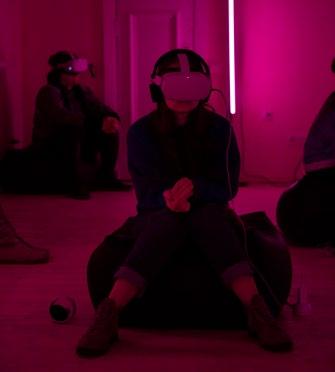
Black Nights Film Festival (PÖFF)
November 3-19, 2023
Poff.ee
Industry@Tallinn & Baltic Event
November 13–17, 2023
Industry.poff.ee
DocPoint Tallinn
January 31 – February 5, 2023
docpoint.ee/en/
Matsalu Nature Film Festival
September 20 – October 1, 2023
www.matsalufilm.ee
Animist Tallinn
August 17–20, 2023
animistfestival.eu/en
Riga International Film Festival
October 12–22, 2023
rigaiff.lv/en/
Artdocfest Riga
March 2–23, 2023
www.artdocfest.com
Baltic Sea Forum for Documentaries
September 4–10, 2023 balticseadocs.lv
European Film Forum Scanorama
November 9–19, 2023
www.scanorama.lt/en
Human Rights Film Festival
“Inconvenient Films”
October 2023
Vilnius Documentary Film Festival
September 21 – October 1, 2023
vdff.lt/en/festival
Vilnius International Film Festival
“Kino Pavasaris”
March 24 – April 3, 2023
kinopavasaris.lt/en/
Vilnius Short Film Festival
January 18–24, 2023 lithuanianshorts.com
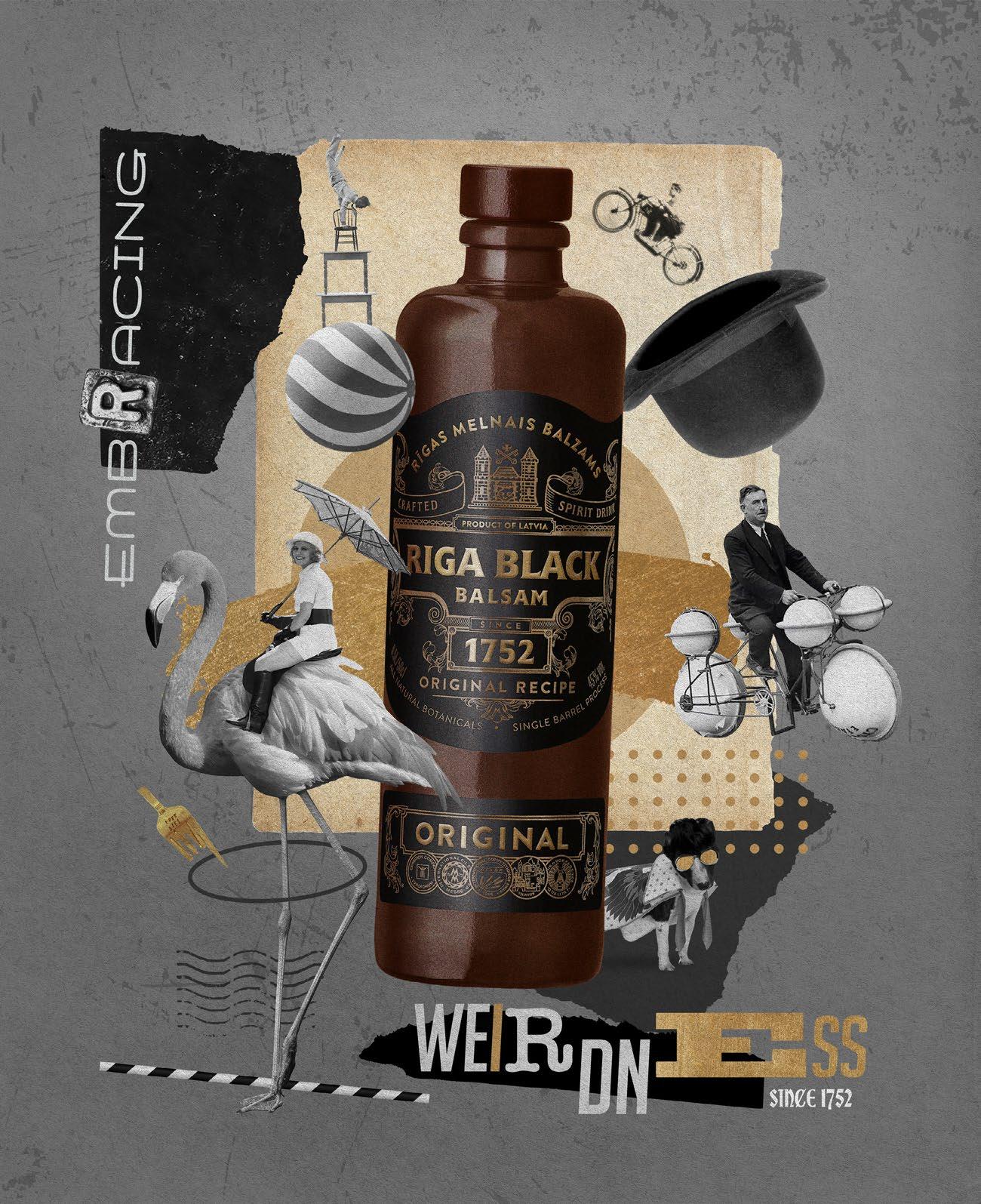
Budget 2023: € 5,500,000
• Financing for an Estonian co-producer the maximum subsidy is € 800,000
• Subsidy of up to 70% of the budget
• 50% of the subsidy must be spent in Estonia
• Two application deadlines: April 18 and November 28, 2023
Budget 2023: € 600,000
• For producers from all over the world. Participation of an Estonian co-producer is necessary. Bilateral treaty not necessary
• Maximum subsidy for an Estonian co-producer: feature film and feature animation € 200,000; documentary € 60,000
• Subsidy of up to 70% of the Estonian part of the budget
• 100% of the subsidy must be spent in Estonia
• Estonian creative and production related participation in a project should meet the requirements of minority co-production grading table
• Two application deadlines: March 14 and September 19, 2023
• Decision in 40 days
Budget 2023: € 4,000,000
Film Estonia cash rebate is a production incentive supporting the incoming production of feature films, feature documentaries, animation films, animation series, high-end TV-drama and the post-production of all previously mentioned works. An application can be made for international production service or co-production to receive a cash rebate up to 30% on eligible production costs.
• Support intensity – 20%–30% of eligible costs
• Deadlines – open call
• Applicant – company registered in Estonia
• Recipient – foreign company
• Decision – in 30 days
• Auditing and payment – in 40 days
The scheme is open for:
• feature films with a budget of at least € 1 million; minimum local spend € 200,000
• feature documentary with a budget of at least € 200,000; minimum local spend € 70,000
• animation with a budget of at least € 250,000; minimum local spend € 70,000
• animation series with a budget of at least € 500,000; minimum local spend € 70,000 per series
• high-end TV-drama with a budget of at least € 200,000 per single episode; minimum local spend € 70,000 per series
• post-production; minimum local spend € 30,000
Recently supported films include: Tenet (GB/US), Memory of Water (FI), The Burial (GB), Kill the Child (US), Besa 2 (RS)
CONTACT:
Nele Paves, Film Commissioner nele@filmi.ee filmestonia.eu
If you want to make your film with Estonian partners, these are the film funds ready to finance your project.
TARTU FILM FUND
Type of fund: regional, incentive / cash rebate.
• Budget 2023: € 150,000
• Support intensity: up to 30%
• Objective: production of an audiovisual work in Tartu and Tartu County
• Support for the production of feature films, animations, tv-series, documentaries, short films
• Involvement of an Estonian production company is necessary


• Two application deadlines: April 30 and October 30, 2023
Recently supported films: Omerta 6/12 (FI/EE), Erna at War (EE/DK/BE /EE), Dawn of War (EE/FI/LV/LT), Where the Heart Is (EE), Melchior the Apothecary (EE/LV/LT/DE)
CONTACT: Külli Hansen info@tartufilmfund.ee, kylli@lmk.ee tartufilmfund.ee

VIRU FILM FUND
Type of fund: regional, incentive / cash rebate
• Budget 2023: € 150,000
• Support intensity: up to 40%
• Objective: production of an audiovisual work in the Eastern region of Estonia.
• Support for the production of feature
• films, documentaries, TV-series, short films, music videos
• No deadlines, applications are accepted from February 10 to October 31
Recently supported films: Melchior the Apothecary (EE/LV/LT/DE), Omerta 6/12 (FI/ EE), Dawn of War (EE/FI/LV/LT), Eternal Road (FI/SE/EE), Mihkel (IS/NO/EE), Mother (EE), Erik Stoneheart (EE/LU/LT/FI/LV/UA)
CONTACT:
Piia Tamm piia.tamm@ivek.ee vff.ee
Type of fund: regional, incentive / cash rebate
• Budget 2023: € 28,705
• Support intensity: According to the project
• Objective: production of an audiovisual work on the islands of Saare County
• Support for the production of feature films, animations, tv-series, documentaries, short films and film education
• Participation of an Estonian production company is necessary
• No deadlines
Supported films: Melchior the Apothecary (EE/LV/DE), The Vacationers (EE)
CONTACT:
Saaremaa Development Centre +372 452 0570 / filmifond@sasak.ee minusaaremaa.ee/en/projects/ film-fund-estonian-islands
Travel fast. With an area of just 45,227 km2 all corners of the country are only a couple of hours away
There’s space. Estonia is one of Europe’s least crowded countries
It’s green. 52 % of the country is forest, making it
Public agency that supports culture, including audiovisual art, and sport.
Financing for an Estonian co-producer the maximum subsidy is € 200,000.
• Participation of Estonian co-producer is necessary
• Financing for an Estonian co-producer the maximum subsidy is € 100,000
• There are four application deadlines: February 20, May 20, August 20 and November 20
one of Europe’s greenest countries
Endless summer light. Due to its northern location, Estonia experiences the summertime “White Nights” phenomena, when the sun sets late and the night is dusk at most.
Lots of islands. 2,222 islands and islets
Period-friendly architecture. Medieval old towns, 1000 castles and manors dating back as far as the 13th century. Architecture from Stalinist classicism and soviet modernism.
National Film Centre of Latvia
State Culture Capital Foundation of Latvia
Investment and Development Agency of Latvia (cash rebate)
Riga Film Fund (cash rebate)
Annual State Support for film industry 2022
(from all 4 key funding bodies) – € 10,538,127
Number of film productions supported by the National Film Centre of Latvia in 2022 – 37 films
Minority co-production scheme
• Budget 2022: € 400,000
• For producers from all over the world (except for projects whose delegate producer is a company registered in Russian Federation or Belorussian Republic or who has received or has planned to have funding from the public sources in either country). The participation of Latvian co-producer is necessary. The bilateral treaty is not required.
• Supported films: fiction features (over 65 min), documentaries and animation films of any length. The film must comply with the terms and conditions for a Latvian film (according to the Film Law, a Latvian film is a film, which is produced by a Latvian film producer registered in the National Film Centre producer’s register, and in the key creative team at least one member (director, scriptwriter, composer, set designer, animation artist or cinematographer) is a citizen of Latvia.
• The project can only be submitted by a production company registered in the producers’ register in Latvia and the planned budget from Latvia is at least 20% for bilateral coproduction, and 10% in multilateral coproduction, or, if applicable, comply with the Council of Europe Convention on Cinematographic Co-production.
• The film’s delegate producer must be able to prove at least 50% of financing in place from his/her own country.
• 80% of the subsidy must be spent in Latvia.
• Call once a year, application deadline: March / April.
• Decision: 1 month.
CONTACT:
Inga Blese, Head of Production, inga.blese@nkc.gov.lv
A public agency that supports different strands of culture, including audiovisual sector (various kind of projects: film productions, development, research projects, festivals, etc.).
• Supports documentaries of any length, fiction shorts and animation films.
• Applicant for film projects – Latvian producer.
• Funding for audiovisual sector in 2022:
€ 886,523 (no specific amounts indi-
cated for film productions, depends on the competition and available funding).
• Three application deadlines: January, May, September.
• Decision: 1 month.
CONTACT:
Film curator Gita Krātiņa, gita@kkf.lv
Cash rebate scheme Latvia Co-financing programme for foreign productions The programme is a production incentive supporting the incoming productions of full-length feature films, documentaries and animation films, TV films An application can be made for international production service or co-production to receive a cash rebate of 20-30% on eligible production costs. The support can be combined with other public funding sources in Latvia in case if the Co-financing programme’s support together with other
funding sources does not exceed 50% of the film’s total expenses in Latvia.
• Agreement with the local production company of the collaboration is required.
• Support intensity: 20-30% of eligible costs depending on different criteria.
• Deadlines: open call twice a year.
• Applicant: a company registered in Latvia.
• 2022 base budget - € 793,773, additional financing allocated based on demand - € 2,096,560
• Decision: 1 month.
• The film’s delegate producer must confirm that at least 50% of financing is in place at the time of submission of the application.
The scheme is open for:
• fiction features and animation films with a budget of at least € 711 436;
• feature documentaries with a budget of at least € 142 287.
www.liaa.gov.lv
CONTACT: jautajumi@liaa.gov.lv

The programme is a production incentive supporting the incoming productions of full-length fiction features, documentaries, and TV films. An application can be made for international production service or co-production to receive a cash rebate of 20-25% on eligible production costs. The support can be combined with Latvian co-Financing programme’s funding.
• Support intensity: 20-25% of eligible costs (25% if the film’s story is set in Riga or with significant featuring of Riga in the story, and at least partly
shot in Riga, 20% - if the film is shot in the territory of Latvia).

• Deadlines: open call until 30 September on first come first serve basis until the budget is depleted.
• Shooting must be finished and reports submitted by 30 November.
• Applicant: a company registered in Latvia.
• Annual budget: € 800,000
• Decision: 1 month.
• The film’s delegate producer must confirm that at least 50% of financing is in place at the time of submission of the application.
The scheme is open for:
• fiction films with a budget of at least € 700,000;
• for documentaries the budget not specified.
www.filmriga.lv
CONTACT: Eva Medjāne, eva.medjane@riga.lv
Latvian Television (LTV) is the stateowned public service television company in Latvia. LTV operates two linear channels, LTV1 and LTV7. LTV is part of Public Broadcasting of Latvia, consisting of LTV and radio (6 stations), joint news content and digital access is provided on the broadcaster’s site www.lsm.lv. LTV acquires Free TV and Free VOD rights to drama series, fiction features, documentaries, children’s content, live events, etc. LTV mainly acquires completed films but is also open to considering projects in production if LOC is needed.
CONTACT: Zane Valeniece, Head of Acquisitions, Zane.Valeniece@ltv.lv
OTHER IMPORTANT CONTACTS: Baltic Sea Forum for Documentaries: balticseadocs.lv
Riga International Film Festival: rigaiff.lv/en/
Documentary Film Festival Artdocfest/ Riga: artdocfest.com/en/
Basic facts: Latvia is the member of the EU and NATO. Currency EUR. Latvia covers an area of 64,589 km2, with a population of 1.9 million. Access to high-speed internet in Latvia is among the best in the EU.
Accessibility: Riga, the capital of Latvia, has the largest airport of the Baltics just 20 min drive from the city center. There are more than 100 direct flight destinations.
Locations. Latvia and its capital Riga offer a wide
variety of locations. Riga city has Northern charm, Medieval, Art Nouveau and industrial architecture, as well as Soviet modernism heritage. The most beautiful Art Nouveau buildings in Riga were built by Mihail Eizenstein, the father of the iconic filmmaker Sergei Eizenstein. Throughout Latvia there is wide range of castles, palaces, ancient fortresses and manor houses. The most popular shooting location is Rundale – a baroque
palace built in 18th century, 100 km from Riga Pristine nature: There are four distinct seasons in Latvia. Over 500 km long white sand beaches –the coastline of the Baltic sea. Abundancy of rivers and forests, lakes and swamps.
Advantages of filming in Latvia: Internationally experienced technical crews, strong art department and construction teams, competitive costs, stages and backlots, wide range of extras.

Learn more about how to save money while making your dream project in Lithuania come true. The key funding body: Lithuanian Film Centre
The Lithuanian Film Tax Incentive came into effect in January 2014 as a new policy measure to foster local and foreign film production in Lithuania.
The Lithuanian Film Tax Incentive provides an opportunity to save money on film production budgets through a private investment scheme.
Key information
• Save up to 30% of your film production budget
• Available for the production of feature films, TV dramas, documentaries and animated films, including domestically produced, co-produced or commissioned films (produced under the service agreement).
As a foreign filmmaker, you must cooperate with one of the local production companies that submit the application. The local company takes the responsibility for finding a local business company willing to support up to 30% of your production budget in exchange for reduced corporate income tax.
The Film Tax Incentive is only available for films that meet the approved production and cultural criteria requirements. For more detailed information on the requirements, visit www.lkc.lt/en.
The project has to meet all of the following production criteria:
• At least three days of shooting take place in Lithuania in the course of the production (except for animation projects);
• At least 20% of an animated film’s production costs in Lithuania must be incurred for producing two of the elements: shooting (if it is required by the script); characters and/or backgrounds design; layouts and/or storyboards; visual effects;
• At least 51% of the crew hired by the Lithuanian production company are citizens of Lithuania or citizens of other European Economic Area (EEA) countries.
• The total amount of eligible spend in Lithuania has to be no less than
€ 43,000
Due to the Lithuanian Film Incentive, in 2022 film productions received
€ 17,862,777
• Foreign projects received € 10,537,162
• Co-production projects received € 1,858,855
• National projects received € 6,205,927
In 2022, the Lithuanian Film Incentive was used by 63 national, 9 co-production and 13 foreign (production service-based) film projects.
The biggest foreign projects that benefited from the Lithuanian Film Incentive in 2022:
• Sci-fi feature film Paradise (Germany, Austria, Switzerland – Netflix), € 2,752,762 received;
• Adventure TV show Ronja the Robber’s Daughter (Sweden – Viaplay)
€ 2,119,970 received;
• Historic mini-series Sisi 2 (Germany, Austria – Epic Drama) € 2,097,989 received.
Requirements in order to be considered a minority co-production:
• Co-production (preliminary) agreement that complies with the provisions of the European Convention on Cinematographic Co-production or other international Co-production Treaties between Lithuania and other countries.

• Production companies must deliver substantial information confirming that the financing for production which makes no less 50% of the whole budget has already been committed;
• 95% of the financial grant should be spent in Lithuania;
• A script or script treatment in Lithuanian.
Maximum amounts of funding per project (agreements must be provided):
• Up to € 100,000, if the project involves at least one Lithuanian film editor, sound director, costume designer, main actor, senior animation artist, or senior animation frame artist;
• Up to € 200,000, if the project involves at least one Lithuanian co–author–director, scriptwriter, director of photography, production designer, composer, director of animation, or senior animation character artist.
For more information regarding funding, please contact:
Deimantas Saladžius
+370 6586 8822 d.saladzius@lkc.lt
Basic facts: Lithuania is a country in the Baltic region of northern-eastern Europe, with a population of 2.8 million. One of the three Baltic states, it is situated along the south-eastern shore of the Baltic Sea. Lithuania is a member of the EU; its currency is the euro; official language – Lithuanian although English and Russian are widely spoken.
Locations: with an area of 65,200 square kilometres, Lithuania is full of unique
Irma Šimanskytė +370 6193 6334 i.simanskyte@lkc.lt

and versatile locations. Vilnius, Lithuania’s capital, was founded in 1323. Its Old Town is one of the largest in Europe and is a designated UNESCO World Heritage Site.

The three biggest cities, Vilnius, Kaunas and Klaipėda, are full of architectural monuments that speak of a multifaceted history and offer gothic, neoclassical, baroque, art-deco, constructivist, and contemporary backdrops.
lkc.lt/en
Nature: 30% of the country is covered with forests, there are 2 830 lakes larger than 0.5 hectares, and 18 rivers longer than 100 kilometres. Thanks to its four seasons, Lithuanian landscapes are rich with colour from white to yellow, red and orange, to green and blue.
Advantages of filming in Lithuania: talented & experienced crew, highspeed internet, wide range of filming backdrops in one place, perfect for projects set in any time period.









Filled with promise, the nine emerging producers participating in the Visitors’ Programme of Berlinale Co-production Market are fresh, energized and ready to innovate.


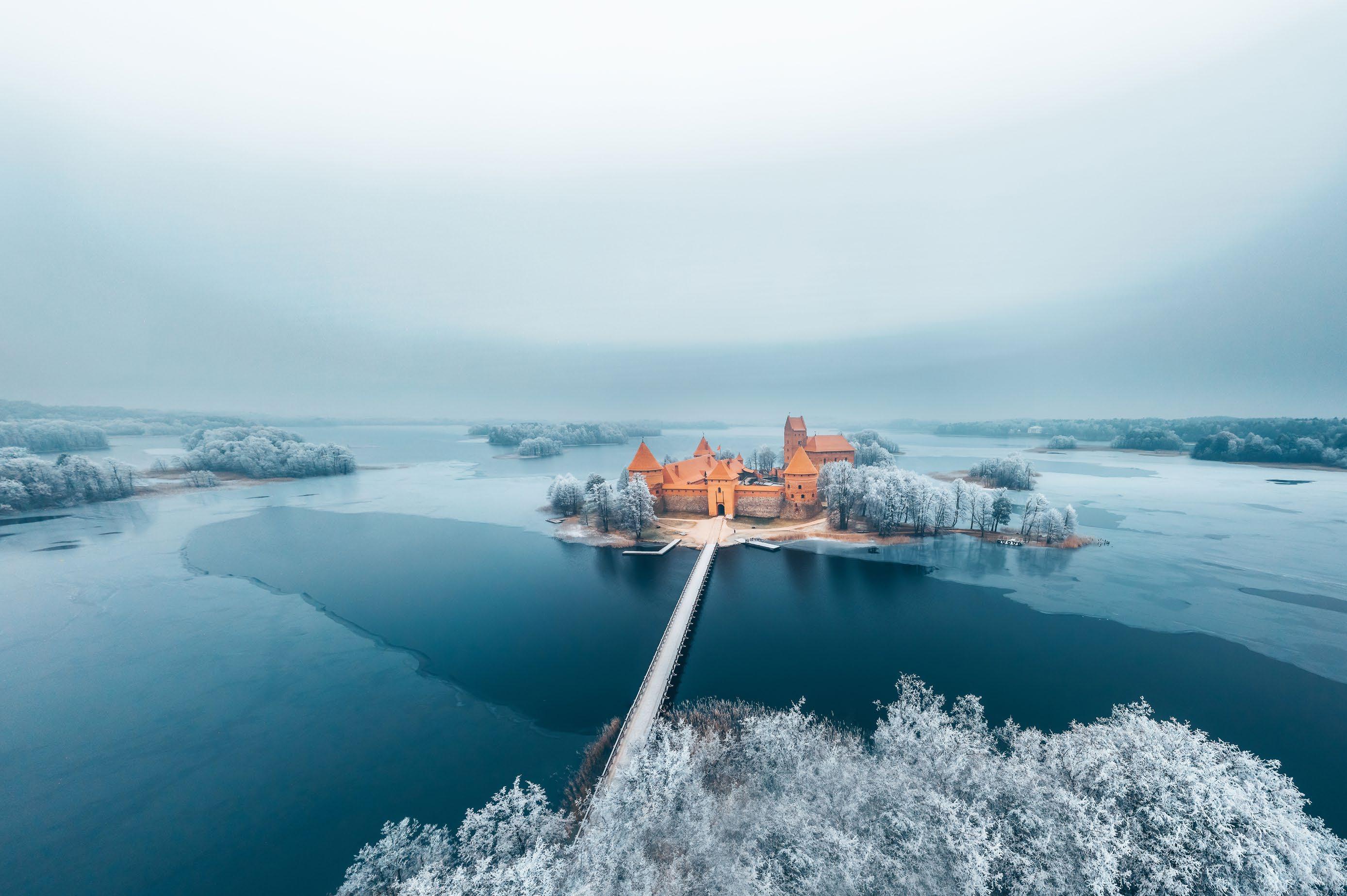
It is 1991 in Latvia and nineteen-yearold aspiring cinematographer Jazis’s whole world is thrown into chaos as he is dragged into the people’s peaceful protests against the Soviet Army’s attempted takeover of power in his country.
January is an autobiographical take on the political upheaval in the early 1990s that changed the lives of the people of the former Soviet Union. Jazis and his friends Anna and Zeps are all aspiring filmmakers, trying to pursue their dreams of making movies and enjoying the freedom of young adulthood, when the collapse of the political system in the region upends their plans, family ties and
friendship. Their experience and participation in the nonviolent resistance through the construction of barricades and human shields becomes the defining moment in their coming-of-age.
DIRECTOR VIESTURS KAIRIŠS
is a scriptwriter, film and theater director. Previous features The Sign Painter (2020) and The Chronicles of Melanie (2016) premiered at the Tallinn Black Nights Film Festival. Leaving by the Way (2002) premiered at Karlovy Vary in competition, and documentary Pelican in the Desert (2014) screened at Visions du Réel competition.
Original title: Janvāris
Genre: historical drama
Languages: Latvian, Russian

Director: Viesturs Kairišs
Screenwriters: Viesturs Kairišs, Livia Ulman, Andris Feldmanis
Cinematographer: Wojciech Staroń
Production Designer: Ieva Jurjāne
Editor: Armands Začs
Composer: Justė Janulytė
Sound: Jonas Maksvytis
Main cast: Kārlis Arnolds Avots, Alise Dzene, Baiba Broka, Aleksas Kazanavičius, Juhan Ulfsak, Sandis Runge
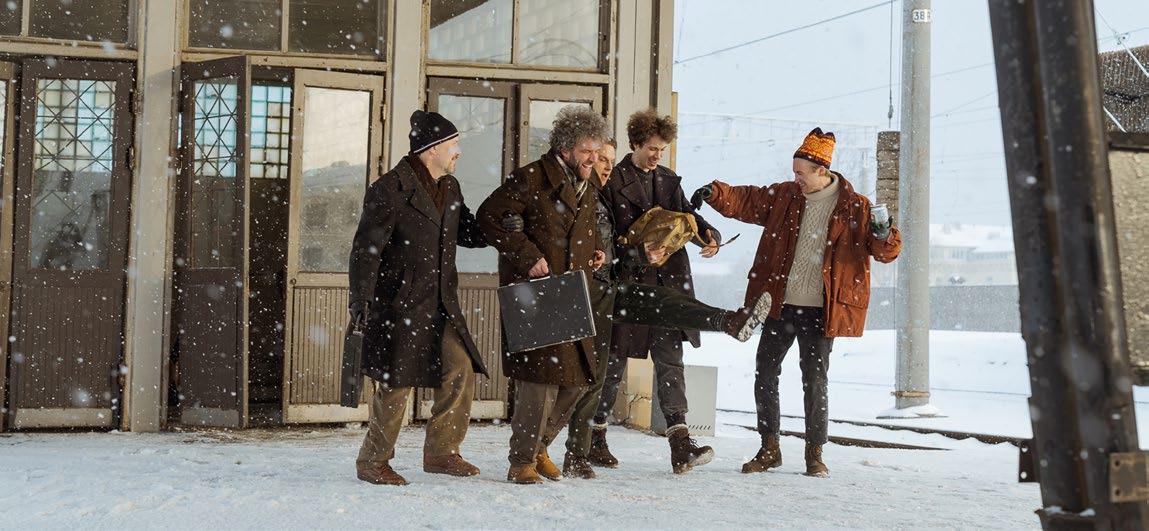
Producers: Inese Boka-Grūbe, Gints Grūbe
Co-producers: Małgorzata Staroń (Staron Film, PL), Kęstutis Drazdauskas (ArtBox, LT)
Produced by: Mistrus Media
World premiere: Tribeca IFF 2022Best international Feature film
Festivals and awards: Warsaw IFF, Rome IFF, Ankara IFF, Nordic Flm Days Lubeck, Tallinn BNFF, Scanorama IFF
97 min DCP 4:3 5.1
Mistrus Media Inese Boka-Grūbe
+371 2925 9580
inese@mistrusmedia.lv
www.mistrusmedia.lv
SALES
The Yellow Affairs Karoliina Dwyer
+1 718 290 5914 (US) / +358 50 360 0350 (FI)
karoliina@yellowaffair.com
www.yellowaffair.com
Anastasia and Diana are two sisters living in a Latvian orphanage. When they get to know that an American family is ready to adopt them, Diana cannot wait to move to the States, while Anastasia is less excited about the idea of leaving her home. When their estranged biological mother Alla returns to their lives, Anastasia does everything to establish a relationship with her, but Alla has other plans.
The focus of her current creative path in film is tied to social issues, especially concerning families and children. Linda’s work on the documentary My Father the Banker (2015) earned her a National Film Award for Best Editing. After many years of working in Latvian Television on several successful programs, series and shorts, Linda’s debut feature Sisters (2022) is the winner of the 1-2 competition at the Warsaw International Film Festival in 2022, and has since toured many festivals worldwide. She is currently developing her next feature film The Child
Original title: Māsas
Genre: drama
Languages: Latvian, English
Director: Linda Olte
Screenwriter: Linda Olte
Cinematographer: Aleksandrs Grebņevs
Production Designer: Laura Dišlere
Editor: Linda Olte, Andris Grants
Composer: Federico Campana
Sound: Aleksandrs Vaicahovskis
Main cast: Emma Skirmante, Gerda Aljēna, Katrīna Krēsliņa, Iveta Pole
Producers: Matīss Kaža, Una Celma, Dace Siatkovska
Co-producers: Wilfried Gufler, Thomas Menghin, Debora Nischler
Produced by: Trickster Pictures (LV), Fenixfilm (LV), Deep Sea Studios (LV), Albolina Film (ITA)
Domestic Premiere: October 2022
Festivals: Warsaw IFF Festival (Main Prize 1-2

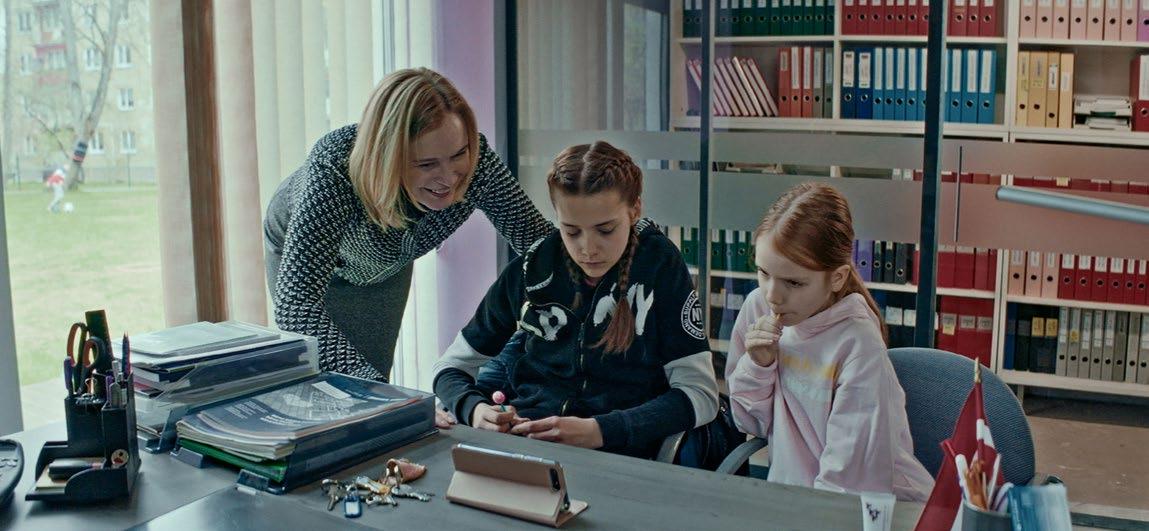
Competition, FIPRESCI Award), Tallinn BNFF 2022, Nordic Film Days Lubeck

104 min DCP 2.39:1 5.1
Trickster Pictures Matīss Kaža
+371 2003 0221
matiss@trickster.lv
www.trickster.lv
SALES
True Colours
Gaetano Maiorino
+39 333 965 7567
gaetano@truecolours.it
www.truecolours.it
On February 24, 2022, Yevhen went to the front. He began to record everything that surrounded him. His own feelings, tens of thousands of refugees and his friends, with whom he went to war. Yevhen is a member of the volunteer medical battalion “Hospitallers”. The task of the battalion is to provide first aid on the front line and to evacuate the wounded to headquarters or frontline hospitals. This mobile unit is the main characters of the film. Six months full of drama, despair, fear, hatred, bitterness, love and, most importantly, faith in victory.
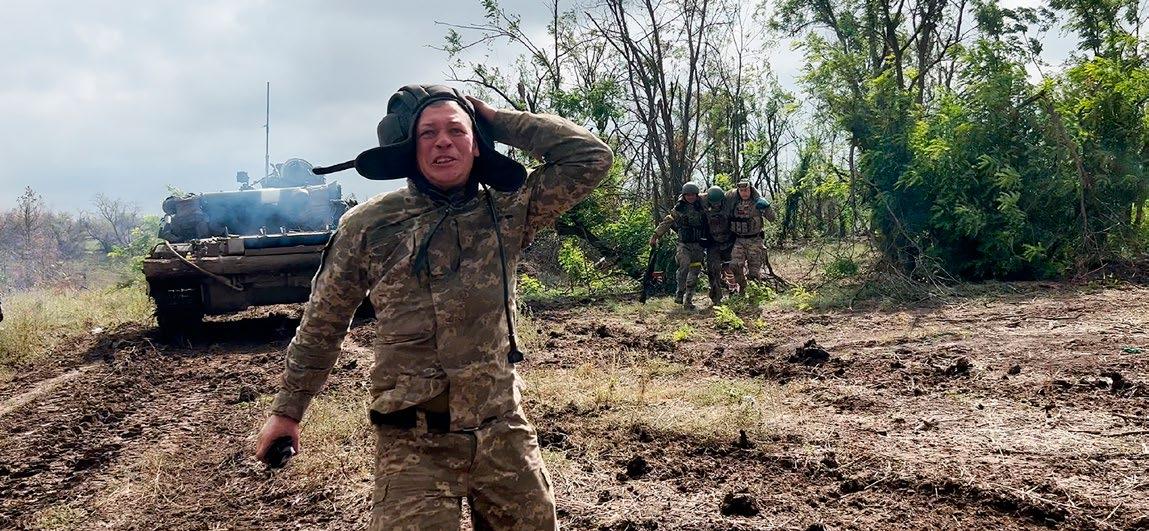
When they went to war, our heroes sent their families to the rear of the war front - to a village in the west of Ukraine. It was in this village that all the young men came to visit their relatives before the large-scale counterattack of the Ukrainian army in the southern direction. Not everyone is destined to return alive and in good health. They come to the rear to say goodbye to their loved ones and to baptize the nine-month-old son of Subota. And right from the festive table, they have to go back to war...
DIRECTOR VITALY MANSKY
was born in 1963 in Lviv /Ukraine. He graduated from VGIK – All-Russian State Institute of Cinematography in 1989 and became one of the most prominent contemporary Russian documentary filmmakers and producers. He has shot more than 30 films as a director which were screened at festivals worldwide and
were awarded several times. As a producer, Mansky produced films with directors like Renata Litvinova, Alexander Rastorguyev, Sergey Miroshnichenko, Dmitry Zhelkovsky, and Sergei Loznitsa. Since 2014, he lives in Latvia. And is a Founder of IDFF Artdocfest/Riga.
is an Ukrainian filmmaker. He graduated from the Mykolaychuk Institute of Visual Arts in 2009, specialty film and TV director. In 2012–2014 he was an owner of a film production company and a film school in Crimea. After the beginning of the temporary occupation of Crimea by Russia on 2014, he left his business and left Crimea, going to the front as a documentary filmmaker. After being evacuated from the Donetsk airport, he signed up as a volunteer for the Hospitaliers medical battalion. Since February 24, 2022, he is a volunteer of the medical battalion Hospitaliers.
Original title: Shidniy front
Genre: documentary
Theme: war in Ukraine
Languages: Ukrainian, Russian

Directors: Vitaly Mansky, Yevhen Titarenko
Screenwriter: Vitaly Mansky
Cinematographers: Ivan Fomichenko, Yevhen Titarenko
Editor: Andrey Paperny
Sound: Václav Flegl
Producers: Natalia Manskaia, Nataliia Khazan
Co-producers: Filip Remunda, Vít Klusák, Kenan Aliyev
Produced by: Vertov in association with Braha Production Company, in co-production with Hypermarket Film and Current Time TV
To be released: 2023
Festivals: Berlinale 2023
98 min DCP 16:9 5.1 4K 25 fps
Deckert Distribution
Liselot Verbrugge, Hanne Biermann +49 341 215 6638
info@deckert-distribution.com
deckert-distribution.com
Young and promising doctor loses everything due to her conflict with the totalitarian Soviet regime – career, love for life and even mother’s instinct denying breast milk to her baby. However, the grown-up daughter becomes her only supporter who tries to help ease mother’s depression and learn to live in the depressive Soviet regime herself. The lifelines of mother and daughter flow in the occupied Soviet Latvia from 1945 to 1989 when the Soviet Union collapses.
“I didn’t want to live and I didn’t want her to drink milk from a mother who doesn’t want to live.”
The story based on the bestseller Soviet Milk by Nora Ikstena, translated to more than 20 languages.
DIRECTOR INARA KOLMANE
is one of the most recognized film directors in Latvia with a background of directing more than 15 films. In 1994 she accomplished her studies at St.
Petersburg Institute of Theatre, Music and Cinematography in the Faculty of Directing. She is member of European Film Academy. Some of her latest projects are feature films Bille (2018) and Mona (2012), and documentary films Double Life. Sex in the USSR (2017), Ruch and Norie (2015), My Husband Andrei Sakharov (2006). Soviet Milk is her third feature fiction.

Original title: Mātes piens
Genre: female led drama
Languages: Latvian, Russian
Director: Ināra Kolmane
Screenwriter: Arvis Kolmanis
Cinematographer: Rolandas Leonavičius
Production Designer: Algirdas Garbačiauskas
Editor: Michal Lansky
Composer: Raimonds Tiguls
Sound: Artūras Pugačiauskas
Main cast: Maija Doveika, Rūta Kronberga, Elīna Vaska – Botere


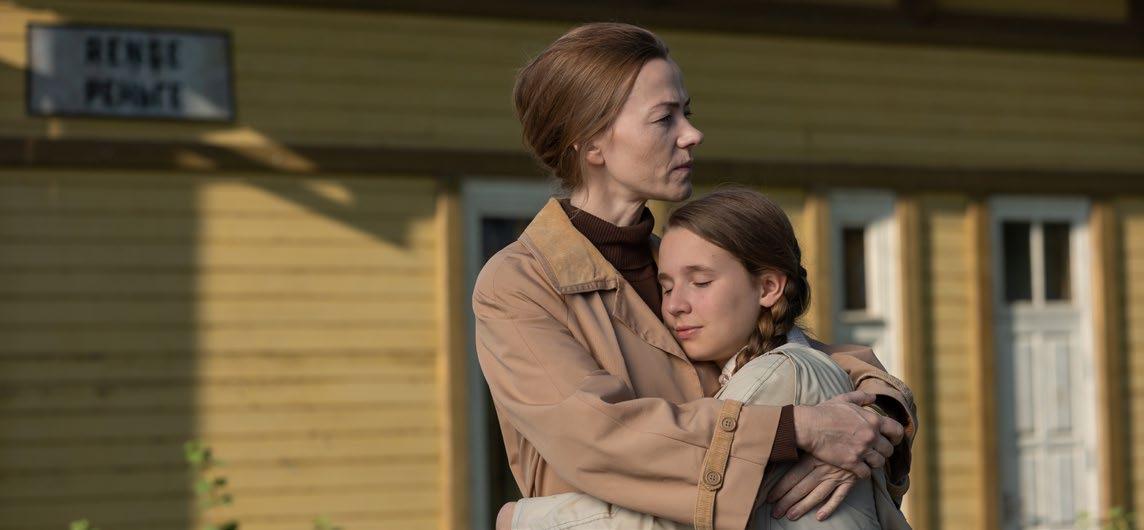
Producers: Jānis Juhņēvičs, Marta Romanova - Jēkabsone
Co-producers: Inga Alika-Stroda, Ilze Korjusa, Ņikita Kalašnikovs, Cloé Garbay, Bastien Sirodot
Co-production companies: Tet (LV), Umedia (BE), NK Aģentūra (LV)
Produced by: Film Studio Devini
To be released: February 2023
110 min DCP 2.39:1 5.1
Film Studio DEVIŅI
Marta Romanova-Jēkabsone
+371 2647 5178
devini@devini.lv , marta.rova@gmail.com
www.devini.lv, Facebook.com/SovietMilk
SALES
Eyewell AB
Michael Werner
+46 70 733 2855
sales@eyewell.se
www.eyewell.se
Migle got divorced 26 years ago. One day she gets a call with a strange request: in order to marry his new girlfriend, her ex-husband wants to get a divorce through the “Catholic court” the only institution that has the power to undo the bond of a Christian marriage. During the process of the court – a series of awkward and embarrassing meetings with several priests - Migle and her former husband find themselves getting closer to each other. Maybe even closer than they were during their marriage.
(born in 1993) finished his BA in Scriptwriting at Lithuanian Music and Theatre Academy, followed by an MA in Film Di-
recting. His short fiction film Snake (2018) the award for Most Promising Director in the student film competition of Vilnius Film Festival Kino Pavasaris. Second short film Family Unit (2019) won Best Short Film at Vilnius Film Festival Kino Pavasaris and National film award for best student film. Parade is his feature film debut.
Original title: Paradas
Genre: dramedy
Language: Lithuanian
Director: Titas Laucius
Screenwriter: Titas Laucius
Cinematographer: Laurynas Bareiša
Production Designer: Justė Vazgytė
Editor: Mikas Zukauskas
Composers: Justinas Važnevičius, Valdemaras
Ziezys, Danielius Pancerovas, Titas Laucius
Sound: Iveta Macevičiūtė
Main cast: Rasa Samuolytė, Giedrius Savickas, Valentin Novopolskij, Barbora Bareikytė, Asta Zacharovaitė

Producer: Klementina Remeikaitė
Produced by: afterschool production
Premiere: Tallinn Black Nights FF 2022, First feature competition

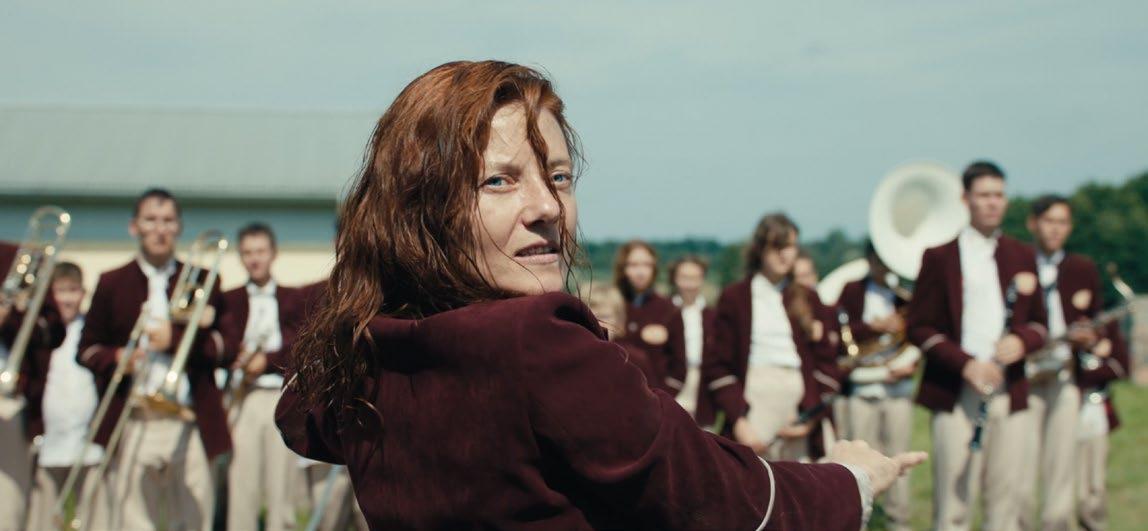
97 min DCP 2.39:1 5.1
Klementina Remeikaite
+370 6141 8571
klementina@aftschool.lt
Jacqueline – a woman who is obsessed with control – adopts two children from a foreign country with her husband. To help with translation, the kids are accompanied by Gabriele, a twenty-year old who is just starting to taste the sweetness of feeling power.

DIRECTOR AUSTEJA URBAITE
was born in 1991. She grew up surrounded by nature, in a small village near Vilnius,
Lithuania. In 2010, she began studying film directing at the Lithuanian Academy of Music and Theatre. Her student short film entitled The Etude (Etiudas, 2013) earned considerable attention, and was a prelude to her highly acclaimed debut short, The Bridges (Tiltai, 2015). Both of these movies received numerous nominations and awards on the film festival circuit. Remember to Blink (Per Arti, 2022) is Austeja’s first feature film.
Original title: Per Arti
Genre: drama
Languages: Lithuanian, French
Director: Austėja Urbaitė
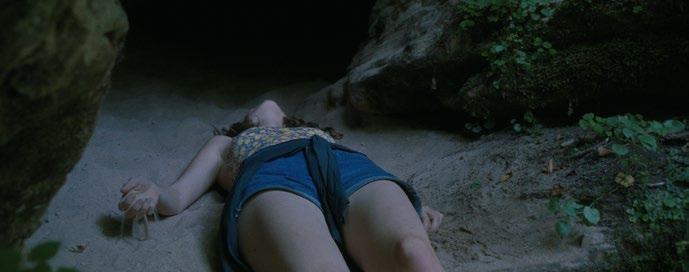
Screenwriter: Austėja Urbaitė
Cinematographer: Julius Sičiūnas
Production Designer: Justė Vazgytė
Editors: Gabrielė Urbonaitė, Austėja Urbaitė
Composer: Domas Strupinskas
Sound: Julius Grigelionis
Main cast: Anne Azoulay, Dovilė Kundrotaitė
Producer: Živilė Gallego
Produced by: Fralita Films
Premiere: Warsaw IFF 1-2 Competition,
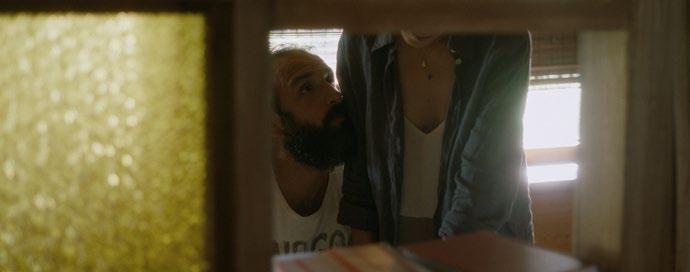
October 2022
Festivals: Tallinn Black Nights IFF Baltic Competition
109 min DCP 1.85:1 5.1
Fralita Films
Zivile Gallego
+370 6433 0022
zivile.gallego@fralita.com
www.fralitafilms.com
Soviet Lithuania, 1975. Against the backdrop of an industrial fishing boat, fishermen kiss their wives goodbye. They are going off to the sea to catch fish in the far Atlantic coasts of Africa. The boat is going to be their home for the upcoming five months. Eventhough the ship sails thousands miles away from the Iron Curtain, its shadow follows the men.

DIRECTOR RIMANTAS OICENKA
(b. 1987) has been working at the Vilnius International Film Festival “Kino pavasaris“ as film distribution manager for the past ten years. The Trip is his second short film.
Original title: Reisas
Genre: documentary
Theme: love, time, travel
Language: Lithuanian
Director: Rimantas Oičenka



Screenwriter: Rimantas Oičenka
Cinematographer: Linas Žiūra
Editor: Rimantas Oičenka
Composer: Vytautas Leistrumas
Sound: Sigitas Motoras
Producer: Jurga Kaye
Produced by: Studija Kinema
Festivals and awards: Warsaw IFF 2022
(Poland) – Jury Special Mention, Dingle Distillery IFF 2022 (Ireland) – Best International Short Film.
25 min DCP 1.85 5.1
Studija Kinema
Rimantas Oičenka +370 6268 2513
oosikas@gmail.com kinema.lt
Atalented poet who was expelled from the Lithuanian Soviet Writers’ Union for his anti-Soviet literature is recruited by the NKVD to establish contact with the partisans. In return he was promised a return to the elite of Soviet writers.
DIRECTOR GIEDRIUS TAMOŠEVICIUS
holds a bachelor and masters degrees in Film Directing at Lithuanian Academy of Music and Theater. As a director he created several short films during his years of study. After his studies, he worked for several years as an assistant to director Sergei Loznitsa on the films A Gentle Creature (2017), Donbass (2018) and Mr. Landsbergis (2021). He has worked on casting and directing non-professional actors.

DIRECTOR VYTAUTAS V. LANDSBERGIS studied film directing in Georgia, at the Rustavelis Institutetre in Tbilisi and with Jonas Mekas in New York, at the Anthology Film Archive. Since 1992 he has made two feature-length films and over twenty documentaries. Vytautas is interested in bright, contemporary and transformative personalities of Lithuanian culture and historical figures. In his spare time, he is involved in engaging young people in filmmaking.
Original title: Poetas
Genre: drama
Language: Lithuanian
Directors: Giedrius Tamoševičius, Vytautas V. Landsbergis
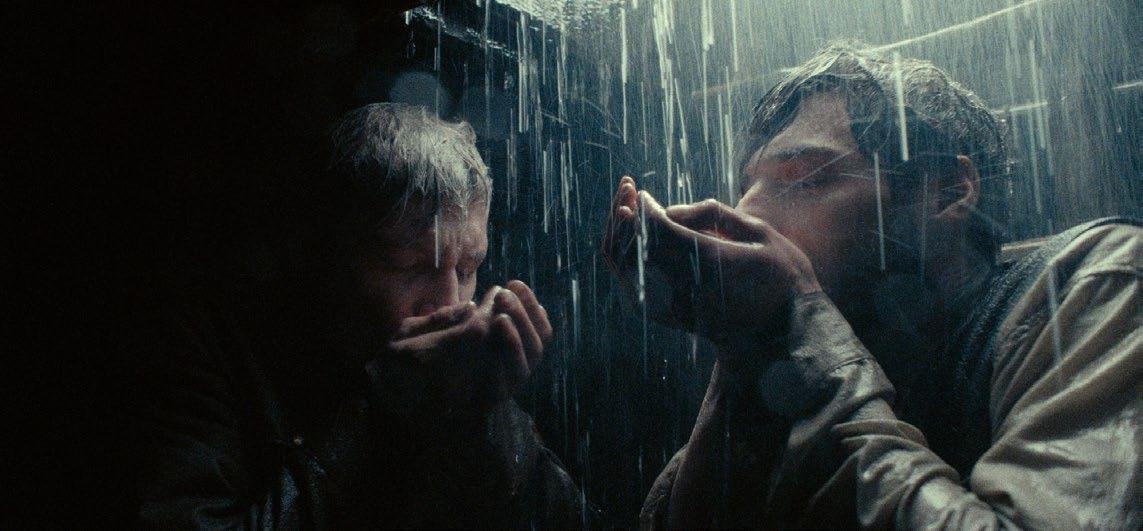
Screenwriters: Giedrius Tamoševičius, Vytautas V. Landsbergis
Cinematographer: Vytautas Plukas

Production Designer: Sigita Šimkūnaitė
Editor: Darius Šilėnas
Sound: Saulius Urbanavičius
Main cast: Donatas Želvys, Dainius Gavenonis, Indrė Patkauskaitė
Producers: Vytautas V. Landsbergis, Uljana Kim
Produced by: A Propos Studija, Studio Uljana Kim
International Premiere: Tallinn Black Nights
FF –Best Baltic Film, November 2022
113 min DCP 2.39:1 5.1
A Propos Studija
Osvaldas Bručas
+370 6227 7807
osvaldas.brucas@gmail.com
In the darkness of smoke sauna, women share their innermost secrets and intimate experiences. Through a sense of communion, women wash off the shame trapped in their bodies and regain their strength.
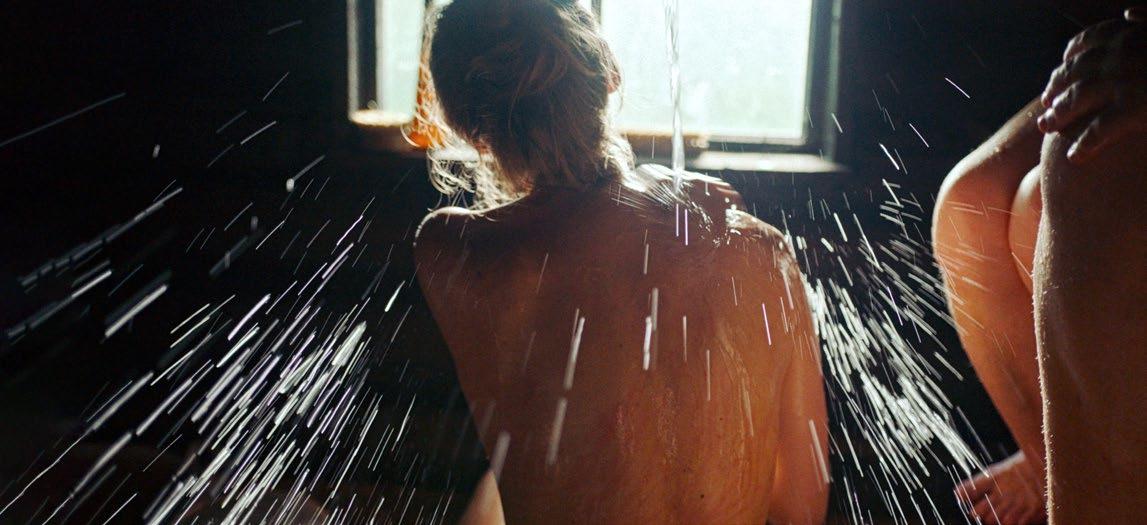
DIRECTOR ANNA HINTS
is an Estonian film director with a background in contemporary art and experimental folk music. Having deep roots in the distinct culture of South Estonia, Anna’s second home is in India. As an active dumpster diver, Anna’s short documentary For Tomorrow Paradise Arrives (2021) initiated public discussion and growth of new grassroot movements

against food waste in Estonia. Anna’s first feature documentary Smoke Sauna Sisterhood premiered at Sundance Film Festival World Cinema Documentary Competition program in January 2023. Anna’s next short fiction is Weight of Light (2023) that depicts the life of female rag pickers in Delhi. Anna is a singer in the electronic-folk trio Eeter that was nominated in the Best Film Music category at the Estonian Film and TV Awards 2018. Eeter collaborated with Icelandic composer Edvard Egilsson for the original score of Smoke Sauna Sisterhood Anna is currently doing Master’s Degree at the Department of Drama of the Estonian Academy of Music and Theatre.
Original title: Savvusanna sõsarad
Theme: women, healing, nature, heritage
Languages: Estonian, Seto, Võro
Director: Anna Hints
Screenwriter: Anna Hints
Cinematographer: Ants Tammik
Editors: Hendrik Mägar, Tushar Prakash, Qutaiba Barhamji, Martin Männik, Anna Hints
Composers: Eðvarð Egilsson & Eeter
Producer: Marianne Ostrat
Co-producers: Juliette Cazanave, Hlín Jóhannesdóttir, Eero Talvistu †
Produced by: Alexandra Film (EE), Kepler 22 Productions (FR), Ursus Parvus (IS)
World Premiere: Sundance Film Festival, January 2023
89 min DCP Flat 1.85 5.1
CONTACT
Alexandra Film
Marianne Ostrat
+372 523 3577
marianne@alexandrafilm.ee
www.alexandrafilm.ee
SALES
Autlook Filmsales
Salma Abdalla
welcome@autlookfilms.com
www.autlookfilms.com
Erik (11) is convinced he has a stone for a heart. That’s why he doesn’t mind that his parents have no time for him or that he has no real friends. When his family moves to a villa they inherited from aunt Brunhilda, he discovers another family living there – Maria (11) and her dad whom Erik’s parents want to kick out. When the family gets an eviction notice, Maria activates her secret plan to bring back her missing mother to save them. Together they end up on a fantastical journey to the In-BetweenWorld and Erik learns how hard it really is to wear a heart of stone.
born in 1968, is the writer and director of the most successful film ever made in Estonia – Class (2007), which was sold to 91 countries, was the Estonian candidate for Oscar nomination, won 25 awards from 70 festivals, and developed into a successful multi-awarded TV-series. Ilmar’s filmography include Une Estonienne à Paris
(Locarno FF, Estonia-France-Belgium, 2012), Kertu. Love Is Blind (Warszaw FF, 2013) and I Won’t Come Back (Tribeca FF, Nora Ephron Jury Special Mention, Estonia-Russia-Finland-Kazakhstan, 2014).

Ilmar has an MA in Screenwriting from Ohio University and worked as a professor of Liberal Arts in Tartu University.
Ilmar is also an acclaimed columnist in the biggest dailies, lecturer and a requested media consultant.
Original title: Erik Kivisüda
Genre: fantasy adventure
Language: Estonian
Director: Ilmar Raag
Screenwriters: Andris Feldmanis, Livia Ulman
Cinematographers: Tuomo Hutri F.S.C., Ivar Taim E.S.C.
Production Designer: Kari Kankaanpää

Editor: Felix Sorger
Composers: Kipras Masanauskas, Renars Kaupers (title song)
Sound: Vladimir Golovnitski
Main cast: Herman Avandi, Florin Gussak, Juhan Ulfsak, Laura PetersonAardam, Renars Kaupers, Jules Werner, Norbert Rutili, Nickel Bösenberg

Producers: Riina Sildos, Paul Thiltges, Adrien Chef
Co-producers: Uljana Kim, Vitaliy Sheremetiev, Roberts Vinovskis, Aleksi Bardy, Helen Vinogradov
Produced by: Amrion Production (EE), Paul Thiltges Distributions (LU), Uljana Kim Studios (LT), Esse Production House (UA), Locomotive Studios (LV), Helsinki-filmi Oy (FI)
World Premiere: International Young Audience Film Festival ALE Kino!, October 2022

Festivals: CinEast Film Festival, Youth and Children’s Film Festival Just Film
105 min DCP 2.39:1 5.1
CONTACT
Amrion Production
Riina Sildos
+372 504 8985
riina.sildos@amrion.ee
amrion.ee
SALES
Pink Parrot Media
Tania Pinto da Cunha
+34 62 945 9075
tania@pinkparrotmedia.ca
pinkparrotmedia.ca
When Jon’s mother dies, the single most dominant person in his life passes away, his anchor is gone. Compelled to honour her last wish, he takes on a journey to bring the body across Iceland to her home village for the final rest. As they travel on, Jon’s whole existence obtains a new meaning.
DIRECTOR HILMAR ODDSSON
graduated directing from Munich’s Hochschule für Fernsehen und Film in 1985. After returning home, he made his first feature, the psychological thriller The Beasts (1986), for which he also wrote the script and music. He has also directed TV-dramas and short movies. Driving Mum is his seventh full-length feature.
Selected Filmography: The Beasts (1986), Tears of Stone (1995), No Trace (1998), God exists, and so does love (1999), Cold Light (2004), December (2009), Driving Mum (2022)
Original title: Á Ferð með Mömmu / Teekond emaga
Genre: comedy, drama, road movie
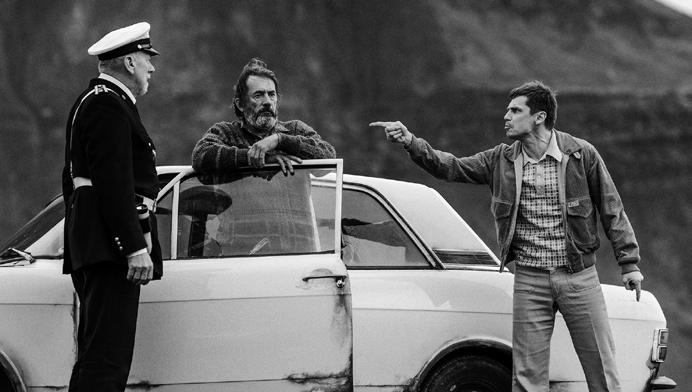
Languages: Icelandic, French
Director: Hilmar Oddsson
Screenwriter: Hilmar Oddsson
Cinematographer: Óttar Guðnason
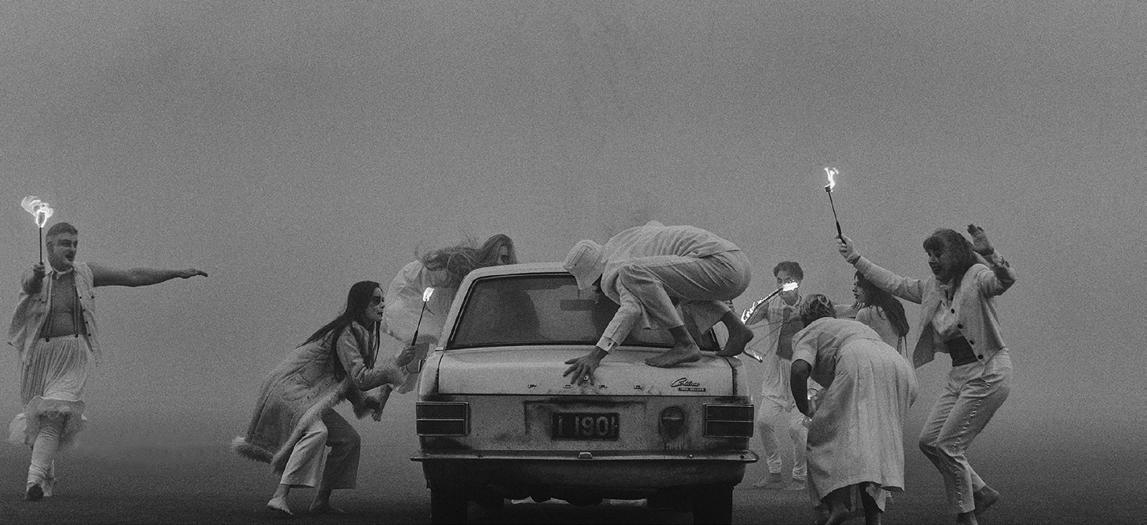
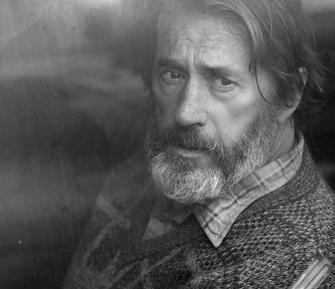
Production Designer: Drifa Freyju
Armannsdottir
Editor: Hendrik Mägar
Composer: Tõnu Kõrvits
Sound design: Matis Rei
Main cast: Þröstur Leó Gunnarsson, Kristbjörg Kjeld, Hera Hilmar, Tómas Lemarquis, Arnmundur Ernst Björnsson, Pálmi Gestsson
Producer: Hlín Jóhannesdóttir
Co-producers: Marianne Ostrat, Thor S. Sigurjónsson, Arnar Benjamín Kristjánsson
Produced by: Ursus Parvus (IS), Alexandra Film (EE)
World Premiere: Tallinn Black Nights Film Festival, November 2022
Festivals: Göteborg Film Festival, Glasgow Film Festival 2023
112 min DCP 1.85:1 5.1
CONTACT
Ursus Parvus
Hlín Jóhannesdóttir
hlin@ursusparvus.com
www.ursusparvus.com
SALES
Alief LLC Miguel Angel Gove miguel@alief.co.uk www.alief.co.uk
Minsk, August 2020. Pasha and Yulia, a young married couple, leave the house at night and find themselves in the midst of the protests of the civilian population, which came out against the unfair presidential elections. Their walk turns into a hell, in which innocent people become victims of police brutality. During the 1,5 hours, the young couple’s life changes completely. The film was shot in a single take, without any cuts.
Graduated from the High Courses of Scriptwriters and Film Directors (VKSR) in 2012. Boris is known in Russia as an experimental filmmaker, a social activist who reveals the acute topics of society: poverty, racism, homophobia, AIDS.
Filmography: Watermelon Rings (2016), Fagotto (2018), We Look Good in Death (2019), Minsk (2022), Deaf Lovers (2022)
Original title: Minsk
Genre: drama
Language: Russian
Director: Boris Guts
Screenwriter: Boris Guts
Cinematographer: Daria Likhacheva
Production Designer: Johannes Valdma
Sound: Indrek Soe
Main cast: Anastasia Shemyakina, Aleksey Maslodudov
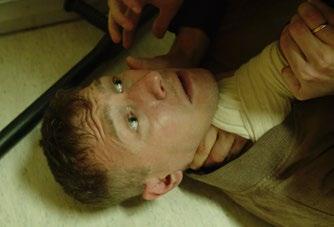
Producers: Katerina Monastyrskaya, Boris Guts, Vitali Shkliarov, Anastasia Gusentsova, Andres Puustusmaa
Produced by: Leo Films
International premiere: Cottbus Film Festival, 2022
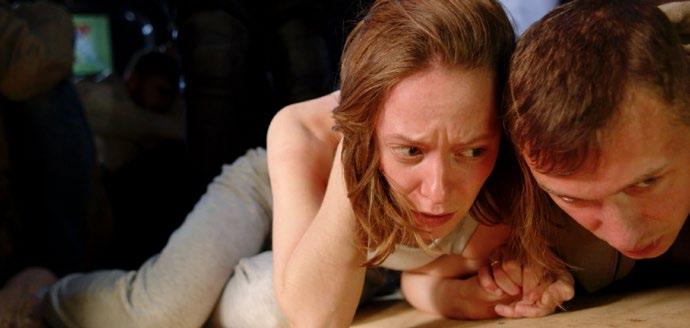
Festivals: Film Festival Diritti Umani Lugano, Tallinn Black Nights Film Festival
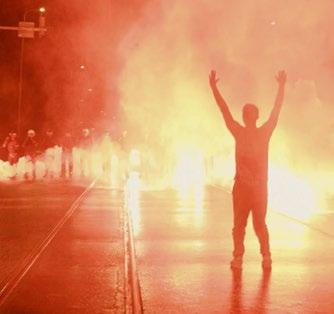
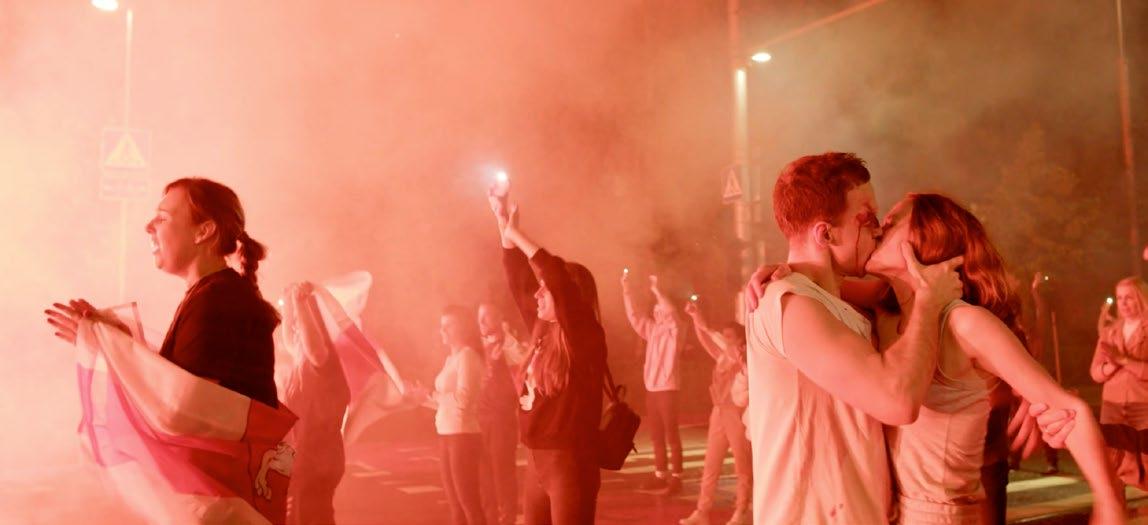
81 min 2.39:1 5.1
CONTACT
Leo Films
Katerina Monastyrskaya +372 5901 9292
katimons@gmail.com
leo-films.eu
SALES
WIDE Management
Marco Urizzi
mu@eyeonfilms.org
FESTIVALS
Matthias Angoulvant
ma@widemanagement.com
Set in the future on a war-ravaged Earth, four soldiers man Sentinel – a remote military base in a vast ocean that separates two warring continents. They await the relief or the enemy, whichever comes first. But as the empty weeks turn to months, a paranoia descends testing relationships to breaking point.
Whilst their tour of duty ended three months ago, the relief crew still hasn’t shown up. Alone and uncertain as to their fate, the simmering tension amongst the crew only escalates when a mysterious boat drifts into range – is it the help they have been waiting so long for, or something far more sinister?
was born on 1982 in Tallinn, Estonia, Tanel first studied filmmaking at the Tallinn University, graduating with a BA in 2005.
His fourth short film The Second Coming premiered at the Venice Film Festival in 2008. The same year, he decided to continue his studies at the National Film and TV School in England. He graduated from the NFTS with a MA in 2010. His diploma film The Confession won the Student Academy Award® for Honorary Foreign Film and a year later was nominated for an Oscar® for Best Live Action Short Film. His first feature film Truth and Justice premiered in 2019, breaking all the box office records in Estonia and became the most watched film in the country. It was Estonia’s submission for the 2020 Academy Awards, making it to the shortlist in Best International Film category. The film was praised for its performances and visuals and won the Best International Motion Picture at the Satellite Awards 2020. Tanel was chosen by Variety as one of the “10 Europeans to Watch”, 2020.
Original title: Last Sentinel
Genre: sci-fi thriller
Language: English
Director: Tanel Toom
Screenwriter: Malachi Smyth
Cinematographer: Mart Ratassepp E.S.C.
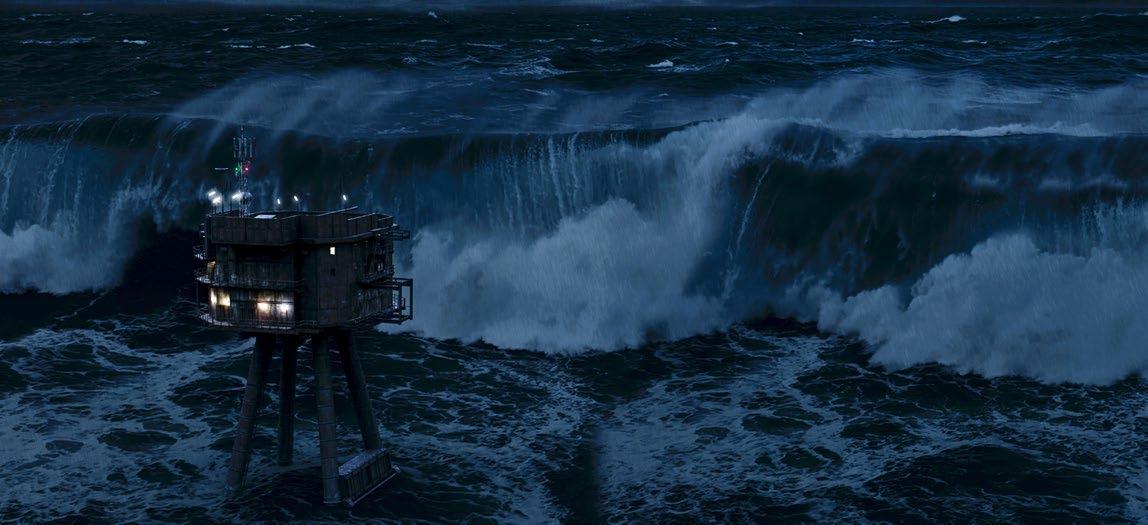
Production Designer: Kaia Tungal
Editor: Tambet Tasuja
Composer: Gert Wilden Jr.
Sound: Matis Rei
Main cast: Kate Bosworth, Thomas Kretschmann, Lucien Laviscount, Martin McCann

Producers: Ben Pullen, Ivo Felt, Jörg Bundschuh, Pippa Cross, Matt Wilkinson
Produced by: Allfilm (EE), Kick Film (DE), Sentinel Entertainment (GB)
To be released: 2023
112 min DCP 2.39:1 5.1
Allfilm
Ivo Felt ivo@allfilm.ee allfilm.ee
SALES
Altitude Film Sales +44 20 7478 7612 info@altitudefilment.com altitudefilment.com
